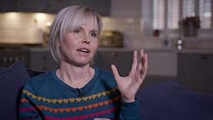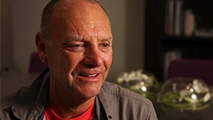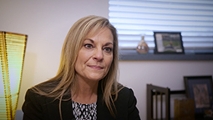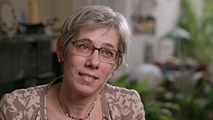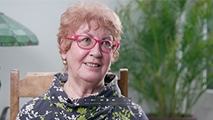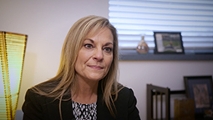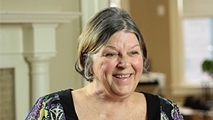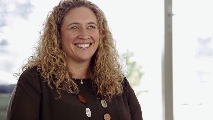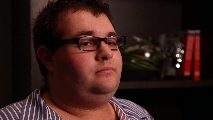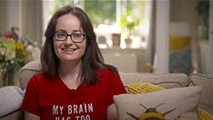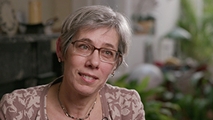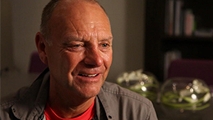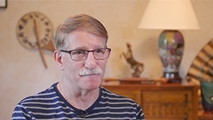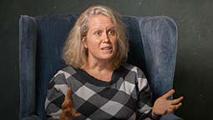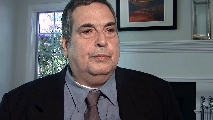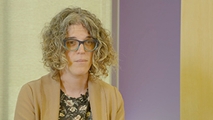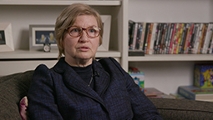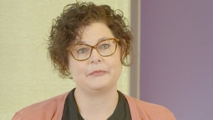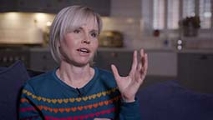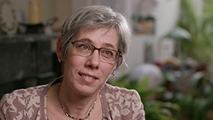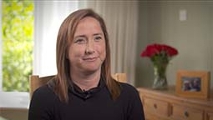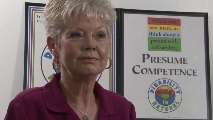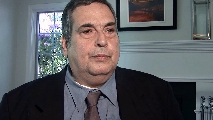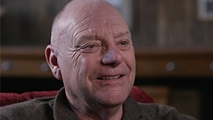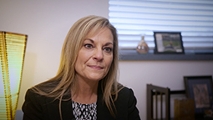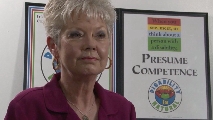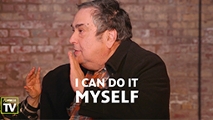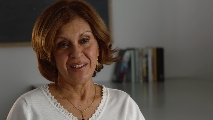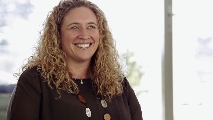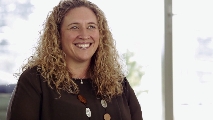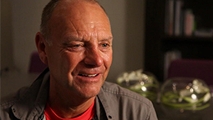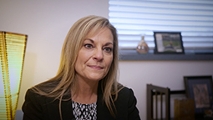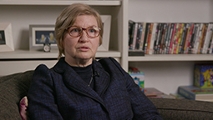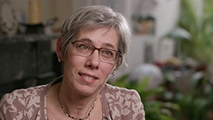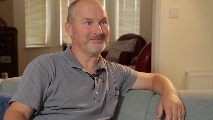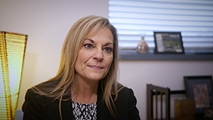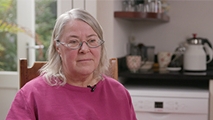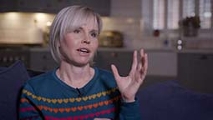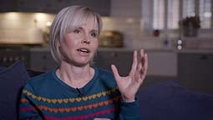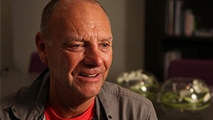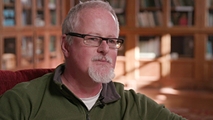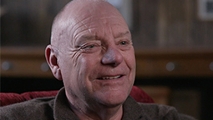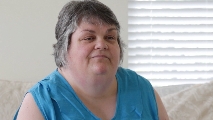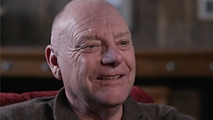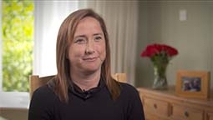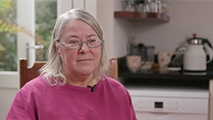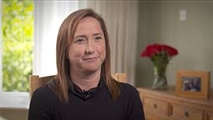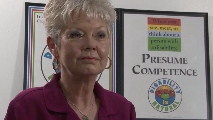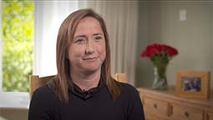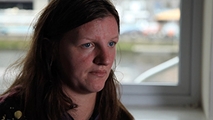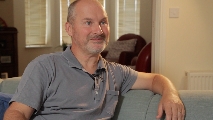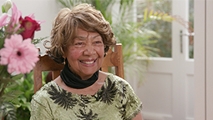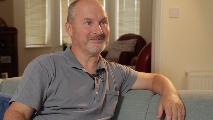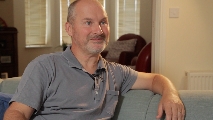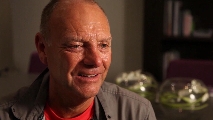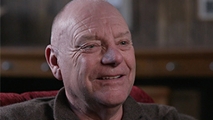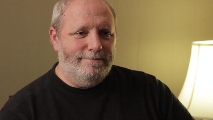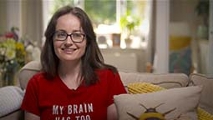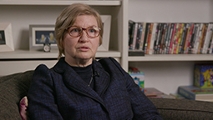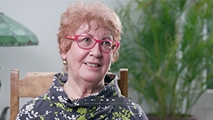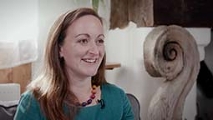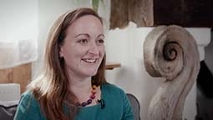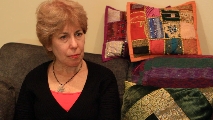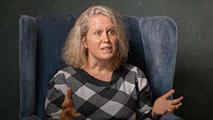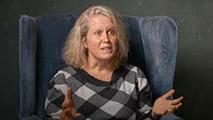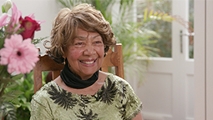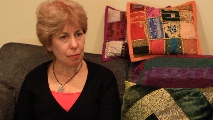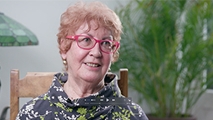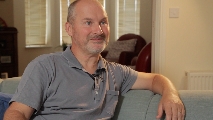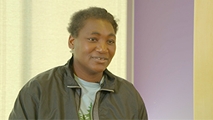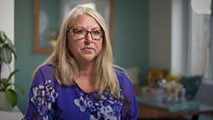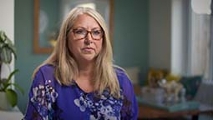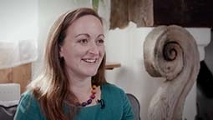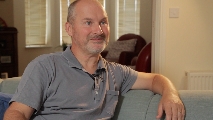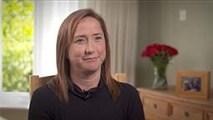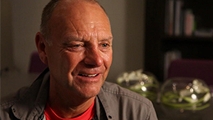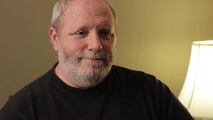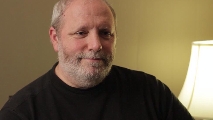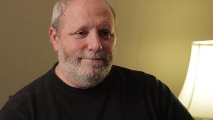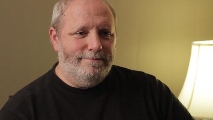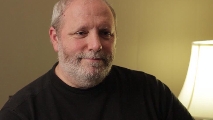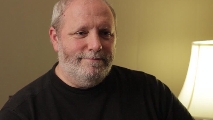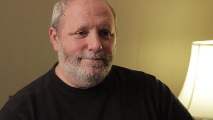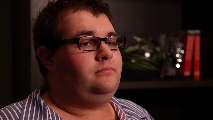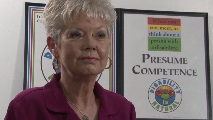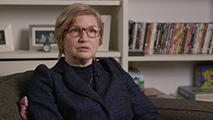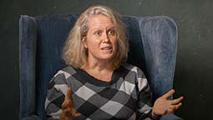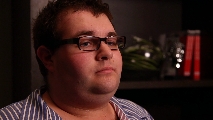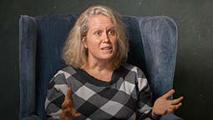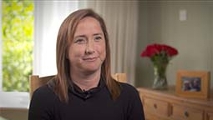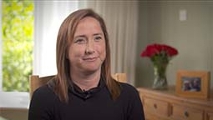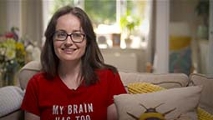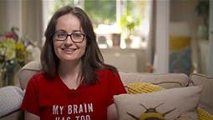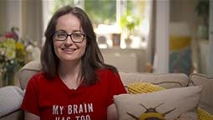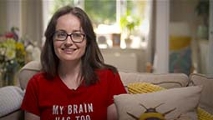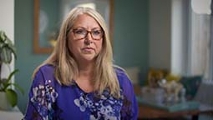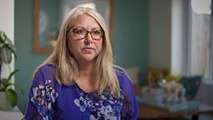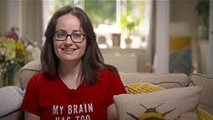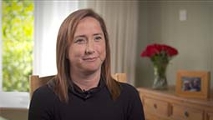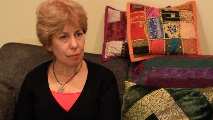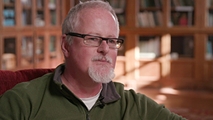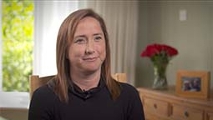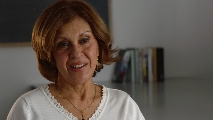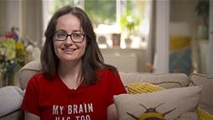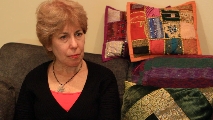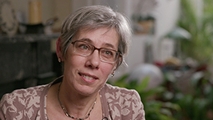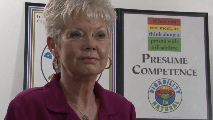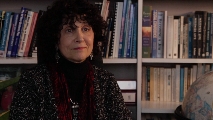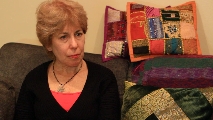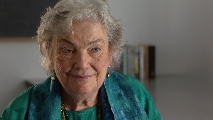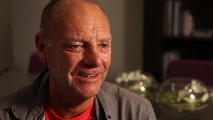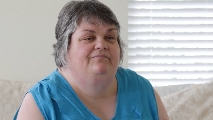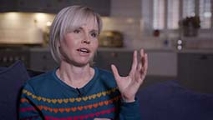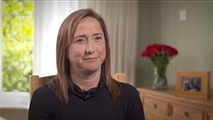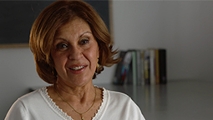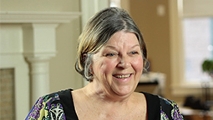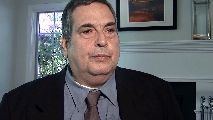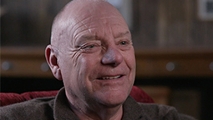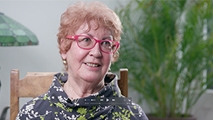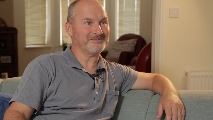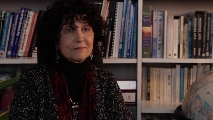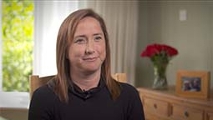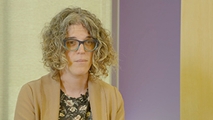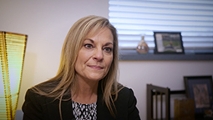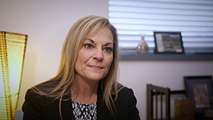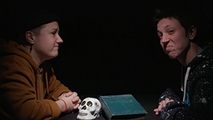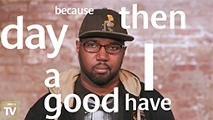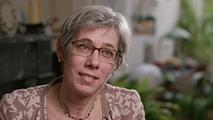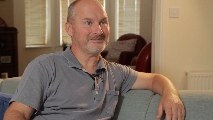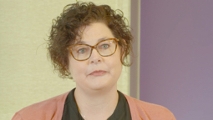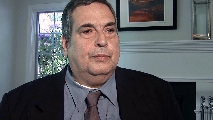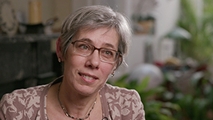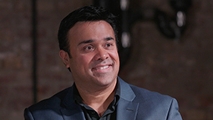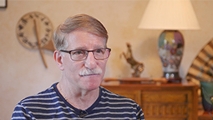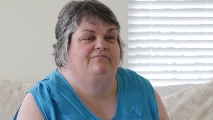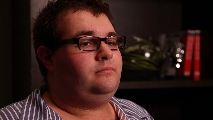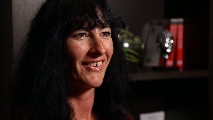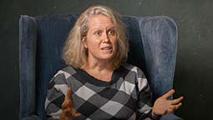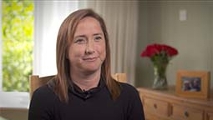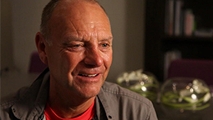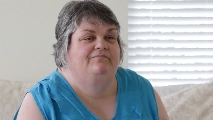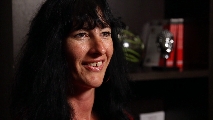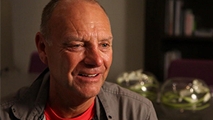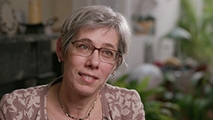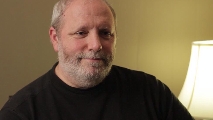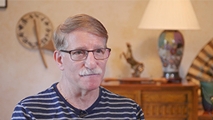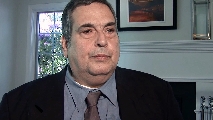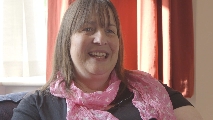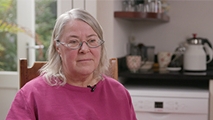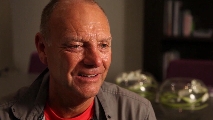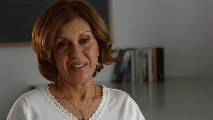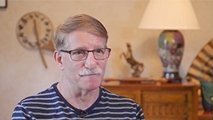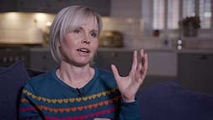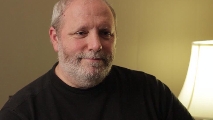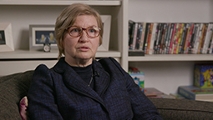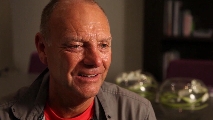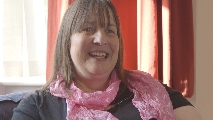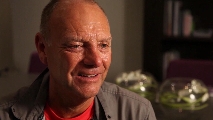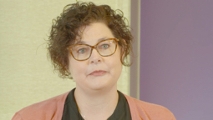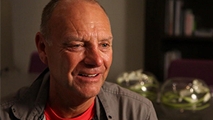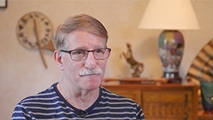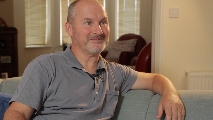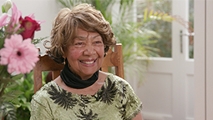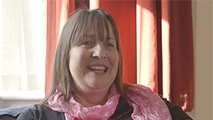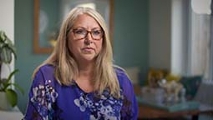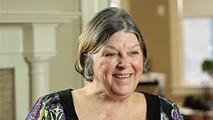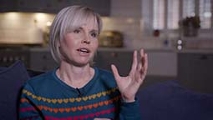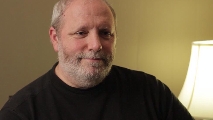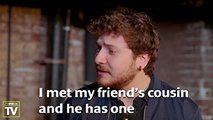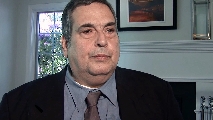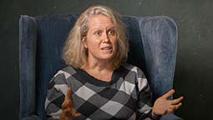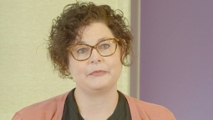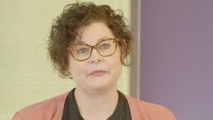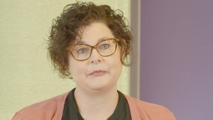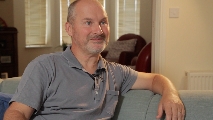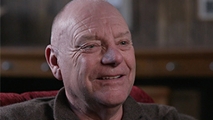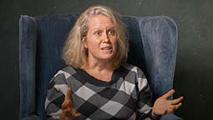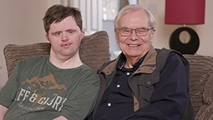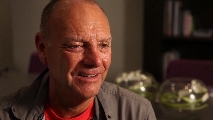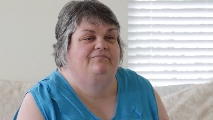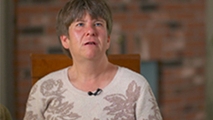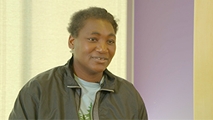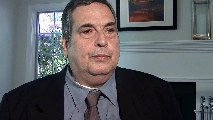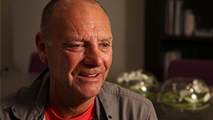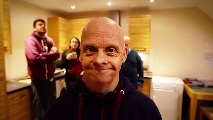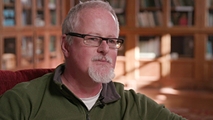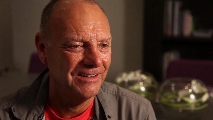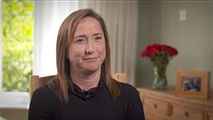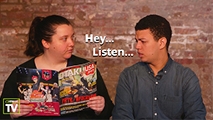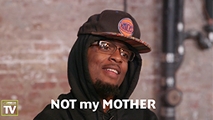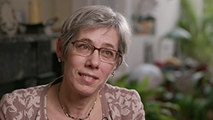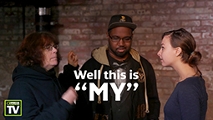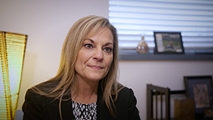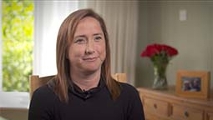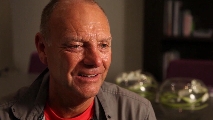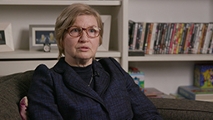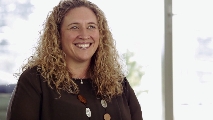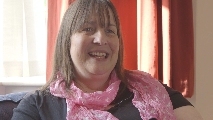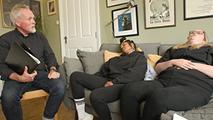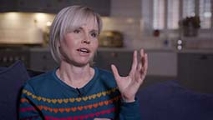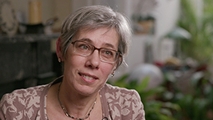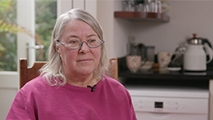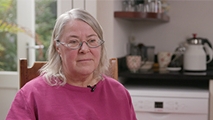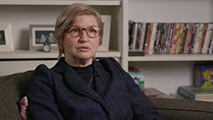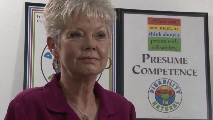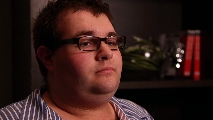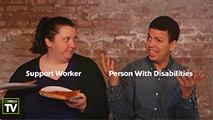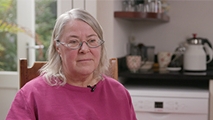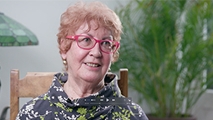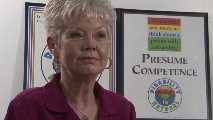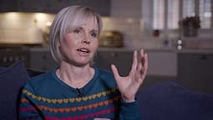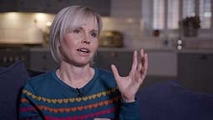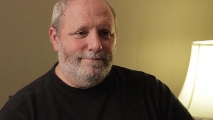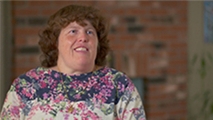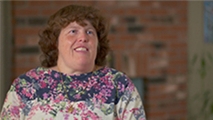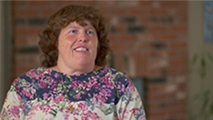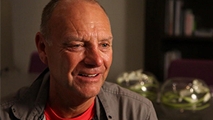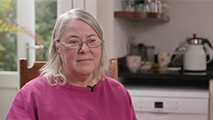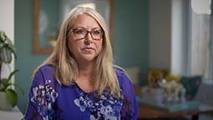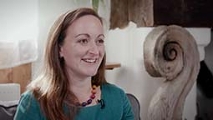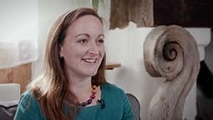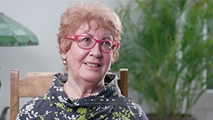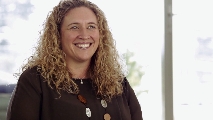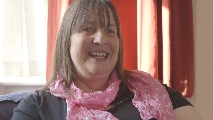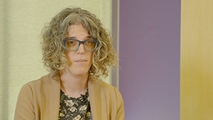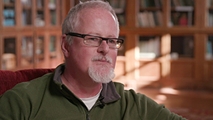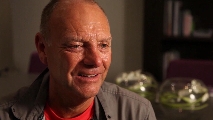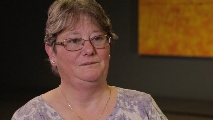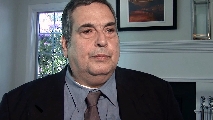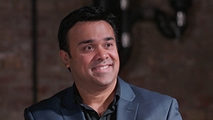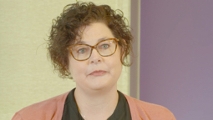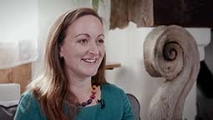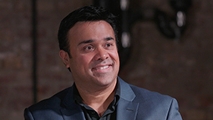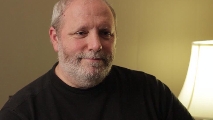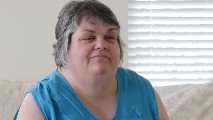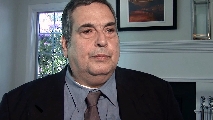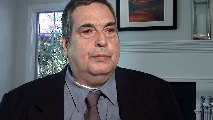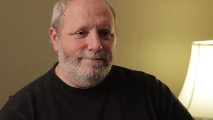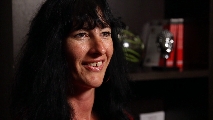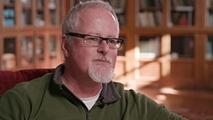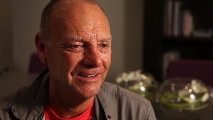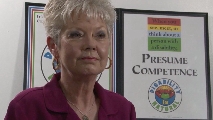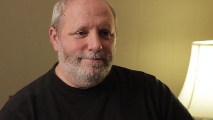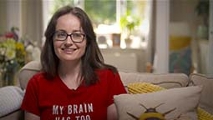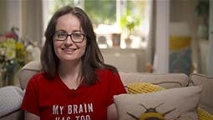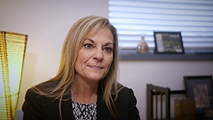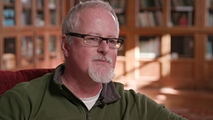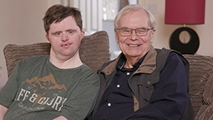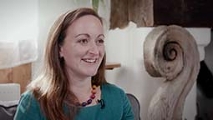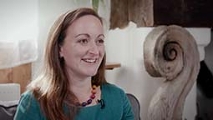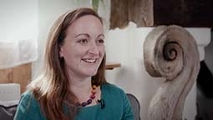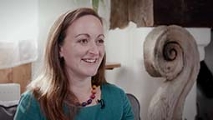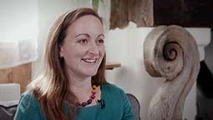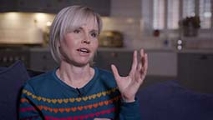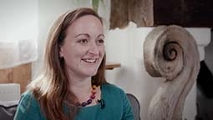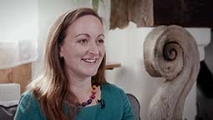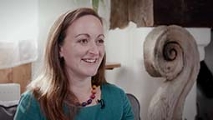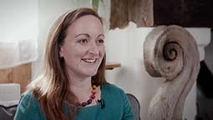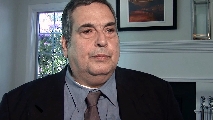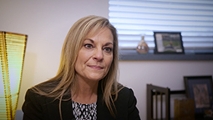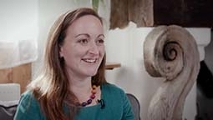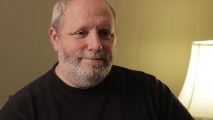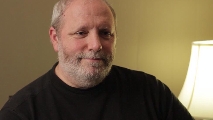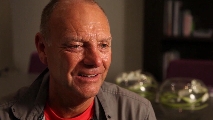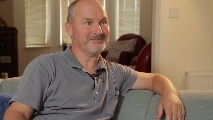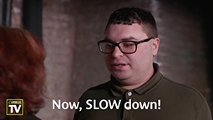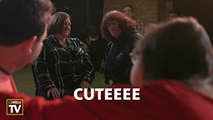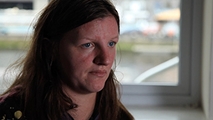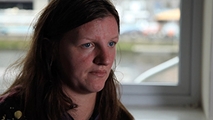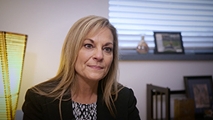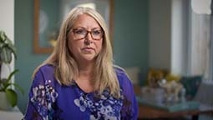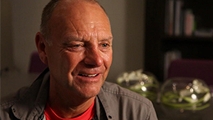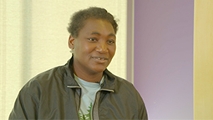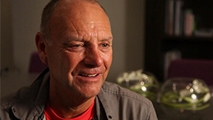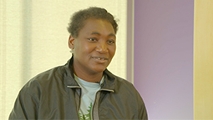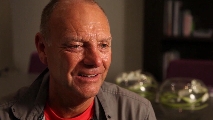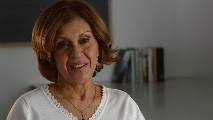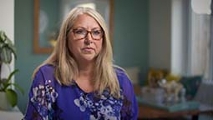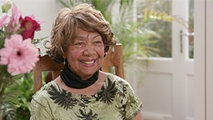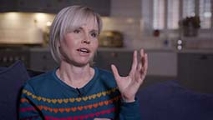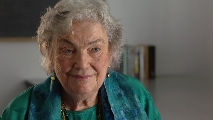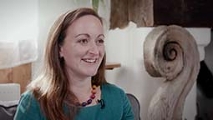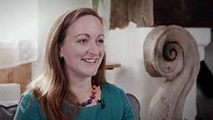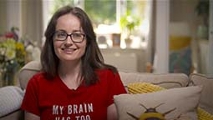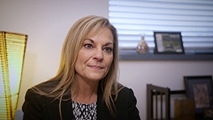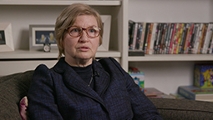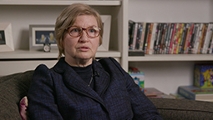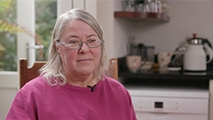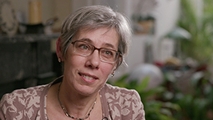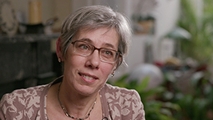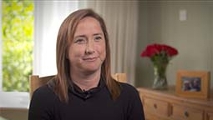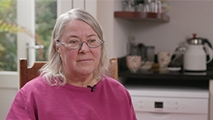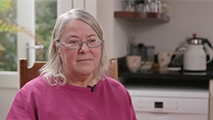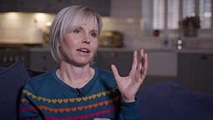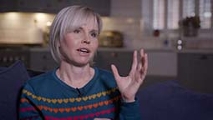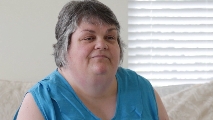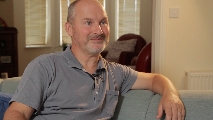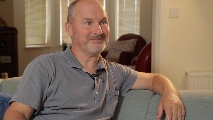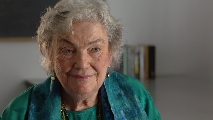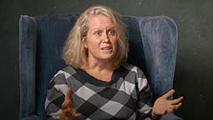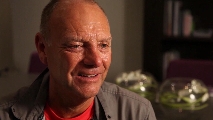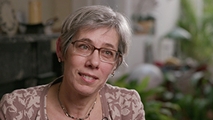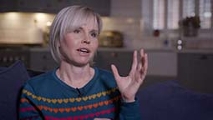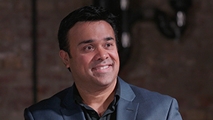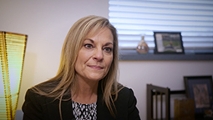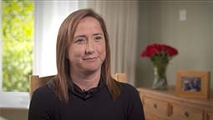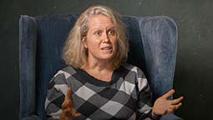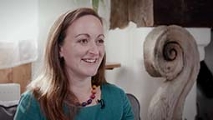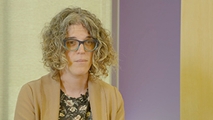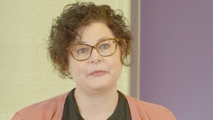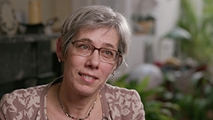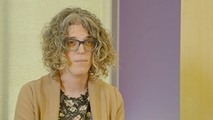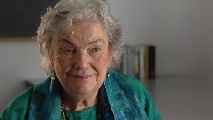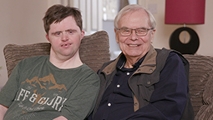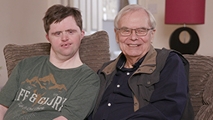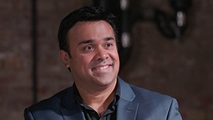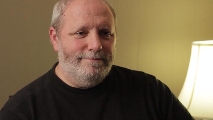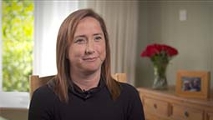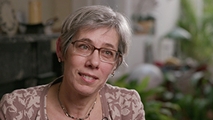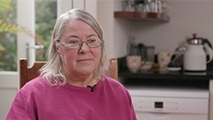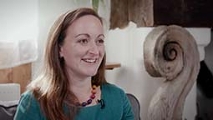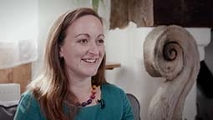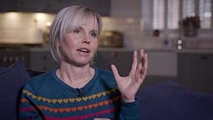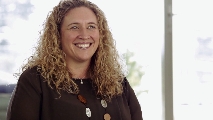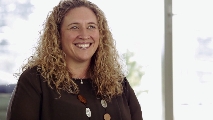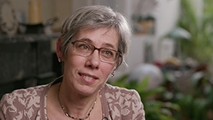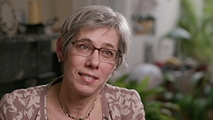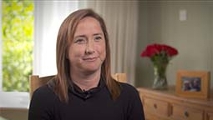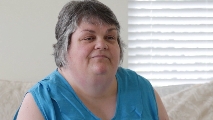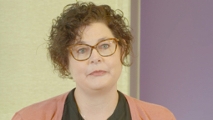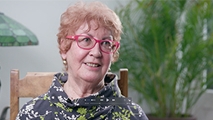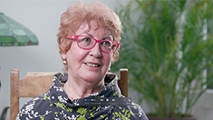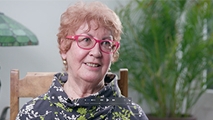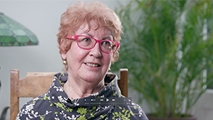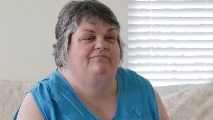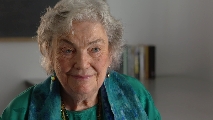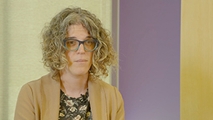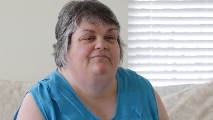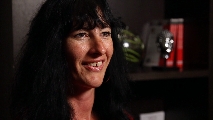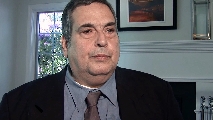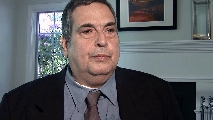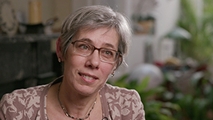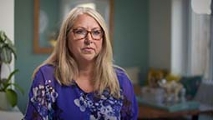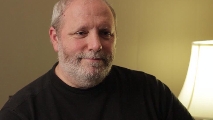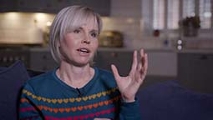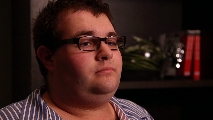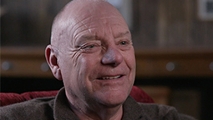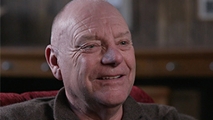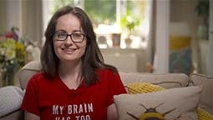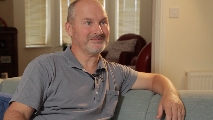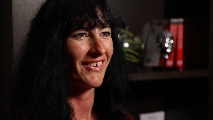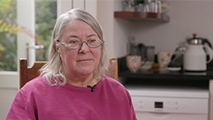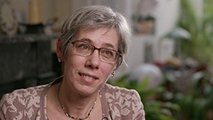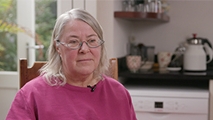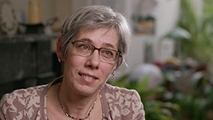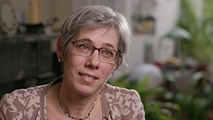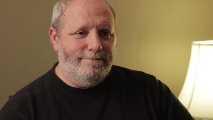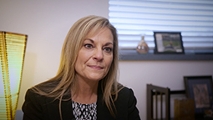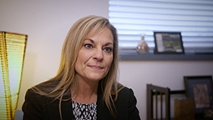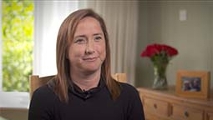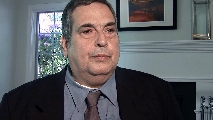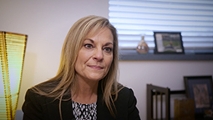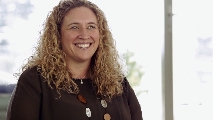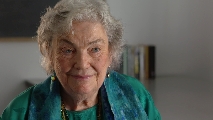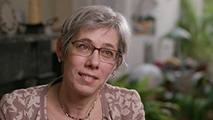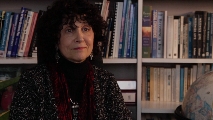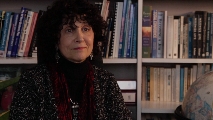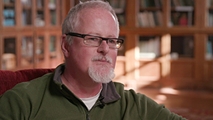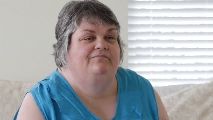VIDEOS ON DEMAND SEARCH: 1491 Videos
LIST
Presenter: Sarah Clayton
About This Video:
Sarah Clayton discusses the difficulties associated with providing 24-hour postural care along with the importance of nighttime care.
Subjects Covered:
- Profound and Multiple Intellectual Disabilities
- Postural Care
Length: 2 minutes
Presenter: Peter Leidy
About This Video:
Peter Leidy sings 3 Days a Week about a person wanting a little more than an outing and a van ride three times a week.
Subjects Covered:
- Good Support
- Person-Centered Approaches and Thinking
- Person-Centered Planning
- Rights
- Self-Determination
- Valued Social Roles
Length: 2 minutes
Presenter: Janis Swindlehurst
About This Video:
Janis Swindlehurst tells a story that demonstrates the need to use the experience and knowledge that parents have acquired.
Subjects Covered:
- Good Support
- Families
Length: 2 minutes
Presenter: Diana Kerr
About This Video:
Diana Kerr explains that people with dementia lose the ability to see things in 3D and the consequences that this may have for them.
Subjects Covered:
- Dementia
Length: 4 minutes
Presenter: Other
About This Video:
John shows us how to respect someone's wants and wishes in a balanced relationship.
Subjects Covered:
- Advocacy
- Friendships and Community
- Sexuality and Relationships
Length: 1 minute
Presenter: Gary Kent
About This Video:
Gary Kent tells a story that illustrates the importance in truly getting to know the person you support rather than relying solely on the plan that has been set up for them.
Subjects Covered:
- Good Support
- Person-Centered Approaches and Thinking
- Person-Centered Planning
Length: 3 minutes
Presenter: Other
About This Video:
This film takes a fun look at some of the interactions that that people with intellectual and developmental disabilities experience in the community.
Subjects Covered:
- Choice and Control
- Communication
- Friendships and Community
- Good Support
Length: 4 minutes
Presenter: Nancy Shea
About This Video:
Nancy Shea explains how she changed her approach to holding team meetings by making them more person-centered and using them as a skill building function.
Subjects Covered:
- Leadership
Length: 3 minutes
Presenter: Gina Brelesky
About This Video:
Gina Brelesky explains that sometimes you need to see things from a different perspective to be able to move forward in a situation.
Subjects Covered:
- Leadership
Length: 2 minutes
Presenter: Other
About This Video:
Ally Cox discusses a time when she went into a conversation with a staff member thinking it would be an easy, straightforward task, but turned into a difficult conversation.
Subjects Covered:
- Leadership
Length: 2 minutes
Presenter: Bob Fleischner
About This Video:
Bob Fleischner explains how supported decision making is a global concept being utilized by various countries and cultures.
Subjects Covered:
- Supported Decision Making
Length: 3 minutes
Presenter: Irene Tuffrey-Wijne
About This Video:
Irene Tuffrey-Wijne explains that although challenging, providing end of life care can also be a privilege that can lead to feelings of happiness and satisfaction for years to come, knowing that you did the person you support proud.
Subjects Covered:
- End of Life Care
Length: 2 minutes
Presenter: Other
About This Video:
Jene explains how having a proper funeral, one that the person who has died would have wanted, can help the bereavement process, because it gives family, friends, and support workers the opportunity to say a proper goodbye.
Subjects Covered:
- End of Life Care
Length: 4 minutes
Presenter: Other
About This Video:
Fionn and Jonathan explain how Fionn’s life is very similar to other people’s his age, but also, how in many ways, his life is better than most.
Subjects Covered:
- Down syndrome
Length: 2 minutes
Presenter: Gina Brelesky
About This Video:
Gina Brelesky talks about how all people have different perspectives and how this translates into people having a different idea of what a difficult conversation is.
Subjects Covered:
- Leadership
Length: 1 minute
Presenter: Dave Hewett
About This Video:
Dave Hewitt explains why the word naturalistic is often used to describe intensive interaction.
Subjects Covered:
- Intensive Interaction
Length: 2 minutes
Presenter: Other
About This Video:
Malia describes the challenges she faces in her roles as both parent and as a member of Cory's supported decision-making team.
Subjects Covered:
- Supported Decision Making
Length: 3 minutes
Presenter: Nancy Shea
About This Video:
Nancy Shea discusses how making a team meeting person-centered is more beneficial for the members instead of only the team leader running the meeting.
Subjects Covered:
- Leadership
Length: 2 minutes
Presenter: Beth Mount
About This Video:
Beth Mount explains that it is often those with the most challenging or profound needs who derive the most benefit from the personal attention that person-centered work brings.
Subjects Covered:
- Challenging Behavior
- Person-Centered Planning
- Rights
Length: 2 minutes
Presenter: Other
About This Video:
Tyrone Towers talks about his experiences of his own circle to explain what makes a positive and constructive circle of support.
Subjects Covered:
- Good Support
- Person-Centered Approaches and Thinking
- Person-Centered Planning
Length: 1 minute
Presenter: John Raffaele
About This Video:
John Raffaele shares a beautiful story to explain that a support relationship can be rooted in love, providing the head and the heart are in balance. John explains how the staff were able to ensure that a lady they supported had a proper eulogy and burial when it did not look like this would be the case.
Subjects Covered:
- Good Support
- End of Life Care
Length: 5 minutes
Presenter: Karyn Harvey
About This Video:
Karyn Harvey explains how everyone needs a sense of achievement to feel good about themselves and feel happiness.
Subjects Covered:
- Advocacy
- Trauma Informed Care
Length: 3 minutes
Presenter: Nancy Shea
About This Video:
Nancy Shea explains the importance of making an agenda prior to the team meeting, particularly with the use of technology, helps prepare the team members to have a more productive meeting.
Subjects Covered:
- Leadership
Length: 3 minutes
Presenter: Kate Fulton
About This Video:
Kate Fulton explores that to work alongside people and families in a meaningful and respectful way requires a significant shift in expertise.
Subjects Covered:
- Good Support
- Working on the Inside
Length: 3 minutes
Presenter: David Pitonyak
About This Video:
This film is taken from the module 'Jumping Into the Chaos of Things.' David Pitonyak explains why it is a natural response for the people we support to form strong feelings towards particular staff members.
Subjects Covered:
- Challenging Behavior
Length: 2 minutes
Presenter: Karyn Harvey
About This Video:
Karyn Harvey shares a story about a young man whose post traumas affects his behavior in present day.
Subjects Covered:
- Challenging Behavior
- Trauma Informed Care
Length: 7 minutes
Presenter: Gina Brelesky
About This Video:
Gina Brelesky speaks about her personal experience of working for a supervisor who took time out to encourage her. This helped her in the way she supervises and supports team members that work for her.
Subjects Covered:
- Leadership
Length: 1 minute
Presenter: Other
About This Video:
Jaymie Estevez speaks about how her team originally was not getting the most out of their meetings. However, the team collaborated and came up with a way to address everyone’s concerns and how to follow up with them.
Subjects Covered:
- Leadership
Length: 3 minutes
Presenter: Nancy Shea
About This Video:
Nancy Shea shares her story of how she was put into a leadership role to help unify a team and build morale. She explains how getting to know each team member individually can help bring positivity to the team meetings.
Subjects Covered:
- Leadership
Length: 5 minutes
Presenter: Nancy Shea
About This Video:
Nancy Shea discusses how the way a challenge is presented to a team can result in them still feeling that they have a sense of control and ready to handle it.
Subjects Covered:
- Leadership
Length: 3 minutes
Presenter: Other
About This Video:
Aimee tells us that though she has Down Syndrome, she loves being alive!
Subjects Covered:
- Self-Esteem
Length: 1 minute
Presenter: Steve Dymond
About This Video:
Steve Dymond talks about what friendship means to him and why it is important.
Subjects Covered:
- Friendships and Community
Length: 1 minute
Presenter: Bernard Carabello
About This Video:
Bernard Carabello talks about the horrific levels of abuse that he and other people endured living at Willowbrook State School.
Subjects Covered:
- Abuse Prevention
- Good Support
- Rights
Length: 1 minute
Presenter: Other
About This Video:
Isaac explains why support staff should learn with the people they support, by using the Open Future Learning Side by Side Modules.
Subjects Covered:
- Abuse Prevention
- Social Media Videos
Length: 1 minute
Presenter: Karyn Harvey
About This Video:
In this video, Karyn Harvey explains the various types of abuse and its prevalence in the field we work in.
Subjects Covered:
- Abuse Prevention
- Trauma Informed Care
- Challenging Behavior
Length: 2 minutes
Presenter: Myles Himmelreich
About This Video:
Myles Himmelreich explains the need to understand and accept what a person who has FASD cannot do.
Subjects Covered:
- Fetal Alcohol Spectrum Disorders (FASD)
Length: 3 minutes
Presenter: Other
About This Video:
Isaac and Marcus explain why acronyms and disability jargon are not needed.
Subjects Covered:
- Social Media Videos
Length: 1 minute
Presenter: Michael Kendrick
About This Video:
Michael Kendrick explains a time when a parent acts on her son's wishes in an unconventional, yet successful way.
Subjects Covered:
- Supported Decision Making
Length: 3 minutes
Presenter: Margaret Cushen
About This Video:
Margaret Cushen introduces the concept of active support. Active support is a person-centered approach that aims to build the relationship you have with the person you support, by supporting inclusion and control.
Subjects Covered:
- Choice and Control
- Good Support
- Person-Centered Approaches and Thinking
Length: 2 minutes
Presenter: Margaret Cushen
About This Video:
Margaret Cushen explains how active support is based around the person's needs.
Subjects Covered:
- Active Support
- Good Support
Length: 3 minutes
Presenter: Julie Beadle-Brown
About This Video:
Julie Beadle-Brown tells a story that highlights the importance of active support and being actively engaged in activities.
Subjects Covered:
- Active Support
Length: 3 minutes
Presenter: Margaret Cushen
About This Video:
Margaret Cushen explains how participating in activities can build our sense of belonging in our community.
Subjects Covered:
- Friendships and Community
- Good Support
Length: 2 minutes
Presenter: Other
About This Video:
Marvin George explains how he helped find a way for an employee to adapt with a company whose needs were changing.
Subjects Covered:
- Employment
Length: 7 minutes
Presenter: Other
About This Video:
Rita Arnett explains that you have to adapt to the way you support someone as they age – you can’t expect to change the person, so you need to change yourself or the environment.
Subjects Covered:
- Aging
- Growing Older
Length: 4 minutes
Presenter: Other
About This Video:
A mother, Malia, explains a time when a very difficult, but necessary, decision had to be made.
Subjects Covered:
- Supported Decision Making
Length: 1 minute
Presenter: Other
About This Video:
Erica Streisslberger explains how important it is for support workers to understand the specific disability of the person they support in order to understand and support them more accurately.
Subjects Covered:
- Mental Health
Length: 3 minutes
Presenter: Margaret Cushen
About This Video:
Margaret Cushen talks about what advocacy is not, and also reviews some different conflicts of interest that you may encounter during your work as an advocate.
Subjects Covered:
- Advocacy
- Good Support
Length: 3 minutes
Presenter: Torie Robinson
About This Video:
Torie Robinson discusses the recovery period after having a seizure and how to support someone after a seizure.
Subjects Covered:
- Epilepsy
Length: 2 minutes
Presenter: Irene Tuffrey-Wijne
About This Video:
Irene Tuffrey-Wijne explains that there is no right or wrong way to grieve, but you need to have awareness and make space in your life for this and be kind to others throughout the grieving process.
Subjects Covered:
- End of Life Care
Length: 2 minutes
Presenter: Gary Kent
About This Video:
Gary Kent explains how in his 40 years of working in the field of disabilities, he is always shocked how often the people we support’s wishes concerning their death and funeral arrangements are overlooked, and not asked about until after it is too late.
Subjects Covered:
- Aging
- Growing Older
Length: 2 minutes
Presenter: Graham Firth
About This Video:
Graham Firth explains why intensive interaction may challenge preconceptions about age appropriateness.
Subjects Covered:
- Intensive Interaction
Length: 2 minutes
Presenter: Other
About This Video:
Rita Arnett explains the importance of listening and adapting support to accommodate the changes that aging brings, so they can continue to participate in the things they used to, if they so desire.
Subjects Covered:
- Aging
- Growing Older
Length: 1 minute
Presenter: Other
About This Video:
Seth Keller explains how the stereotypes of both aging and having a disability have on people.
Subjects Covered:
- Aging
- Growing Older
Length: 4 minutes
Presenter: David Pitonyak
About This Video:
David Pitonyak explains how difficult behaviors result from unmet needs.
Subjects Covered:
- Challenging Behavior
- Listening
Length: 5 minutes
Presenter: Bob Fleischner
About This Video:
Bob Fleischner explains the importance of staff and support to restrain from imposing their own opinions and advice, but rather, let the person they support make their own decisions with guidance, unless serious harm or danger is at stake.
Subjects Covered:
- Supported Decision Making
Length: 2 minutes
Presenter: Yona Lunsky
About This Video:
Yona Lunsky explains how it is okay to take some time to grieve and feel sadness, but it is also important to find ways to recover.
Subjects Covered:
- Mental Health
Length: 2 minutes
Presenter: Michael Kendrick
About This Video:
Michael Kendrick explains how what you see is only the tip of the iceberg in terms of people's true potential.
Subjects Covered:
- Supported Decision Making
Length: 1 minute
Presenter: Myles Himmelreich
About This Video:
Myles Himmelreich explains an alternative way to understand the acronym FASD.
Subjects Covered:
- Fetal Alcohol Spectrum Disorders (FASD)
Length: 5 minutes
Presenter: Other
About This Video:
Ally Cox explains how to create an optimal environment to have an authentic conversation, and how this can be beneficial.
Subjects Covered:
- Leadership
Length: 2 minutes
Presenter: Joseph Macbeth
About This Video:
Joseph Macbeth and John Raffaele discuss the story of an ethical dilemma that challenged the relationship the support worker had between the person they supported and the organization that employed her.
Subjects Covered:
- Advocacy
- Choice and Control
- Good Support
- Person-Centered Approaches and Thinking
- Rights
- Risk
Length: 5 minutes
Presenter: Dave Hingsburger
About This Video:
Dave Hingsburger tells the story of a lady who enjoyed sewing and how someone came in and taught her that she wasn't who she thought she was.
Subjects Covered:
- Boundaries
Length: 4 minutes
Presenter: Other
About This Video:
Marcus explains to us that he is a disability support worker doing the job he loves and should not be considered an “angel” for doing it.
Subjects Covered:
- Social Media Videos
Length: 1 minute
Presenter: Joseph Macbeth
About This Video:
Joseph Macbeth and John Raffaele talk about the discrepancies that exist within the role of a direct support professional.
Subjects Covered:
- Good Support
Length: 5 minutes
Presenter: Dave Hingsburger
About This Video:
Dave Hingsburger helps us to think about the feelings people may experience towards the expectations of learning in sex education classes, when the very nature of their disability refers to the difficulty they have with learning.
Subjects Covered:
- Sexuality and Relationships
Length: 3 minutes
Presenter: Other
About This Video:
Here, Anthony shares a poem he wrote about friendship.
Subjects Covered:
- Friendships and Community
- Social Media Videos
Length: 2 minutes
Presenter: Yona Lunsky
About This Video:
Yona Lunsky explains that it is our job to help both the person we support to develop a language to understand their own anxieties, while also helping the people around them understand that everyone’s experiences with anxiety are individual and unique.
Subjects Covered:
- Mental Health
Length: 3 minutes
Presenter: Karyn Harvey
About This Video:
Karyn Harvey explains how she believes that women with disabilities have been overlooked and unrepresented and they deserve an apology, at the very least, as a starting point for change.
Subjects Covered:
- Diversity
- Advocacy
Length: 2 minutes
Presenter: Other
About This Video:
Aimee Althoff talks about some of the key principles that you will want to keep in mind when supporting someone through the process of applying and interviewing for a position.
Subjects Covered:
- Employment
Length: 4 minutes
Presenter: Harvey Pacht
About This Video:
Harvey Pacht describes the different pieces of paperwork that will be needed to accompany a job application.
Subjects Covered:
- Employment
Length: 1 minute
Presenter: Gina Brelesky
About This Video:
Gina Brelesky explains how important it is to provide positive reinforcement to your support staff and how showing appreciation can go a long way.
Subjects Covered:
- Leadership
Length: 3 minutes
Presenter: Amanda Sawyer
About This Video:
Amanda Sawyer explains the importance of support workers to take notes when the person they support is taking medications, so they can share with their doctors that the medications are working or not working, as intended.
Subjects Covered:
- Medication Administration
- Mental Health
Length: 1 minute
Presenter: Other
About This Video:
Christine Towers explains why making accommodations for the people you support during the ageing process is instrumental to their well-being.
Subjects Covered:
- Aging
- Growing Older
Length: 1 minute
Presenter: Other
About This Video:
This video explains why some people who use a wheelchair think about using barbed wire on their handles.
Subjects Covered:
- Boundaries
Length: 1 minute
Presenter: David Pitonyak
About This Video:
David Pitonyak explains why it is important to ask for permission before you start helping.
Subjects Covered:
- Challenging Behavior
- Choice and Control
Length: 1 minute
Presenter: Elizabeth McWilliams Hewitt
About This Video:
Elizabeth McWilliams Hewitt talks about the importance of asking for permission when meeting with people and families affected by FASD.
Subjects Covered:
- Fetal Alcohol Spectrum Disorders (FASD)
Length: 1 minute
Presenter: Heather Hermans
About This Video:
Heather Hermans explains how important it is for support workers to feel comfortable, confident, and prepared to ask questions during health care professional visits, because if they don’t understand what is happening, how are they going to be able to explain it to the person they are supporting?
Subjects Covered:
- Mental Health
Length: 1 minute
Presenter: Christine Lilley
About This Video:
Christine Lilley reviews the different aspects of brain development affected by FASD.
Subjects Covered:
- Fetal Alcohol Spectrum Disorders (FASD)
Length: 4 minutes
Presenter: Simon Haywood
About This Video:
Simon Haywood discusses where and how he feels Asperger's Syndrome may fit into the autism spectrum.
Subjects Covered:
- Autism
Length: 1 minute
Presenter: Simon Haywood
About This Video:
Simon Haywood defines Asperger's Syndrome.
Subjects Covered:
- Autism
Length: 1 minute
Presenter: Other
About This Video:
Angela Babcock discusses the steps on how to prevent aspiration.
Subjects Covered:
- Fatal Five
Length: 2 minutes
Presenter: Other
About This Video:
Angela Babcock tells us a story about how a support workers’ attention to detail helped prevent further health complications, such as aspiration, for the person they were supporting.
Subjects Covered:
- Fatal Five
Length: 1 minute
Presenter: Other
About This Video:
Annette Dunnah shares a story about what can go wrong if support workers do not educate themselves on the specifications of a person’s diet. She also shares another story about how close monitoring can save someone from aspiration.
Subjects Covered:
- Fatal Five
Length: 4 minutes
Presenter: Peter Leidy
About This Video:
Peter Leidy explains that the world is counting on us to make it a better place, and with the help of mindfulness, we can become better people to do this.
Subjects Covered:
- Self-Care
Length: 1 minute
Presenter: Dave Hingsburger
About This Video:
Dave Hingsburger describes some of the assumptions that we make about community and the danger of thinking that community for people with disabilities means a community completely without other people who also have disabilities.
Subjects Covered:
- Contribution
- Friendships and Community
Length: 3 minutes
Presenter: Dave Hingsburger
About This Video:
Dave Hingsburger speaks about the assumptions we make about friendships for the people we support. Dave explains how we have discouraged people with disabilities from being friends with other people who also have disabilities.
Subjects Covered:
- Friendships and Community
Length: 3 minutes
Presenter: Sarah Clayton
About This Video:
Sarah Clayton explains how your body shape is affected by your sleep position and how body functions are also impacted by asymmetry. She goes on to discuss how early intervention is imperative when it comes to postural care.
Subjects Covered:
- Profound and Multiple Intellectual Disabilities
- Postural Care
Length: 2 minutes
Presenter: Judith North
About This Video:
Judith North explains how difficult auditory sensory processing can be for people with Autism.
Subjects Covered:
- Autism
- Communication
- Listening
Length: 2 minutes
Presenter: Simon Haywood
About This Video:
Simon Haywood explains how communication devices can help alleviate confusion or misunderstandings associated with the person's communication difficulty.
Subjects Covered:
- Autism
- Communication
Length: 2 minutes
Presenter: Simon Haywood
About This Video:
Simon Haywood reveals the mental health needs of people with autism.
Subjects Covered:
- Autism
Length: 1 minute
Presenter: Simon Haywood
About This Video:
Simon Haywood introduces how a diagnosis of autism is typically made.
Subjects Covered:
- Autism
Length: 1 minute
Presenter: Judith North
About This Video:
Judith North talks about three key strategies to be applied when working with someone with an autistic spectrum condition.
Subjects Covered:
- Autism
- Good Support
Length: 3 minutes
Presenter: Simon Haywood
About This Video:
Simon Haywood explores the meaning of autism spectrum.
Subjects Covered:
- Autism
Length: 1 minute
Presenter: Judith North
About This Video:
Judith North explains what we mean when we use the term Autism Spectrum Condition as a frame of reference.
Subjects Covered:
- Autism
Length: 2 minutes
Presenter: Simon Haywood
About This Video:
Simon Haywood talks about the strengths and special interests of people with autism.
Subjects Covered:
- Autism
Length: 3 minutes
Presenter: Other
About This Video:
Adele Mason describes how it felt to learn about her diagnosis of autism. She also gives an insight into how some of the social and sensory difficulties we have already touched on affect her day-to-day life.
Subjects Covered:
- Autism
- Good Support
Length: 5 minutes
Presenter: Other
About This Video:
The people you support deserve autonomy and they should be supported to have that, as demonstrated in this video.
Subjects Covered:
- Good Support
Length: 1 minute
Presenter: Dave Hewett
About This Video:
Dave Hewitt discusses infant communication development. Observe the fundamentals of communication in action - being actively rehearsed and learnt by the baby within the gentle, but dynamic, interchange.
Subjects Covered:
- Communication
- Intensive Interaction
Length: 3 minutes
Presenter: Beth Mount
About This Video:
Beth Mount explains how person-centered planning was first established.
Subjects Covered:
- Contribution
- Person-Centered Planning
Length: 2 minutes
Presenter: Irene Tuffrey-Wijne
About This Video:
Irene Tuffrey-Wijne explains the difficulties of delivering bad news and the importance of having a team together to help break bad news to the people you support.
Subjects Covered:
- Breaking Bad News
Length: 3 minutes
Presenter: Jack Pearpoint
About This Video:
Jack Pearpoint describes the story of a lady who combined her skills, with the support of her circle, to find employment.
Subjects Covered:
- Contribution
- Employment
- Person-Centered Approaches and Thinking
- Person-Centered Planning
Length: 3 minutes
Presenter: Rachel Wright
About This Video:
Rachel Wright explains how medical treatments and specialized care is an important part of caring for an individual with disabilities, but it’s also important to remember that they are a person who wants to enjoy their life as well.
Subjects Covered:
- Profound and Multiple Intellectual Disabilities
- Good Support
Length: 3 minutes
Presenter: Kathie Snow
About This Video:
Kathie Snow overviews some personal, social, and physical barriers to communication.
Subjects Covered:
- Communication
Length: 4 minutes
Presenter: Harvey Pacht
About This Video:
Harvey Pacht explains the basic rights that people have.
Subjects Covered:
- Advocacy
- Rights
Length: 1 minute
Presenter: Gary Kent
About This Video:
Gary Kent explains that a support worker should be a skills builder. They should not be afraid to ask questions to find out the best way to support a person.
Subjects Covered:
- Managing Support Funding Creatively
Length: 1 minute
Presenter: Other
About This Video:
Scott Doolan explains how you can be an advocate at doctor’s appointments for the person you are supporting and ways to engage with them.
Subjects Covered:
- Fatal Five
Length: 3 minutes
Presenter: Gina Brelesky
About This Video:
Gina Brelesky tells us about a past experience that helped her to learn to be open to growing, in order to excel.
Subjects Covered:
- Leadership
Length: 2 minutes
Presenter: Janis Swindlehurst
About This Video:
Janis Swindlehurst talks about her early experiences of being a parent of a child with disabilities.
Subjects Covered:
- Families
Length: 2 minutes
Presenter: Myles Himmelreich
About This Video:
Myles Himmelreich explains some background to the behaviors that a person with FASD may exhibit.
Subjects Covered:
- Fetal Alcohol Spectrum Disorders (FASD)
Length: 4 minutes
Presenter: Kathie Snow
About This Video:
Kathie Snow explains why behavior is communication.
Subjects Covered:
- Challenging Behavior
- Communication
- Good Support
- Listening
Length: 5 minutes
Presenter: Other
About This Video:
This video helps to explain the importance of control.
Subjects Covered:
- Choice and Control
Length: 1 minute
Presenter: Dave Hingsburger
About This Video:
Dave Hingsburger explains and provides examples that support the statement 'behind every problem behavior is a skill not yet learned.'
Subjects Covered:
- Boundaries
Length: 6 minutes
Presenter: Other
About This Video:
Isaac and Marcus share why being a disability support worker is cool.
Subjects Covered:
- Social Media Videos
Length: 1 minute
Presenter: Other
About This Video:
Evelyn Perez talks about her experiences of becoming a parent of a child with disabilities.
Subjects Covered:
- Families
Length: 3 minutes
Presenter: Janis Swindlehurst
About This Video:
Janis Swindlehurst tells a story that reflects her experience of being a parent.
Subjects Covered:
- Families
Length: 9 minutes
Presenter: Other
About This Video:
Rita Arnett shares a story about the importance of being an advocate for the person you support when accompanying them to the Doctors.
Subjects Covered:
- Aging
- Growing Older
Length: 3 minutes
Presenter: Dave Hingsburger
About This Video:
Dave Hingsburger tells his own story of being 'claimed.' This poignant and touching story highlights the need for every person to have someone who 'claims' them.
Subjects Covered:
- Friendships and Community
- Good Support
Length: 10 minutes
Presenter: Janis Swindlehurst
About This Video:
Janis Swindlehurst shares her experience of being Danielle's mother.
Subjects Covered:
- Families
Length: 4 minutes
Presenter: Other
About This Video:
Gregory Tino explains how to be friends with a non-speaker.
Subjects Covered:
- Autism
- Communication
- Friendships and Community
- Social Media Videos
Length: 3 minutes
Presenter: David Pitonyak
About This Video:
David Pitonyak explains the importance of feeling needed, being able to contribute, and why we should help the people we support use their gifts, capacities, and skills to contribute to the larger whole.
Subjects Covered:
- Friendships and Community
- Good Support
- Mental Health
- Self-Esteem
Length: 11 minutes
Presenter: Kate Fulton
About This Video:
Kate Fulton explores the art of being present and explains an example from her own life of when she was not present.
Subjects Covered:
- Communication
- Listening
- Working on the Inside
Length: 3 minutes
Presenter: David Pitonyak
About This Video:
David talks about how our tone of voice often changes when we are talking to the people we support.
Subjects Covered:
- Communication
- Good Support
Length: 1 minute
Presenter: Dave Hasbury
About This Video:
Dave Hasbury emphasizes the importance of a relationship that makes sense to both you and the person you support, and the need people have to know they can trust and count on you to be there for them.
Subjects Covered:
- Good Support
- Self-Determination
Length: 3 minutes
Presenter: Kate Fulton
About This Video:
Kate Fulton provides an example that demonstrates how our values and beliefs affect the outcomes and quality of our experiences.
Subjects Covered:
- Good Support
- Working on the Inside
Length: 3 minutes
Presenter: Beth Mount
About This Video:
Beth Mount explains one way of knowing if people truly belong to their community.
Subjects Covered:
- Contribution
- Friendships and Community
- Good Support
Length: 1 minute
Presenter: Other
About This Video:
Lucy Golder talks about the various benefits and outcomes of intensive interaction.
Subjects Covered:
- Intensive Interaction
Length: 1 minute
Presenter: Bob Fleischner
About This Video:
Bob Fleischner explains how the most important benefit of supported decision making is empowerment because the people we support come to understand that this is a process that allows them to make decisions about their own lives.
Subjects Covered:
- Supported Decision Making
Length: 2 minutes
Presenter: Marc Tumeinski
About This Video:
Marc Tumeinski explains the benefits of different valued social roles.
Subjects Covered:
- Good Support
- Valued Social Roles
Length: 3 minutes
Presenter: Gary Kent
About This Video:
Gary Kent explains how there is a need for bereavement training for support staff, so they are able help the people they support better, not only through death bereavement, but also through other forms of loss and challenges in their lives.
Subjects Covered:
- Aging
- Growing Older
Length: 2 minutes
Presenter: Karyn Harvey
About This Video:
Karyn Harvey tells us about a woman named Betty who praised people on who they were and not their behavior.
Subjects Covered:
- Social Media Videos
Length: 2 minutes
Presenter: Dave Hingsburger
About This Video:
Dave Hingsburger explains why the reality of rights for the people you support is different from our own. He describes a piece of work that he carried out to help a group of people with developmental disabilities design their own bill of rights.
Subjects Covered:
- Abuse Prevention
- Advocacy
- Choice and Control
- Rights
Length: 5 minutes
Presenter: Karyn Harvey
About This Video:
Karyn Harvey explains how the brain operates when presented with trauma and how the brain changes when overcome by traumatic experiences.
Subjects Covered:
- Abuse Prevention
- Trauma Informed Care
- Challenging Behavior
Length: 3 minutes
Presenter: Gina Brelesky
About This Video:
Gina Brelesky reflects on a conversation surrounding blame that could have been handled differently to allow for a better outcome.
Subjects Covered:
- Leadership
Length: 2 minutes
Presenter: Dave Hingsburger
About This Video:
Dave Hingsburger explains how most children develop a sense of body modesty, and how and why the people you support may experience difficulties or no understanding of such privacy or boundaries. As Dave explains, many people attribute 'a lack of inhibitions' as part of the 'disability,' instead of recognizing that we get what we teach.
Subjects Covered:
- Sexuality and Relationships
Length: 3 minutes
Presenter: Dave Hingsburger
About This Video:
Dave Hingsburger explains the need to be thoughtful about the boundaries you create when providing intimate care to ensure that privacy is achieved, in a not so private service.
Subjects Covered:
- Personal and Intimate Care
- Boundaries
Length: 5 minutes
Presenter: Dave Hingsburger
About This Video:
Dave Hingsburger asks the question why do we take such great care in protecting our own boundaries, especially in intimate settings, but we do not think of the boundaries of the people we support when providing intimate care?
Subjects Covered:
- Personal and Intimate Care
- Boundaries
Length: 3 minutes
Presenter: Dave Hingsburger
About This Video:
Dave Hingsburger highlights the importance of boundaries and explains why they are important for everyone.
Subjects Covered:
- Boundaries
- Risk
Length: 4 minutes
Presenter: Other
About This Video:
Annette Dunnah explains the importance of having a bowel management plan.
Subjects Covered:
- Fatal Five
Length: 1 minute
Presenter: David Pitonyak
About This Video:
David Pitonyak explains how often changes in people's behavior can be attributed to a breakdown in important relationships.
Subjects Covered:
- Friendships and Community
- Challenging Behavior
- Choice and Control
- Contribution
Length: 6 minutes
Presenter: Sam Sly
About This Video:
Sam Sly talks about the importance of breaking down the task and risk, assessing each element separately.
Subjects Covered:
- Rights
- Risk
- Choice and Control
Length: 3 minutes
Presenter: Patti Scott
About This Video:
Patti Scott tells a story that expresses the importance of using the person's capacities and bringing value.
Subjects Covered:
- Contribution
- Friendships and Community
- Good Support
Length: 2 minutes
Presenter: Other
About This Video:
Christine Towers tells a story of an elderly man who moves to a colder climate and feels cold and alone. She goes on to explain that if his support workers had taken interest and looked at the man’s Life Story Book, they could have gotten insight about his past and used that information to help to make his feel warm and more comfortable in his new environment.
Subjects Covered:
- Aging
- Growing Older
Length: 2 minutes
Presenter: Michael Kendrick
About This Video:
Michael Kendrick tells the story of a man who used his capacities to create a micro enterprise.
Subjects Covered:
- Employment
- Supported Decision Making
Length: 2 minutes
Presenter: Michael Kendrick
About This Video:
Michael Kendricks explains how people should look for the capacities of people and build on them.
Subjects Covered:
- Employment
Length: 2 minutes
Presenter: David Pitonyak
About This Video:
David Pitonyak provides some examples about how he builds relationships with people who are going through a difficult time.
Subjects Covered:
- Challenging Behavior
Length: 3 minutes
Presenter: Myles Himmelreich
About This Video:
Myles Himmelreich uses some of his own life experiences to highlight the importance of building a trusting relationship with the person you support.
Subjects Covered:
- Fetal Alcohol Spectrum Disorders (FASD)
Length: 4 minutes
Presenter: Margaret Cushen
About This Video:
Margaret Cushen explains why small interactions in community are so important.
Subjects Covered:
- Friendships and Community
- Good Support
Length: 3 minutes
Presenter: Patti Scott
About This Video:
Patti Scott underlines that making introductions to new opportunities is highly reliant on a trusted relationship between you and the person you support and your ability to keep the focus on them. Patti goes on to tell a story as an example of a thoughtful approach to introducing new interests when the person you support is less certain.
Subjects Covered:
- Contribution
- Friendships and Community
- Good Support
Length: 4 minutes
Presenter: Myles Himmelreich
About This Video:
Myles Himmelreich talks about his own life experiences and how he started mixing with some people who were not a good influence on him. He goes on to explain how he was able to move his life forward and make healthy friendships.
Subjects Covered:
- Fetal Alcohol Spectrum Disorders (FASD)
- Friendships and Community
Length: 5 minutes
Presenter: Margaret Cushen
About This Video:
Margaret Cushen describes her own experiences of bumping into people she knows from the past and explains how support workers can help people to build on such chance encounters.
Subjects Covered:
- Friendships and Community
- Good Support
Length: 2 minutes
Presenter: Elizabeth McWilliams Hewitt
About This Video:
Elizabeth McWilliams Hewitt explains how she builds trust with the people and families of people with FASD that she works with.
Subjects Covered:
- Fetal Alcohol Spectrum Disorders (FASD)
Length: 2 minutes
Presenter: Irene Tuffrey-Wijne
About This Video:
Irene Tuffrey-Wijne describes the importance of building someone’s background knowledge to help prepare them for bad news.
Subjects Covered:
- Communication
- Breaking Bad News
Length: 2 minutes
Presenter: Other
About This Video:
Aimee tells us how it felt to be bullied on social media for having Down Syndrome and explains how she dealt with the situation.
Subjects Covered:
- Down syndrome
Length: 2 minutes
Presenter: Lynne Seagle
About This Video:
Lynne Seagle explains what is the most important thing for a direct support professional to know before their organization’s mission statement.
Subjects Covered:
- Leadership
Length: 2 minutes
Presenter: Margaret Cushen
About This Video:
Margaret Cushen explores the problem of a neighborhood where 'nothing happens' and provides a positive example of how a woman created her own small contribution to her neighborhood, which built relationships and served to support her own passion.
Subjects Covered:
- Contribution
- Friendships and Community
- Good Support
Length: 5 minutes
Presenter: Simon Duffy
About This Video:
Simon Duffy talks about the importance of the least restrictive practices. Simon reflects on a story that highlights this and the importance of representation and decision making.
Subjects Covered:
- Choice and Control
- Rights
- Self-Determination
Length: 4 minutes
Presenter: Other
About This Video:
Sue explains that although it is difficult to come to terms with the fact that someone you care about is going to die, it is important to try to focus on what their wants and desires are for their death, rather than trying to keep them alive.
Subjects Covered:
- End of Life Care
Length: 1 minute
Presenter: Gina Brelesky
About This Video:
Gina Brelesky discusses how using the word “why” can cause people to become defensive, and how to rephrase questions to get a better response.
Subjects Covered:
- Leadership
Length: 2 minutes
Presenter: Simon Duffy
About This Video:
Simon Duffy explores the differences between 'caring' for someone and 'supporting' someone.
Subjects Covered:
- Abuse Prevention
- Good Support
Length: 2 minutes
Presenter: Louise Heatley
About This Video:
Louise Heatley explains that when the people you support are coming to the end of their life, the priorities in supporting them change and you might need to change the way you support them, so they can enjoy what time they have left to the fullest.
Subjects Covered:
- End of Life Care
Length: 3 minutes
Presenter: Other
About This Video:
Fionn explains why you should know a person before accepting a friend request on social media.
Subjects Covered:
- Down syndrome
Length: 2 minutes
Presenter: Margaret Cushen
About This Video:
Margaret Cushen reviews some of the challenges of active support.
Subjects Covered:
- Active Support
- Good Support
Length: 3 minutes
Presenter: Margaret Cushen
About This Video:
Margaret Cushen reviews some of the challenges of building community.
Subjects Covered:
- Friendships and Community
- Good Support
Length: 3 minutes
Presenter: Judith North
About This Video:
Judith North talks about some of the challenges that people with autistic spectrum condition experience when their sensory processing is unreliable.
Subjects Covered:
- Autism
Length: 3 minutes
Presenter: Graham Firth
About This Video:
Graham Firth introduces some of the potential challenges of applying intensive interaction in your workplace.
Subjects Covered:
- Communication
- Intensive Interaction
Length: 1 minute
Presenter: Sarah Clayton
About This Video:
Sarah Clayton touches on the importance of utilizing postural care, even if you believe it will have no impact structurally and discusses the importance of comfort.
Subjects Covered:
- Profound and Multiple Intellectual Disabilities
- Postural Care
Length: 1 minute
Presenter: Lynne Seagle
About This Video:
Lynne Seagle talks about the struggle disability services have with change.
Subjects Covered:
- Leadership
Length: 4 minutes
Presenter: Sarah Clayton
About This Video:
Sarah Clayton discusses the possibility of changing body shapes and outlines the gross motor function scale.
Subjects Covered:
- Profound and Multiple Intellectual Disabilities
- Postural Care
Length: 2 minutes
Presenter: Other
About This Video:
Sue explains that one of the struggles for support workers to cope with during end of life care is the seeing the shift in the person that they have been looking after, and the change in their role from being an enabler to a caregiver.
Subjects Covered:
- End of Life Care
Length: 2 minutes
Presenter: Other
About This Video:
Rita Arnett tells a story that illustrates how people’s preferences might change as they age and how you can adapt your support accordingly.
Subjects Covered:
- Aging
- Growing Older
Length: 4 minutes
Presenter: John Raffaele
About This Video:
John Raffaele explains the importance of understanding that documentation has changed from the days when the medical model was the norm. John goes on to describe a better way of documenting.
Subjects Covered:
- Documentation
Length: 4 minutes
Presenter: Gary Kent
About This Video:
Gary Kent explains why our support needs to constantly evolve alongside the lives of the people we support.
Subjects Covered:
- Aging
- Growing Older
Length: 2 minutes
Presenter: Marc Tumeinski
About This Video:
Marc Tumeinski explains how SRV proposes that you can help to positively challenge and change how society perceives the people you support.
Subjects Covered:
- Good Support
- Valued Social Roles
Length: 3 minutes
Presenter: Other
About This Video:
Stuart Mills explains that you should never take things at face value and only rely on a person’s spoken word, but rather look at all the different ways people communicate to understand what they are trying to convey.
Subjects Covered:
- Down syndrome
Length: 3 minutes
Presenter: Other
About This Video:
Jacqueline Hendra explains how a woman was able to take control of her support budget and was able to get involved in the community, by using her support hours in a more creative way.
Subjects Covered:
- Choice and Control
- Managing Support Funding Creatively
Length: 3 minutes
Presenter: Julie Beadle-Brown
About This Video:
Julie Beadle-Brown explains how to help people to maintain choice and control when doing active support.
Subjects Covered:
- Active Support
- Choice and Control
Length: 3 minutes
Presenter: Gary Kent
About This Video:
Gary Kent talks about the importance of choice and control in relation to support budgets.
Subjects Covered:
- Choice and Control
- Managing Support Funding Creatively
Length: 2 minutes
Presenter: Julie Beadle-Brown
About This Video:
Julie Beadle-Brown talks about choice, safety, and active support.
Subjects Covered:
- Active Support
- Choice and Control
Length: 1 minute
Presenter: Heather Simmons
About This Video:
Heather Simmons explores the sharing of power between staff and the people we support.
Subjects Covered:
- Abuse Prevention
- Choice and Control
- Good Support
Length: 2 minutes
Presenter: Julie Beadle-Brown
About This Video:
Julie Beadle-Brown explains some things to think about when someone says no when doing active support.
Subjects Covered:
- Active Support
- Choice and Control
Length: 4 minutes
Presenter: Gary Kent
About This Video:
Gary Kent explains how he met a lady and noticed her Christmas list only had support service workers and doctors. He explains how she got more involved in her community and made more friends.
Subjects Covered:
- Friendships and Community
- Managing Support Funding Creatively
Length: 2 minutes
Presenter: Patti Scott
About This Video:
Patti Scott explains that a circle is just about people having relationships. Patti explains that there are many ways that people may choose to involve others in their life, and it is likely that the person you support already has and uses other people to informally support their life.
Subjects Covered:
- Friendships and Community
- Person-Centered Approaches and Thinking
- Person-Centered Planning
Length: 2 minutes
Presenter: Jack Pearpoint
About This Video:
Jack Pearpoint describes what a circle of support is and how it can work. By watching this film, you can begin to understand how a circle can be a remarkable resource to help the person plan, find, and maintain employment.
Subjects Covered:
- Friendships and Community
- Person-Centered Approaches and Thinking
- Person-Centered Planning
Length: 3 minutes
Presenter: Patti Scott
About This Video:
Patti Scott explains that the members of a circle of support may ebb and flow in and out as the person's life develops and changes, depending on the role they are providing.
Subjects Covered:
- Friendships and Community
- Person-Centered Approaches and Thinking
- Person-Centered Planning
Length: 1 minute
Presenter: Patti Scott
About This Video:
Patti Scott explains how people can be invited to join a circle of support and highlights the importance of making an invitation that people can relate to.
Subjects Covered:
- Friendships and Community
- Person-Centered Approaches and Thinking
- Person-Centered Planning
- Self-Determination
Length: 2 minutes
Presenter: Clara Berg
About This Video:
Clara Berg tells a story of acceptance.
Subjects Covered:
- Families
Length: 5 minutes
Presenter: Nancy Shea
About This Video:
Nancy Shea talks about how following up with agenda items that are spoken about in team meetings are just as important as creating the agenda prior to the meeting.
Subjects Covered:
- Leadership
Length: 5 minutes
Presenter: Beth Mount
About This Video:
Beth Mount explains how person-centered work can change the nature of the relationship between the person being supported and the paid worker.
Subjects Covered:
- Good Support
- Person-Centered Approaches and Thinking
Length: 3 minutes
Presenter: Karyn Harvey
About This Video:
Karyn Harvey explains the trauma of being born addicted to cocaine.
Subjects Covered:
- Abuse Prevention
- Trauma Informed Care
- Challenging Behavior
Length: 5 minutes
Presenter: Judith North
About This Video:
Judith North reflects on what it might feel like to spend a lifetime being seen as impaired.
Subjects Covered:
- Autism
Length: 2 minutes
Presenter: Rachel Wright
About This Video:
Rachel Wright talks about the different types of technology available to people with profound disabilities and how to choose the aid that is best suited for the person.
Subjects Covered:
- Profound and Multiple Intellectual Disabilities
- Communication
Length: 3 minutes
Presenter: Other
About This Video:
Patrice Carroll describes the behaviors that occur as a result of heightened levels of anxiety in people with Prader-Willi Syndrome, which include black and white thinking, physical and verbal aggression, and skin picking.
Subjects Covered:
- Prader-Willi
Length: 3 minutes
Presenter: Louise Heatley
About This Video:
Louise Heatley describes the difficulties in explaining death and its finality to people with disabilities.
Subjects Covered:
- Communication
- Families
- Breaking Bad News
Length: 2 minutes
Presenter: Clara Berg
About This Video:
Clara Berg explains the importance of openly and honestly communicating with families.
Subjects Covered:
- Communication
- Families
Length: 3 minutes
Presenter: Janis Swindlehurst
About This Video:
Janis Swindlehurst explains that the relationship you have with families is as good as your communication.
Subjects Covered:
- Communication
- Families
Length: 2 minutes
Presenter: Janis Swindlehurst
About This Video:
Janis Swindlehurst explains how important it is to have open and structured communication with family members.
Subjects Covered:
- Families
- Communication
Length: 3 minutes
Presenter: Rachel Wright
About This Video:
Rachel Wright discusses the ways her son communicates using nonverbal clues.
Subjects Covered:
- Profound and Multiple Intellectual Disabilities
- Communication
Length: 2 minutes
Presenter: Alison Corp
About This Video:
Alison Corp shares a story about how a lack of communication caused an avoidable incident.
Subjects Covered:
- Communication
- Epilepsy
Length: 5 minutes
Presenter: Kathie Snow
About This Video:
Kathie Snow provides some examples and concepts to consider when we think about when we communicate with the people we support.
Subjects Covered:
- Communication
- Good Support
Length: 4 minutes
Presenter: Other
About This Video:
This video explains the importance of communication when being intimate and the understanding of when to stop when necessary.
Subjects Covered:
- Advocacy
- Sexuality and Relationships
Length: 1 minute
Presenter: Simon Haywood
About This Video:
Simon Haywood explores how you can think about and structure your communication to develop the quality of the relationship you have with the people you support.
Subjects Covered:
- Autism
- Challenging Behavior
- Communication
- Good Support
Length: 3 minutes
Presenter: Rachel Wright
About This Video:
Rachel Wright tells a personal story about learning to communicate with her son and discusses the importance of paying attention to the small things when it comes to communication.
Subjects Covered:
- Profound and Multiple Intellectual Disabilities
- Communication
Length: 5 minutes
Presenter: Dave Hingsburger
About This Video:
Dave Hingsburger explains why he will not let people say that someone is non-verbal. Dave goes on to describe how a language dictionary or passport can help us to understand how people are communicating.
Subjects Covered:
- Communication
- Good Support
- Listening
- Person-Centered Approaches and Thinking
Length: 4 minutes
Presenter: Other
About This Video:
Brad Goldman introduces his manual communication board and electronic Dynavox communication device.
Subjects Covered:
- Communication
- Listening
Length: 2 minutes
Presenter: Other
About This Video:
Adele Mason uses her own personal experience to offer advice on how to communicate with someone who has autism, which in turn illustrates the importance of verbal and non-verbal communication.
Subjects Covered:
- Autism
- Communication
- Good Support
Length: 2 minutes
Presenter: Simon Duffy
About This Video:
Simon Duffy explains how becoming part of a community can be a messy and complicated process, but one that gives life purpose and meaning.
Subjects Covered:
- Contribution
- Friendships and Community
- Good Support
- Rights
Length: 2 minutes
Presenter: Dave Hingsburger
About This Video:
Dave Hingsburger uses his own experience to tell a personal story that illustrates how community and friendships bring safety.
Subjects Covered:
- Abuse Prevention
- Friendships and Community
- Risk
Length: 4 min
Presenter: Jack Pearpoint
About This Video:
Jack Pearpoint talks about the safety community brings and explains why it is not safe to be entirely dependent on paid support.
Subjects Covered:
- Friendships and Community
- Good Support
Length: 1 minute
Presenter: Lynda Kahn
About This Video:
Lynda Kahn offers a definition of what community means to her.
Subjects Covered:
- Contribution
- Friendships and Community
- Good Support
- Person-Centered Approaches and Thinking
Length: 1 minute
Presenter: Margaret Cushen
About This Video:
Margaret Cushen talks about community as a place where we belong and a place that adds meaning to our lives.
Subjects Covered:
- Contribution
- Friendships and Community
- Good Support
Length: 2 minutes
Presenter: Beth Mount
About This Video:
Beth Mount uses this animated film to describe how she feels it is important to know as much about the community as we do about the person. Beth also begins to explore the many ways of gaining and recording this information.
Subjects Covered:
- Contribution
- Friendships and Community
- Good Support
- Person-Centered Approaches and Thinking
- Person-Centered Planning
Length: 3 minutes
Presenter: Judith North
About This Video:
Judith North uses a story to explain how complicated it can be for people with autism to unravel social meaning.
Subjects Covered:
- Autism
Length: 3 minutes
Presenter: Other
About This Video:
This video shows how equal choice in a relationship is important.
Subjects Covered:
- Advocacy
- Friendships and Community
- Sexuality and Relationships
Length: 1 minute
Presenter: Steve Dymond
About This Video:
Steve Dymond talks about the importance of the people you support being able to advocate for themselves, to recognize and report abuse, and what it takes for those people to feel confident enough to be able to do so.
Subjects Covered:
- Abuse Prevention
- Good Support
- Rights
- Advocacy
- Choice and Control
Length: 1 minute
Presenter: Simon Haywood
About This Video:
Simon Haywood explores why people's confidence and skills may be low, and what you can do to address this.
Subjects Covered:
- Autism
- Communication
Length: 2 minutes
Presenter: John Raffaele
About This Video:
John Raffaele explores the importance of confidentiality when documenting.
Subjects Covered:
- Documentation
- Good Support
Length: 2 minutes
Presenter: Kate Fulton
About This Video:
Kate Fulton and Julie Ann Chapman set the challenge to see things from a different perspective, and more importantly, seek to understand it.
Subjects Covered:
- Leadership
Length: 3 minutes
Presenter: Kate Fulton
About This Video:
Kate Fulton and Julie Ann Chapman explain how conflict is inevitable and how different approaches can ensure that everyone is heard.
Subjects Covered:
- Leadership
Length: 5 minutes
Presenter: Bob Fleischner
About This Video:
Bob Fleischner talks about conflict of interest to be aware of when being a supported decision-making supporter.
Subjects Covered:
- Supported Decision Making
Length: 2 minutes
Presenter: Other
About This Video:
Ally Cox discusses how conflicting perspectives can cause an argument and how to best approach the situation to avoid this.
Subjects Covered:
- Leadership
Length: 1 minute
Presenter: Other
About This Video:
John shows us how in a balanced relationship, sometimes your own needs are put aside for the needs of someone else.
Subjects Covered:
- Advocacy
- Friendships and Community
- Sexuality and Relationships
Length: 1 minute
Presenter: Other
About This Video:
Monica Stannard explains how certain behaviors communicate feelings and the importance of consistency, by all support workers in dealing with these behaviors, gives reassurance to the person being supported.
Subjects Covered:
- End of Life Care
Length: 2 minutes
Presenter: Other
About This Video:
Scott Doolan tells us a story about how missing the simple step of monitoring a person’s bowel movements turned from constipation, an easily preventable issue, to an 8-month long trauma for the person being supported.
Subjects Covered:
- Fatal Five
Length: 6 minutes
Presenter: Nancy Shea
About This Video:
Nancy Shea discusses how letting team members take ownership for the meeting agenda opens it up to creative ideas that the manager may not think of.
Subjects Covered:
- Leadership
Length: 3 minutes
Presenter: Simon Duffy
About This Video:
Simon Duffy expands on the subject of control, and the challenges and difficulties that may restrict people's rights to maintain control over their own lives.
Subjects Covered:
- Choice and Control
- Rights
- Self-Determination
Length: 3 minutes
Presenter: Simon Duffy
About This Video:
Simon Duffy talks about the importance of control. Simon helps us make the correlation between some of the worst cases of abuse and an absence of control.
Subjects Covered:
- Abuse Prevention
- Choice and Control
- Rights
- Self-Determination
Length: 2 minutes
Presenter: Gary Kent
About This Video:
Gary Kent tells a story that explains how smaller decisions can have a significant impact on the choice and control that people have over their lives.
Subjects Covered:
- Advocacy
- Choice and Control
- Good Support
- Listening
- Person-Centered Approaches and Thinking
- Rights
Length: 2 minutes
Presenter: Gary Kent
About This Video:
Gary Kent explains how to help people take control of their own support budget. He also explains how important it is to ask questions, teach skills, and give knowledge to support increased control.
Subjects Covered:
- Choice and Control
- Managing Support Funding Creatively
Length: 1 minute
Presenter: Dave Hasbury
About This Video:
Dave Hasbury introduces how self-determination helps change the uneven balance of power many people experience.
Subjects Covered:
- Choice and Control
- Self-Determination
Length: 3 minutes
Presenter: Torie Robinson
About This Video:
Torie Robinson discusses the pros and cons of anti-seizure medication, including side-effects.
Subjects Covered:
- Epilepsy
Length: 3 minutes
Presenter: Jack Pearpoint
About This Video:
Jack Pearpoint expands on the importance of the person deciding who gets invited to a planning meeting, as well as the significance of giving people the time and space to speak for themselves during the meeting.
Subjects Covered:
- Choice and Control
- Good Support
- Person-Centered Approaches and Thinking
- Person-Centered Planning
Length: 3 minutes
Presenter: Other
About This Video:
Christine Towers explains the importance of having conversations about aging with the people you support in order to adapt the way you support them, so they can maintain their independence while still receiving the proper support.
Subjects Covered:
- Aging
- Growing Older
Length: 2 minutes
Presenter: Other
About This Video:
Jene explains that although difficult, it is okay sometimes to give people permission to die when they have chronic discomfort, as it is a release for them to be free of the pain they were enduring.
Subjects Covered:
- End of Life Care
Length: 2 minutes
Presenter: Other
About This Video:
Cory gives his firsthand experience with supported decision making.
Subjects Covered:
- Supported Decision Making
Length: 4 minutes
Presenter: Dave Hingsburger
About This Video:
Dave Hingsburger explains the term counterfeit criminality and how it impacts the people we support.
Subjects Covered:
- Abuse Prevention
- Advocacy
- Boundaries
- Friendships and Community
Length: 9 minutes
Presenter: Joanna Grace
About This Video:
Joanna Grace explains how you can create a sensory story.
Subjects Covered:
- Profound and Multiple Intellectual Disabilities
Length: 4 minutes
Presenter: Lynne Seagle
About This Video:
Lynne Seagle talks about her personal experience and feelings when organization’s request to come view how her organization is run. She offers advice but encourages them to create their own stories at their organizations.
Subjects Covered:
- Leadership
Length: 4 minutes
Presenter: Joanna Grace
About This Video:
Joanna Grace discusses the need to reduce processing choices due to the inability to process multiple senses at one time. She explains how people experience one sense at a time, which is often listening, while muting the other sensory experiences around them.
Subjects Covered:
- Profound and Multiple Intellectual Disabilities
Length: 3 minutes
Presenter: Other
About This Video:
Lisa Meyhew-Edwards explains how vital it is to sit down and go over goals, assess, and customize the support and care that is needed when supporting a more creative approach to support funding.
Subjects Covered:
- Managing Support Funding Creatively
Length: 1 minute
Presenter: Other
About This Video:
Jaymie Estevez explains how she had a supervisor who was new to the role and new to the field and came across as being very critical. She discusses how those actions became detrimental to the team.
Subjects Covered:
- Leadership
Length: 2 minutes
Presenter: Beth Mount
About This Video:
Beth Mount explains how support staff can cross traditional professional boundaries and explore how much more of themselves they might want to bring into a relationship.
Subjects Covered:
- Friendships and Community
- Good Support
Length: 2 minutes
Presenter: Clara Berg
About This Video:
Clara Berg uses her own experiences to demonstrate how different cultures understand disability.
Subjects Covered:
- Families
Length: 6 minutes
Presenter: Other
About This Video:
Karleen Haines talks about ways to be prepared for a doctor’s appointment ahead of time to allow the person being supported to be comfortable and properly treated.
Subjects Covered:
- Fatal Five
Length: 3 minutes
Presenter: Other
About This Video:
A real reason disability services gave to explain why people can’t stay up late. Human services shouldn’t be a military occupation.
Subjects Covered:
- Social Media Videos
Length: 1 minute
Presenter: Fredda Rosen
About This Video:
Fredda Rosen defines customized employment and explains what makes it a truly person-centered approach.
Subjects Covered:
- Employment
- Person-Centered Approaches and Thinking
Length: 2 minutes
Presenter: Other
About This Video:
Abby Schatten discusses how finding customized employment is not something that is typically advertised on hiring sites.
Subjects Covered:
- Employment
Length: 1 minute
Presenter: Other
About This Video:
Aimee Althoff explains exactly how customized employment works.
Subjects Covered:
- Employment
Length: 4 minutes
Presenter: Other
About This Video:
Abby Schatten explains how customized employment is concentrated on jobs that typically do not exist.
Subjects Covered:
- Employment
Length: 1 minute
Presenter: Other
About This Video:
Abby Schatten discusses how being in a customized meeting makes her feel and the joy it can bring to everyone involved because it focuses on the person’s skills.
Subjects Covered:
- Employment
Length: 2 minutes
Presenter: Other
About This Video:
Aimee Althoff talks about how customized employment can set up a person for success because they are able to negotiate certain needs prior to beginning employment.
Subjects Covered:
- Employment
Length: 3 minutes
Presenter: Other
About This Video:
Monica Stannard tells the story of the difficulty of explaining to her son, James, that his father has passed away and the inability of James to understand the concept of death and its finality.
Subjects Covered:
- Breaking Bad News
- Communication
- Families
Length: 4 minutes
Presenter: Fredda Rosen
About This Video:
Fredda Rosen highlights some of the potential concerns regarding working for an employer for no pay.
Subjects Covered:
- Employment
Length: 3 minutes
Presenter: Other
About This Video:
A real reason given to explain why people were not “allowed” to stay up late.
Subjects Covered:
- Social Media Videos
Length: 1 minute
Presenter: Other
About This Video:
This video gives helpful hints to make dating a success.
Subjects Covered:
- Advocacy
- Sexuality and Relationships
Length: 1 minute
Presenter: Other
About This Video:
Jene explains that if you can come up with a plan to support someone through the process of dying, it can bring great comfort not only for the person who is dying, but also for the family and support workers involved.
Subjects Covered:
- End of Life Care
Length: 7 minutes
Presenter: Simon Duffy
About This Video:
Simon Duffy uses a story to highlight the importance of reviewing people's capacity to make decisions.
Subjects Covered:
- Choice and Control
- Self-Determination
Length: 2 minutes
Presenter: Other
About This Video:
Annette Dunnah tells us a story about a person who was fearful of drinking water, due to previous aspiration, and ways her team helped her overcome the fear and prevent further complications from dehydration.
Subjects Covered:
- Fatal Five
Length: 4 minutes
Presenter: Diana Kerr
About This Video:
Diana Kerr defines dementia and introduces the different types of dementia and the affect they may have on different people.
Subjects Covered:
- Dementia
Length: 1 minute
Presenter: Other
About This Video:
Rita Arnett tells a story that illustrates that although people you support might not be as capable physically of doing what they once could, it is important to get creative and find other ways to keep them engaged in activities they enjoy.
Subjects Covered:
- Aging
- Growing Older
Length: 3 minutes
Presenter: Diana Kerr
About This Video:
Diana Kerr explains why you should and how you can bring joy, love, and relaxation into the life of someone with dementia.
Subjects Covered:
- Dementia
Length: 2 minutes
Presenter: Diana Kerr
About This Video:
Diana Kerr uses the story of Mary to review a range of strategies to help people with dementia who are experiencing a different reality.
Subjects Covered:
- Dementia
Length: 7 minutes
Presenter: John Raffaele
About This Video:
John Raffaele explains why he feels documentation has become demonized and how we can change the way we think about this part of our work.
Subjects Covered:
- Documentation
Length: 3 minutes
Presenter: Other
About This Video:
Shineeca Mcleod explains how doctors can help people with disabilities understand their mental health illness and aid them in coming to the realization that they are still accepted by others, regardless of their mental health issues.
Subjects Covered:
- Mental Health
Length: 1 minute
Presenter: Yona Lunsky
About This Video:
Yona Lunsky explains how we don’t focus enough on the topic of suicide and how there is much more we could do to help people before or when they feel like living their life is not worthwhile anymore.
Subjects Covered:
- Mental Health
Length: 3 minutes
Presenter: Sally-Ann Remnant
About This Video:
Sally-Ann Remnant explains the importance of accurately describing what you witness when someone has a seizure.
Subjects Covered:
- Documentation
- Epilepsy
Length: 5 minutes
Presenter: Sally-Ann Remnant
About This Video:
Sally-Ann Remnant discusses ways to prepare people for medical appointments and procedures to create a positive experience, so they may receive the most accurate diagnosis and treatment plan.
Subjects Covered:
- Epilepsy
Length: 4 minutes
Presenter: David Pitonyak
About This Video:
David Pitonyak explains some different ways that you can help the people you support to develop self-confidence in social situations.
Subjects Covered:
- Good Support
Length: 8 minutes
Presenter: Joanna Grace
About This Video:
Joanna Grace explains how each person develops their senses differently and how everyone understands things on a different level.
Subjects Covered:
- Profound and Multiple Intellectual Disabilities
Length: 2 minutes
Presenter: Yona Lunsky
About This Video:
Yona Lunsky explains the importance of having someone to discuss how you are feeling in order to make the proper diagnosis, and to be cognizant that all people experience things differently.
Subjects Covered:
- Mental Health
Length: 5 minutes
Presenter: Judith North
About This Video:
Judith North describes how a diagnosis of an autistic spectrum condition is made.
Subjects Covered:
- Autism
Length: 2 minutes
Presenter: David Pitonyak
About This Video:
David Pitonyak explains how the symptoms of health problems can be misattributed to the person's primary diagnosis.
Subjects Covered:
- Challenging Behavior
Length: 2 min
Presenter: Other
About This Video:
Rita Arnett tells a story that reminds us that we need to rule out everything before we assume that new behaviors are just the side effect or result of their disability, because it could be something treatable and fixable that you are missing.
Subjects Covered:
- Aging
- Growing Older
Length: 2 minutes
Presenter: Other
About This Video:
Annette Dunnah explains what diagnostic overshadowing is and how to prevent this from occurring through advocacy.
Subjects Covered:
- Fatal Five
Length: 4 minutes
Presenter: Other
About This Video:
Ally Cox discusses how each person has a different perspective and how to avoid arguments and have a productive conversation, regardless of a difference of opinion.
Subjects Covered:
- Leadership
Length: 2 minutes
Presenter: Clara Berg
About This Video:
Clara Berg shares some thoughts on how to ensure families and support staff have a successful relationship.
Subjects Covered:
- Families
Length: 2 minutes
Presenter: Peter Leidy
About This Video:
Peter Leidy suggests that in some instances we may cause a behavior problem. Peter explores the different standards that are often expected fof the people we support. Peter also asks why we use different words for the people we support than we use in our own lives.
Subjects Covered:
- Challenging Behavior
- Choice and Control
- Good Support
Length: 4 minutes
Presenter: Other
About This Video:
Isaac acts out different types of support workers.
Subjects Covered:
- Social Media Videos
Length: 1 minute
Presenter: Karyn Harvey
About This Video:
Karyn Harvey explains the different types of traumas and how many small amounts of trauma can have the same effects as one large amount of trauma.
Subjects Covered:
- Abuse Prevention
- Advocacy
- Challenging Behavior
- Good Support
- Trauma Informed Care
Length: 2 minutes
Presenter: Clara Berg
About This Video:
Clara Berg says that she is not a difficult family, but a family with difficulties.
Subjects Covered:
- Families
Length: 1 minute
Presenter: Janis Swindlehurst
About This Video:
Janis Swindlehurst provides a fascinating answer to the question, 'Are you a difficult family'?
Subjects Covered:
- Families
Length: 2 minutes
Presenter: Bob Fleischner
About This Video:
Bob Fleischner tells a story of a young man who is given the opportunity and dignity to make his own decisions, although being advised otherwise by his supported decision-making team.
Subjects Covered:
- Supported Decision Making
Length: 2 minutes
Presenter: Simon Duffy
About This Video:
Simon Duffy introduces the importance of direction in our lives.
Subjects Covered:
- Choice and Control
- Good Support
- Person-Centered Planning
- Self-Determination
Length: 2 minutes
Presenter: Other
About This Video:
Isaac and Marcus poke fun at how disability workers can be hypocritical.
Subjects Covered:
- Social Media Videos
Length: 2 minutes
Presenter: Other
About This Video:
Isaac and Marcus show us the funny side of disability service providers.
Subjects Covered:
- Social Media Videos
Length: 1 minute
Presenter: Other
About This Video:
Isaac and Marcus show us why disability services are so funny.
Subjects Covered:
- Social Media Videos
Length: 1 minute
Presenter: Other
About This Video:
Kevin Crooks explains how he sets up a meeting with him, his staff, the job seekers, and the family members after the discovery process, to go over what they have learned and make a list of potential employers.
Subjects Covered:
- Employment
Length: 1 minute
Presenter: Other
About This Video:
Richard delivers the message that it not okay to pity, patronize, point, or shout at people with a disability, as it makes them feel stupid and disrespected.
Subjects Covered:
- Mental Health
- Self-Esteem
Length: 2 minutes
Presenter: Dave Hingsburger
About This Video:
Dave Hingsburger explains the importance of acting like an adult at work and although you may be angry or frustrated, you need to put your negative feelings and emotions aside when supporting someone.
Subjects Covered:
- Personal and Intimate Care
Length: 5 minutes
Presenter: John Raffaele
About This Video:
John Raffaele explains the importance of creating accurate documentation.
Subjects Covered:
- Documentation
Length: 2 minutes
Presenter: John Raffaele
About This Video:
John Raffaele shares a story that demonstrates the importance of accuracy and clarity when completing documentation.
Subjects Covered:
- Documentation
- Good Support
Length: 3 minutes
Presenter: John Raffaele
About This Video:
John Raffaele explains the importance of handwriting and provides some suggestions to help those who struggle with this part of their role.
Subjects Covered:
- Documentation
Length: 3 minutes
Presenter: John Raffaele
About This Video:
John Raffaele tells the story of a staff team who through good documentation were able to protect the person they supported from a potentially abusive situation.
Subjects Covered:
- Abuse Prevention
- Documentation
Length: 5 minutes
Presenter: John Raffaele
About This Video:
John Raffaele uses the example of completing bowl charts to explain why documentation needs to be completed sensitively.
Subjects Covered:
- Documentation
Length: 2 minutes
Presenter: John Raffaele
About This Video:
John Raffaele introduces the concept of partnership documentation and the need for support staff to document with and alongside the people they support.
Subjects Covered:
- Documentation
- Good Support
Length: 3 minutes
Presenter: Judith North
About This Video:
Judith North talks about the gift of a diagnosis but highlights that there are many things a diagnosis does not do.
Subjects Covered:
- Autism
Length: 2 minutes
Presenter: Margaret Cushen
About This Video:
Margaret Cushen explores the difference between doing things with people instead of for them.
Subjects Covered:
- Good Support
- Active Support
Length: 2 minutes
Presenter: Rachel Wright
About This Video:
Rachel Wright discusses the importance of including the person you are providing care for, although it may be easier to “do for.”
Subjects Covered:
- Profound and Multiple Intellectual Disabilities
Length: 2 minutes
Presenter: David Pitonyak
About This Video:
In this film, taken from the module 'Jumping Into the Chaos of Things', David Pitonyak describes the importance of giving someone space when they are going through a difficult time.
Subjects Covered:
- Challenging Behavior
Length: 5 minutes
Presenter: Janice Bartley
About This Video:
Janice Bartley talks about her own experiences of people who talk over and around her.
Subjects Covered:
- Communication
- Documentation
- Rights
Length: 4 minutes
Presenter: Other
About This Video:
We created this film to start a conversation about the complicated work of direct support professionals. They often have, literally, people's lives in their watch and often have to contend with rights-restrictive planning. Please do not be offended by this, but let it create a deep look into how we can be EQUAL and SAFE and RESPECTFUL.
Subjects Covered:
- Abuse Prevention
- Choice and Control
- Good Support
- Rights
Length: 1 minute
Presenter: Michael Kendrick
About This Video:
Michael Kendrick explains that through supported decision making we can unlock the true potential of people.
Subjects Covered:
- Supported Decision Making
Length: 2 minutes
Presenter: Dave Hingsburger
About This Video:
Dave Hingsburger uses the story of Doris to explain how brutally honest we are with the people we support, and how we say things to the people we support that we would never say to our friends, family, and work colleagues.
Subjects Covered:
- Boundaries
- Good Support
Length: 4 minutes
Presenter: Patti Scott
About This Video:
Doug Smith, with the help of Patti Scott, talks about his life and how his circle of support has helped him. This film highlights the innate need that we all share to have people in our lives.
Subjects Covered:
- Friendships and Community
- Person-Centered Approaches and Thinking
- Person-Centered Planning
Length: 4 minutes
Presenter: Gary Kent
About This Video:
Gary Kent talks about down syndrome and dementia and why it is important to recognize the early stages of the disease.
Subjects Covered:
- Aging
- Growing Older
- Dementia
- Down syndrome
Length: 2 minutes
Presenter: Patti Scott
About This Video:
Patti Scott describes how drawing or graphic facilitation can support organizations to keep closer to their own plans.
Subjects Covered:
- Graphic Facilitation
Length: 4 minutes
Presenter: Dave Hasbury
About This Video:
Dave Hasbury explains how drawing or graphic facilitation can support creativity to help to enable change.
Subjects Covered:
- Graphic Facilitation
- Person-Centered Planning
Length: 2 minutes
Presenter: Dave Hasbury
About This Video:
Dave Hasbury explains how drawing or graphic facilitation can help to provide a reference point to the work we do with people.
Subjects Covered:
- Graphic Facilitation
- Person-Centered Planning
Length: 6 minutes
Presenter: Dave Hasbury
About This Video:
Dave Hasbury describes how drawing or graphic facilitation supports a public commitment.
Subjects Covered:
- Graphic Facilitation
- Person-Centered Planning
Length: 3 minutes
Presenter: Dave Hasbury
About This Video:
Dave Hasbury describes an example to demonstrate how drawing or graphic facilitation can be used to start supportive conversations with others.
Subjects Covered:
- Graphic Facilitation
- Person-Centered Planning
Length: 2 minutes
Presenter: Dave Hasbury
About This Video:
Dave Hasbury explains how drawing or graphic facilitation can support a more creative approach to planning.
Subjects Covered:
- Graphic Facilitation
- Person-Centered Planning
Length: 2 minutes
Presenter: Dave Hasbury
About This Video:
Dave Hasbury explains how drawing and graphic facilitation helps people to be heard and to see what was heard, and how it was understood.
Subjects Covered:
- Graphic Facilitation
- Listening
- Person-Centered Planning
Length: 3 minutes
Presenter: Dave Hasbury
About This Video:
Dave Hasbury explains how visuals are a natural and essential piece of planning.
Subjects Covered:
- Graphic Facilitation
- Person-Centered Planning
Length: 2 minutes
Presenter: David Pitonyak
About This Video:
David Pitonyak uses this animated film to explain that often the people we support are terrified, and we barely seem to notice.
Subjects Covered:
- Challenging Behavior
- Good Support
Length: 3 minutes
Presenter: Steve Dymond
About This Video:
Steve Dymond explains what "easy read" information is and describes how it can be used.
Subjects Covered:
- Communication
- Good Support
Length: 3 minutes
Presenter: Joseph Macbeth
About This Video:
Joseph Macbeth tells the story of Ed and how he was supported to advocate for himself and manage the potential risks, so that he could move into his own home.
Subjects Covered:
- Advocacy
- Choice and Control
- Good Support
- Rights
- Risk
Length: 4 minutes
Presenter: Kathie Snow
About This Video:
Kathie Snow tells a story about the importance of following the lead of the person you support and ensuring that you clarify what they are communicating to you, to avoid miscommunications.
Subjects Covered:
- Communication
- Good Support
Length: 7 minutes
Presenter: Other
About This Video:
Rachel Pollock explains the research that her organization, Job Path, conducted demonstrating that people supported by the customized approach were more likely to keep their paid positions and need less support.
Subjects Covered:
- Employment
- Person-Centered Approaches and Thinking
Length: 2 minutes
Presenter: Other
About This Video:
Rita Arnett talks about the changes people experience as they grow older and how we can be mindful of these changes and support people accordingly.
Subjects Covered:
- Aging
- Growing Older
Length: 3 minutes
Presenter: Other
About This Video:
Ian Davies explains that although he never really thought about it before, he realizes now that he is getting older and things like his hearing are changing and he needs more support now than ever.
Subjects Covered:
- Aging
- Growing Older
Length: 2 minutes
Presenter: Other
About This Video:
Fionn and Jonathan explain why someone with Down syndrome might run away. Although this can be scary, their interest in the world and desire to learn new things, without fears and apprehension, should be appreciated.
Subjects Covered:
- Down syndrome
Length: 4 minutes
Presenter: Other
About This Video:
Fionn tells us how important it is to be careful on the internet and to be cautious about what you share.
Subjects Covered:
- Down syndrome
- Risk
Length: 2 minutes
Presenter: Margaret Cushen
About This Video:
Margaret Cushen explains how to embed active support into your workplace.
Subjects Covered:
- Active Support
- Good Support
Length: 4 minutes
Presenter: Dave Hingsburger
About This Video:
Dave Hingsburger talks about how we can help people to embrace their disability and to develop honest, healthy self-esteem.
Subjects Covered:
- Advocacy
- Good Support
Length: 6 minutes
Presenter: Other
About This Video:
Christine Towers shares two stories that illustrate the importance of having a plan in place in case an emergency arises, and also what can go wrong if a plan is not in place.
Subjects Covered:
- Aging
- Growing Older
Length: 3 minutes
Presenter: Jack Pearpoint
About This Video:
Jack Pearpoint tells the story of a man who started his own small business by helping others with their shopping needs. The business gave this man a form of paid work, served his needs to positively occupy his spare time, and, in turn, created a powerful way to network with, and contribute to, the community.
Subjects Covered:
- Contribution
- Employment
- Friendships and Community
- Person-Centered Planning
Length: 2 minutes
Presenter: Other
About This Video:
Aimee Althoff discusses how families can be involved in the customized employment process.
Subjects Covered:
- Employment
Length: 3 minutes
Presenter: Steve Dymond
About This Video:
Steve Dymond talks about how his own work experiences, as co-chair of the Cornwall Learning Disability Partnership Board and Chairman of Cornwall People First, have helped him make friends with many different people.
Subjects Covered:
- Employment
- Friendships and Community
Length: 1 minute
Presenter: Other
About This Video:
Aimee Althoff talks about how important employment matchmaking is for both the job seeker and the employer.
Subjects Covered:
- Employment
Length: 3 minutes
Presenter: Other
About This Video:
Atiba T. Edwards tells us a story of the time when Christian Baptiste was able to help console a parent who was having a bad day.
Subjects Covered:
- Employment
- Social Media Videos
- Autism
Length: 2 minutes
Presenter: Rachel Wright
About This Video:
Rachel Wright tells us how someone with complex needs may not be able to communicate to change their environment and discusses the importance of the individual having the ability to make choices.
Subjects Covered:
- Profound and Multiple Intellectual Disabilities
Length: 1 minute
Presenter: Other
About This Video:
Richard explains what a good opportunity it is to know when someone is dying, so you can spend time and support them in their final days.
Subjects Covered:
- End of Life Care
Length: 2 minutes
Presenter: Karyn Harvey
About This Video:
Karyn Harvey explains the importance of engagement in activities for a person's happiness and well-being.
Subjects Covered:
- Trauma Informed Care
Length: 2 minutes
Presenter: David Pitonyak
About This Video:
David Pitonyak describes how for some it is almost as if their problem behaviors are designed for others to be able to see them.
Subjects Covered:
- Challenging Behavior
- Communication
- Listening
Length: 2 minutes
Presenter: Marc Tumeinski
About This Video:
Marc Tumeinski explains in more detail, and by example, some different competencies that are fundamentally important to the maintenance of valued social roles. It is useful to consider that, as Marc explains, not all valued roles require high levels of competency.
Subjects Covered:
- Good Support
- Valued Social Roles
Length: 4 minutes
Presenter: Marc Tumeinski
About This Video:
Marc Tumeinski introduces the importance of enhancing the image of the people you support, so that they may be positively perceived.
Subjects Covered:
- Good Support
- Valued Social Roles
Length: 2 minutes
Presenter: Rachel Wright
About This Video:
Rachel Wright discusses the importance of recognizing the person and not just seeing a list of tasks.
Subjects Covered:
- Profound and Multiple Intellectual Disabilities
Length: 2 minutes
Presenter: Maria Hodermarska
About This Video:
Maria Hodermarska explains some of the challenges she faced as a parent entering the world of services.
Subjects Covered:
- Families
Length: 4 minutes
Presenter: Other
About This Video:
Angela Babcock explains the importance of knowing what a seizure looks like for the person being supported, and how to monitor and treat them.
Subjects Covered:
- Fatal Five
Length: 2 minutes
Presenter: Other
About This Video:
Angela Babcock shares a story about how advocacy by a support worker helped save a patient who was originally given an incorrect diagnosis.
Subjects Covered:
- Fatal Five
Length: 1 minute
Presenter: Torie Robinson
About This Video:
Torie Robinson discusses constipation and the importance of identifying if constipation is due to medication, anxiety, or another health-related issue, in order to provide a better quality of life for the person.
Subjects Covered:
- Epilepsy
- Mental Health
Length: 2 minutes
Presenter: Torie Robinson
About This Video:
Torie Robinson explains some of the restrictions surrounding employment when having epilepsy and how to manage expectations while focusing on where someone can excel.
Subjects Covered:
- Employment
- Epilepsy
Length: 3 minutes
Presenter: Torie Robinson
About This Video:
Torie Robinson details the high rate of mental illness amongst people with epilepsy and the importance of addressing mental health.
Subjects Covered:
- Epilepsy
- Mental Health
Length: 2 minutes
Presenter: Torie Robinson
About This Video:
Torie Robison discusses the importance of quality of life and creating a balance between the frequency of seizures and the side effects of medications.
Subjects Covered:
- Epilepsy
Length: 3 minutes
Presenter: Sally-Ann Remnant
About This Video:
Sally-Ann Remnant discusses the importance of a written care plan with detailed information, including a description of an individual’s seizures, and the importance of including the length of seizure and recovery details.
Subjects Covered:
- Epilepsy
- Good Support
Length: 4 minutes
Presenter: Sally-Ann Remnant
About This Video:
Sally-Ann Remnant discusses the importance of knowing the person you support and having knowledge of their medications.
Subjects Covered:
- Medication Administration
- Epilepsy
- Good Support
Length: 4 minutes
Presenter: Torie Robinson
About This Video:
Torie Robinson gives a personal overview of the side effects of anti-seizure medications.
Subjects Covered:
- Epilepsy
Length: 2 minutes
Presenter: Other
About This Video:
Angela Babcock shares a story about knowing the person they support’s story and how it helped improve the quality of life for them.
Subjects Covered:
- Fatal Five
Length: 1 minute
Presenter: Other
About This Video:
People with disabilities are fully human and equally sexual.
Subjects Covered:
- Sexuality and Relationships
Length: 1 minute
Presenter: Other
About This Video:
Rita Arnett tells a story about a woman who passed away and no one asked the woman what she wanted for her death. Rita explains that these conversations are important to have before it is too late, so you can give the people you support what they wish upon their death.
Subjects Covered:
- Aging
- Growing Older
Length: 1 minute
Presenter: Other
About This Video:
Rita Arnett tells a story that illustrates the importance of keeping people informed as someone they know suffers from the effects of aging.
Subjects Covered:
- Aging
- Growing Older
Length: 3 minutes
Presenter: Margaret Cushen
About This Video:
Margaret Cushen explains that every moment has potential for active support.
Subjects Covered:
- Active Support
- Good Support
Length: 2 minutes
Presenter: Rachel Wright
About This Video:
Rachel Wright explains the importance of not looking at communication as a task to check off a list, but rather making communication an intentional priority throughout the day, for the person you support.
Subjects Covered:
- Profound and Multiple Intellectual Disabilities
Length: 2 minutes
Presenter: Fredda Rosen
About This Video:
Fredda Rosen explains that people with particularly profound or complex disabilities have been written off in the past. However, she suggests that if you know that the person can do one thing, or one task, then you also know that they can work.
Subjects Covered:
- Employment
- Good Support
Length: 2 minutes
Presenter: Other
About This Video:
Stuart Mills shares examples that illustrate that the stereotype, “Everyone with Down Syndrome is the same,” is simply not true.
Subjects Covered:
- Down syndrome
Length: 1 minute
Presenter: Bob Fleischner
About This Video:
This video explains how supported decision making is based on the concept that everyone makes decisions by asking advice, getting opinions, and advice from others. People we support should be granted the same opportunities.
Subjects Covered:
- Supported Decision Making
Length: 1 minute
Presenter: Bob Fleischner
About This Video:
Bob Fleischner tells a story of a woman that, with the help of supported decision making and a lot of time, support, advice, and effort, was able to make her own informed decision regarding her medicine.
Subjects Covered:
- Supported Decision Making
Length: 4 minutes
Presenter: Karyn Harvey
About This Video:
Karyn Harvey explains how being excluded can cause trauma and hence, behavior issues.
Subjects Covered:
- Trauma Informed Care
- Challenging Behavior
Length: 3 minutes
Presenter: Other
About This Video:
Fionn and Jonathan explain the importance of exercise and detail the activities that they partake in together to lead a healthy and fit life.
Subjects Covered:
- Down syndrome
Length: 4 minutes
Presenter: Myles Himmelreich
About This Video:
Myles Himmelreich explains how to promote patience and appropriate expectations when supporting someone with FASD.
Subjects Covered:
- Fetal Alcohol Spectrum Disorders (FASD)
Length: 3 minutes
Presenter: Rachel Wright
About This Video:
Rachel Wright discusses the significance of individuals with complex needs experiencing all elements of nature such as rain, wind, heat, etc.
Subjects Covered:
- Profound and Multiple Intellectual Disabilities
Length: 2 minutes
Presenter: Other
About This Video:
Evelyn Perez explains that after her daughter was abused, it became very difficult to let other people care for her.
Subjects Covered:
- Abuse Prevention
Length: 2 minutes
Presenter: Torie Robinson
About This Video:
Torie Robinson gives a personal account of her experience with seizures and discusses the different types of seizures.
Subjects Covered:
- Epilepsy
Length: 6 minutes
Presenter: Other
About This Video:
Patricia Morgan explains how support workers can help people with Prader-Willi Syndrome be able to speak to others about their disability without it being the sole focus of the conversation.
Subjects Covered:
- Prader-Willi
Length: 3 minutes
Presenter: Fredda Rosen
About This Video:
Fredda Rosen talks about using the discovery process as a tool to learn about the person when preparing for employment.
Subjects Covered:
- Contribution
- Employment
Length: 2 minutes
Presenter: Patti Scott
About This Video:
Patti Scott talks about people who have used self-determination to find their own home and manage their own staff team, some of the common misconceptions people have, and the powerful learning that takes place when they can exercise this freedom.
Subjects Covered:
- Choice and Control
- Risk
- Self-Determination
Length: 4 minutes
Presenter: Dave Hingsburger
About This Video:
Dave Hingsburger talks about the importance of discovering what someone finds sensually fulfilling.
Subjects Covered:
- Sexuality and Relationships
- Good Support
Length: 7 minutes
Presenter: Irene Tuffrey-Wijne
About This Video:
Irene Tuffrey-Wijne tells a story that illustrates how it may take many years for people with disabilities to express grief and loss, and possibly decades for profound grief and loss.
Subjects Covered:
- Good Support
- Communication
- Breaking Bad News
Length: 4 minutes
Presenter: Kathie Snow
About This Video:
Kathie Snow tells a story about her own son Benjamin that shows the assumptions that some people make when people are not making eye contact.
Subjects Covered:
- Communication
- Good Support
- Listening
Length: 5 minutes
Presenter: Peter Leidy
About This Video:
Peter Leidy introduces Sherry's story that inspired him to write the song, 'F Word.' This song is a humorous song about Sherry speaking her mind and how the staff had to record this word.
Subjects Covered:
- Challenging Behavior
- Choice and Control
- Good Support
- Rights
- Self-Determination
Length: 12 minutes
Presenter: Lynda Kahn
About This Video:
Lynda Kahn tells a story that helped her organization reflect on the tendency to over support people and the need to think more about natural support as a way to fade their own paid supports.
Subjects Covered:
- Employment
- Good Support
Length: 3 minutes
Presenter: Fredda Rosen
About This Video:
Fredda Rosen highlights the important role that families play when planning for employment.
Subjects Covered:
- Employment
- Person-Centered Planning
Length: 2 minutes
Presenter: Christine Lilley
About This Video:
Christine Lilley explains why FASD is considered to be an invisible disability.
Subjects Covered:
- Fetal Alcohol Spectrum Disorders (FASD)
Length: 1 minute
Presenter: Marsha Wilson
About This Video:
Marsha Wilson explains how she adjusts her language to better support people who have FASD.
Subjects Covered:
- Fetal Alcohol Spectrum Disorders (FASD)
- Communication
Length: 1 minute
Presenter: Marsha Wilson
About This Video:
Marsha Wilson tells a story about her son and how he has been successfully supported into employment.
Subjects Covered:
- Fetal Alcohol Spectrum Disorders (FASD)
- Employment
Length: 2 minutes
Presenter: Christine Lilley
About This Video:
Christine Lilley explains a way to understand the executive functioning difficulties that people with FASD experience.
Subjects Covered:
- Fetal Alcohol Spectrum Disorders (FASD)
Length: 1 minute
Presenter: Christine Lilley
About This Video:
Christine Lilley explains how people with FASD struggle with executive functions and abstract thinking.
Subjects Covered:
- Fetal Alcohol Spectrum Disorders (FASD)
Length: 1 minute
Presenter: Myles Himmelreich
About This Video:
Myles Himmelreich speaks about the increased health difficulties that people with FASD experience.
Subjects Covered:
- Fetal Alcohol Spectrum Disorders (FASD)
Length: 4 minutes
Presenter: Elizabeth McWilliams Hewitt
About This Video:
Elizabeth McWilliams Hewitt speaks about some approaches and strategies to think about when supporting someone with FASD with personal care.
Subjects Covered:
- Fetal Alcohol Spectrum Disorders (FASD)
Length: 3 minutes
Presenter: Marsha Wilson
About This Video:
Marsha Wilson talks about some of the secondary disabilities that people with FASD experience. Marsha goes on to explain how we can avoid, or better support, those disabilities.
Subjects Covered:
- Fetal Alcohol Spectrum Disorders (FASD)
Length: 3 minutes
Presenter: Myles Himmelreich
About This Video:
Myles Himmelreich speaks about some different sensory difficulties that people with FASD may be experiencing and how they can be better supported.
Subjects Covered:
- Fetal Alcohol Spectrum Disorders (FASD)
Length: 3 minutes
Presenter: Myles Himmelreich
About This Video:
Myles Himmelreich speaks more about some of the sensory difficulties that people with FASD and how to better support them.
Subjects Covered:
- Fetal Alcohol Spectrum Disorders (FASD)
Length: 3 minutes
Presenter: Marsha Wilson
About This Video:
Marsha Wilson explains the challenges and solutions that people with FASD have and their need regarding sleep.
Subjects Covered:
- Fetal Alcohol Spectrum Disorders (FASD)
Length: 2 minutes
Presenter: Marsha Wilson
About This Video:
Marsha Wilson speaks about the stigma she has experienced as a mother of a child who has FASD.
Subjects Covered:
- Fetal Alcohol Spectrum Disorders (FASD)
Length: 3 minutes
Presenter: Christine Lilley
About This Video:
Christine Lilley describes the impact that stress has on someone with FASD.
Subjects Covered:
- Fetal Alcohol Spectrum Disorders (FASD)
Length: 2 minutes
Presenter: Marsha Wilson
About This Video:
Marsha Wilson explains how building structure into her son's life has brought safety.
Subjects Covered:
- Fetal Alcohol Spectrum Disorders (FASD)
Length: 2 minutes
Presenter: Elizabeth McWilliams Hewitt
About This Video:
Elizabeth McWilliams Hewitt talks about the importance of avoiding conflict and arguments with a person who has FASD, and how you can do this.
Subjects Covered:
- Fetal Alcohol Spectrum Disorders (FASD)
Length: 2 minutes
Presenter: Christine Lilley
About This Video:
Christine Lilley explains why people with FASD are sometimes taken advantage of.
Subjects Covered:
- Fetal Alcohol Spectrum Disorders (FASD)
Length: 1 minute
Presenter: Christine Lilley
About This Video:
Christine Lilley explains how you can investigate and build on the strengths of the person with FASD that you support.
Subjects Covered:
- Fetal Alcohol Spectrum Disorders (FASD)
Length: 1 minute
Presenter: Christine Lilley
About This Video:
Christine Lilley explains why confusion can be misinterpreted as lying for people with FASD.
Subjects Covered:
- Fetal Alcohol Spectrum Disorders (FASD)
Length: 1 minute
Presenter: Elizabeth McWilliams Hewitt
About This Video:
Elizabeth McWilliams Hewitt explains the need to understand why people who have FASD are consistently inconsistent.
Subjects Covered:
- Fetal Alcohol Spectrum Disorders (FASD)
Length: 1 minute
Presenter: Christine Lilley
About This Video:
Christine Lilley offers a short definition of FASD.
Subjects Covered:
- Fetal Alcohol Spectrum Disorders (FASD)
Length: 1 minute
Presenter: Myles Himmelreich
About This Video:
Myles Himmelreich explains why FASD does not define him.
Subjects Covered:
- Fetal Alcohol Spectrum Disorders (FASD)
Length: 3 minutes
Presenter: Christine Lilley
About This Video:
Christine Lilley explains the different ways in which a diagnosis can be important for someone with FASD.
Subjects Covered:
- Fetal Alcohol Spectrum Disorders (FASD)
Length: 2 minutes
Presenter: Christine Lilley
About This Video:
Christine Lilley explains why FASD is a spectrum and the different ways that it affects people.
Subjects Covered:
- Fetal Alcohol Spectrum Disorders (FASD)
Length: 1 minute
Presenter: Elizabeth McWilliams Hewitt
About This Video:
Elizabeth McWilliams Hewitt speaks about difficulties and strategies to keep people with FASD safe.
Subjects Covered:
- Fetal Alcohol Spectrum Disorders (FASD)
- Risk
Length: 4 minutes
Presenter: Marsha Wilson
About This Video:
Marsha Wilson offers some thoughts on lessons she has learned about FASD.
Subjects Covered:
- Fetal Alcohol Spectrum Disorders (FASD)
Length: 1 minute
Presenter: Elizabeth McWilliams Hewitt
About This Video:
Elizabeth McWilliams Hewitt talks about some of the lessons she has learned from supporting people with FASD.
Subjects Covered:
- Fetal Alcohol Spectrum Disorders (FASD)
Length: 3 minutes
Presenter: Elizabeth McWilliams Hewitt
About This Video:
Elizabeth McWilliams Hewitt speaks about some approaches and strategies to think about when supporting someone with FASD with money and budgeting.
Subjects Covered:
- Fetal Alcohol Spectrum Disorders (FASD)
- Good Support
Length: 2 minutes
Presenter: Elizabeth McWilliams Hewitt
About This Video:
Elizabeth McWilliams Hewitt tells a story about supporting a woman with FASD and how she was able to better support her and help her to apply a more structured and organized approach to her life.
Subjects Covered:
- Fetal Alcohol Spectrum Disorders (FASD)
- Good Support
Length: 4 minutes
Presenter: Elizabeth McWilliams Hewitt
About This Video:
Elizabeth McWilliams Hewitt speaks about the patience needed when supporting someone who has FASD.
Subjects Covered:
- Fetal Alcohol Spectrum Disorders (FASD)
Length: 2 minutes
Presenter: Elizabeth McWilliams Hewitt
About This Video:
Elizabeth McWilliams Hewitt highlights the need for people with FASD to experience safety and security.
Subjects Covered:
- Fetal Alcohol Spectrum Disorders (FASD)
Length: 2 minutes
Presenter: Myles Himmelreich
About This Video:
Myles Himmelreich speaks about the stigma and struggles that he has experienced as a person with FASD.
Subjects Covered:
- Fetal Alcohol Spectrum Disorders (FASD)
Length: 2 minutes
Presenter: Christine Lilley
About This Video:
Christine Lilley explains some strategies and approaches to support success for someone who has FASD.
Subjects Covered:
- Fetal Alcohol Spectrum Disorders (FASD)
Length: 2 minutes
Presenter: Elizabeth McWilliams Hewitt
About This Video:
Elizabeth McWilliams Hewitt talks about the importance of and strategies relating to structure for people who have FASD.
Subjects Covered:
- Fetal Alcohol Spectrum Disorders (FASD)
Length: 1 minute
Presenter: Other
About This Video:
Scott Doolan explains the importance of advocacy, especially when it comes to the Fatal Five.
Subjects Covered:
- Fatal Five
Length: 1 minute
Presenter: Other
About This Video:
Annette Dunnah tells us how we should know a person’s baseline to prevent any serious complications.
Subjects Covered:
- Fatal Five
Length: 1 minute
Presenter: Other
About This Video:
Marcus can’t wait to hear who Isaac’s favorite is!
Subjects Covered:
- Social Media Videos
Length: 1 minute
Presenter: David Pitonyak
About This Video:
David Pitonyak explains how Fay, who was once very lonely, built friendships and relationships in her local community.
Subjects Covered:
- Contribution
- Friendships and Community
- Valued Social Roles
Length: 6 minutes
Presenter: David Pitonyak
About This Video:
David Pitonyak tells the story about Fay's isolation.
Subjects Covered:
- Challenging Behavior
- Friendships and Community
Length: 3 minutes
Presenter: Diana McCourt
About This Video:
Diana McCourt explains that having lived it, she will always fear that institutions might re-emerge.
Subjects Covered:
- Families
Length: 1 minute
Presenter: Other
About This Video:
Fionn and Jonathan explain how people with Down syndrome have the unique ability to teach others about being human through art.
Subjects Covered:
- Down syndrome
Length: 4 minutes
Presenter: Kate Fulton
About This Video:
Katie Fulton and Julie Ann Chapman discuss the importance of receiving feedback in order to become more effective.
Subjects Covered:
- Leadership
Length: 2 minutes
Presenter: Other
About This Video:
This video shows how people with disabilities feel when people tell them they are not ready for intimate relationships.
Subjects Covered:
- Advocacy
- Friendships and Community
- Sexuality and Relationships
Length: 2 minutes
Presenter: Other
About This Video:
This video explains the importance of finding a safe place to be intimate with your partner.
Subjects Covered:
- Advocacy
- Sexuality and Relationships
Length: 1 minute
Presenter: Julie Beadle-Brown
About This Video:
Julie Beadle-Brown explains what to do when things do not work when doing active support.
Subjects Covered:
- Active Support
Length: 3 minutes
Presenter: Jack Pearpoint
About This Video:
Jack Pearpoint tells an inspiring story about a man who was experiencing a lot of anger and frustration. This man's story demonstrates the power of a meaningful and purposeful life and the importance of control.
Subjects Covered:
- Challenging Behavior
- Choice and Control
- Contribution
- Employment
- Good Support
- Listening
- Person-Centered Approaches and Thinking
- Person-Centered Planning
Length: 4 minutes
Presenter: Gary Kent
About This Video:
Gary Kent talks about an exercise that he performed with a team of professionals to explain the importance of finding our place in society.
Subjects Covered:
- Contribution
- Friendships and Community
- Good Support
- Valued Social Roles
Length: 2 minutes
Presenter: Other
About This Video:
Marybeth Witkop talks about how it is important to understand what their support staff’s passions are and ways to support them, as their supervisor.
Subjects Covered:
- Leadership
Length: 2 minutes
Presenter: Heather Simmons
About This Video:
Heather Simmons speaks about the usefulness of John O'Brien's five accomplishments.
Subjects Covered:
- Choice and Control
- Friendships and Community
- Good Support
- Rights
- Sexuality and Relationships
- Valued Social Roles
Length: 4 minutes
Presenter: Other
About This Video:
Cameron Turner describes how a flexible approach to a man’s support budget helped him to learn how to cook independently.
Subjects Covered:
- Managing Support Funding Creatively
Length: 2 minutes
Presenter: Other
About This Video:
Will Alpass explains how Stuart was able to take charge of his support funding and move it around where he needed it most.
Subjects Covered:
- Managing Support Funding Creatively
Length: 2 minutes
Presenter: Other
About This Video:
Colleen Hellmann talks about how she begins her team meetings by bringing up the team’s successes before any other topics. She explains how this helps to lift the team’s morale.
Subjects Covered:
- Leadership
Length: 2 minutes
Presenter: Other
About This Video:
Pat explains how focusing on what people can do, rather than what they cannot do, helps people with disabilities to reach their full potential.
Subjects Covered:
- Mental Health
- Self-Esteem
Length: 1 minute
Presenter: Other
About This Video:
Patrice Carroll promises that if you can focus on all the good qualities that people with Prader-Willi Syndrome possess and accept that there will be challenges at times, you will see that this is a phenomenal group of people to support and spend time with
Subjects Covered:
- Prader-Willi
Length: 3 minutes
Presenter: Sarah Clayton
About This Video:
Sarah Clayton discusses how shape pertains to function and how that needs to be carried over into an individual’s care plan.
Subjects Covered:
- Profound and Multiple Intellectual Disabilities
- Postural Care
Length: 2 minutes
Presenter: Bernard Carabello
About This Video:
Bernard Carabello explains the freedom he now feels, and the control he now has over his life since leaving the institution.
Subjects Covered:
- Advocacy
- Choice and Control
- Home
- Good Support
- Rights
- Self-Determination
Length: 1 minute
Presenter: Other
About This Video:
Samantha Hughes talks about what freedom means to her.
Subjects Covered:
- Advocacy
- Rights
Length: 1 minute
Presenter: Other
About This Video:
Isaac shares with us what a friend means to him. They’re Brilliant!!!
Subjects Covered:
- Social Media Videos
Length: 1 minute
Presenter: Other
About This Video:
Gregory Tino shares a poem he wrote about him and his friends and how much they mean to him.
Subjects Covered:
- Friendships and Community
- Social Media Videos
Length: 2 minutes
Presenter: Karyn Harvey
About This Video:
Karyn Harvey explains how meaningful friendships and relationships are directly correlated to people's level of happiness.
Subjects Covered:
- Friendships and Community
- Trauma Informed Care
Length: 2 minutes
Presenter: Rachel Wright
About This Video:
Rachel Wright talks about the importance of ensuring that people with complex needs spend time with different groups of people such as peers, friends, and family, and not just with the people paid to be there.
Subjects Covered:
- Profound and Multiple Intellectual Disabilities
Length: 1 minute
Presenter: Other
About This Video:
Pat explains the importance of maintaining social relationships for her mental health such as lunch dates, shopping trips, and phone conversations, and how not having these social connections can lead to feelings of loneliness and depression.
Subjects Covered:
- Mental Health
- Friendships and Community
Length: 2 minutes
Presenter: Dave Hingsburger
About This Video:
Dave Hingsburger explains why we must teach people with disabilities the skills themselves, so they can recognize and report abuse.
Subjects Covered:
- Abuse Prevention
- Good Support
- Rights
- Choice and Control
Length: 4 minutes
Presenter: Other
About This Video:
Fionn and his dad explain some of the benefits of social media which include having fun!
Subjects Covered:
- Down syndrome
Length: 1 minute
Presenter: Other
About This Video:
Rita Arnett explains that the top four reasons people with disabilities die - constipation, aspiration, seizures, and dehydration- are, in fact, both treatable and preventable.
Subjects Covered:
- Aging
- Growing Older
Length: 2 minutes
LIST
Presenter: Other
About This Video:
Evelyn Perez explains what it takes to gain her trust as a parent.
Subjects Covered:
- Families
Length: 1 minute
Presenter: Other
About This Video:
Annette Dunnah explains what gastroesophageal reflux disease is and how to recognize the signs.
Subjects Covered:
- Fatal Five
Length: 3 minutes
Presenter: Jack Pearpoint
About This Video:
Jack Pearpoint explains how to gather a circle of support and how the story of the person you support can help to engage people to be part of the circle.
Subjects Covered:
- Friendships and Community
- Person-Centered Approaches and Thinking
- Person-Centered Planning
Length: 4 minutes
Presenter: Janice Bartley
About This Video:
Janice Bartley shares how she got some upsetting and inappropriate wording out of her file. Warning: Contains Swear Words.
Subjects Covered:
- Advocacy
- Documentation
- Rights
Length: 1 minute
Presenter: Michael Kendrick
About This Video:
Michael Kendrick talks about how person-centered planning helps to meet each person's individual and unique needs.
Subjects Covered:
- Supported Decision Making
Length: 1 minute
Presenter: Other
About This Video:
A mother's story of the hardships their family faced when choosing guardianship for her son.
Subjects Covered:
- Supported Decision Making
Length: 4 minutes
Presenter: Yona Lunsky
About This Video:
Yona Lunsky explains that we must be open to being creative in finding new approaches to help the people we support who are struggling with their mental health. Helping the people you support understand that there will be setbacks through this journey will help them to cope better when they are struggling.
Subjects Covered:
- Mental Health
Length: 3 minutes
Presenter: Other
About This Video:
Ian Davies talks about the importance of friendships as he is getting older and the fear of what would happen if he was ever to lose these important connections in his life.
Subjects Covered:
- Aging
- Growing Older
Length: 1 minute
Presenter: Maria Hodermarska
About This Video:
Maria Hodermarska tells her own story about getting services for her son, and unexpectedly, a diagnosis.
Subjects Covered:
- Families
Length: 13 minutes
Presenter: David Pitonyak
About This Video:
David Pitonyak describes how he got to know Lynda, a lady with complicated support needs.
Subjects Covered:
- Challenging Behavior
Length: 3 minutes
Presenter: David Pitonyak
About This Video:
David Pitonyak explains how he gets to know people.
Subjects Covered:
- Challenging Behavior
Length: 2 minutes
Presenter: Harvey Pacht
About This Video:
Harvey Pacht introduces some thoughts about getting to know people.
Subjects Covered:
- Friendships and Community
Length: 1 minute
Presenter: Doreen Kelly
About This Video:
Doreen Kelly explains how her organization gathers information about the people they support and how they use this information.
Subjects Covered:
- Challenging Behavior
- Listening
- Person-Centered Planning
Length: 3 minutes
Presenter: Other
About This Video:
This humorous video shows what happens when you overtly influence people, instead of helping people to be their own person and make their own decisions.
Subjects Covered:
- Good Support
Length: 2 minutes
Presenter: Gary Kent
About This Video:
Gary Kent tells a story about a man who was helped to use his support budget creatively to enable his interest in golf, so that he could play more independently.
Subjects Covered:
- Choice and Control
- Managing Support Funding Creatively
Length: 2 minutes
Presenter: Other
About This Video:
Jene explains that although you don’t know exactly how much the person you support understands about the death and dying, we owe it to them to be honest about what is happening and treat them like you would anyone else in that same situation.
Subjects Covered:
- End of Life Care
Length: 2 minutes
Presenter: John Raffaele
About This Video:
John Raffaele tells the story of a man who wanted to learn to drive and explains how the support workers good intentions went bad.
Subjects Covered:
- Good Support
- Rights
- Risk
Length: 3 minutes
Presenter: Simon Duffy
About This Video:
Simon Duffy talks about the person-centered planning process that was used to help a gentleman named Patrick to leave an institution.
Subjects Covered:
- Challenging Behavior
- Friendships and Community
- Listening
- Person-Centered Approaches and Thinking
- Person-Centered Planning
Length: 7 minutes
Presenter: Lynda Kahn
About This Video:
Lynda Kahn talks about what good support means to her. Lynda goes on to suggest we should think about, "If I needed support, how would I like that offered to me?"
Subjects Covered:
- Contribution
- Good Support
- Person-Centered Approaches and Thinking
Length: 2 minutes
Presenter: Julie Beadle-Brown
About This Video:
Julie Beadle-Brown explains the term graded assistance and how it works when doing active support.
Subjects Covered:
- Active Support
Length: 8 minutes
Presenter: Rachel Wright
About This Video:
Rachel Wright discusses postural care during sleeping and how to make the most of the sleeping posture.
Subjects Covered:
- Profound and Multiple Intellectual Disabilities
- Postural Care
Length: 3 minutes
Presenter: Amanda Sawyer
About This Video:
As a psychiatrist, Amanda Sawyer explains that it is beneficial when a support worker documents all medications taken and how each affects the person taking it, both negatively and positively, so together they can help the person being supported achieve optimal mental health.
Subjects Covered:
- Communication
- Good Support
- Mental Health
Length: 2 minutes
Presenter: Michael Kendrick
About This Video:
Michael Kendrick tells an inspirational story of a dying man's last wishes and how they were answered with the help of supported decision making.
Subjects Covered:
- Supported Decision Making
Length: 3 minutes
Presenter: Other
About This Video:
Leighton Jay explains how the team conduct group interviews, in order to find the right fit for Paul.
Subjects Covered:
- Leadership
Length: 1 minute
Presenter: Beth Mount
About This Video:
Beth Mount used this animated film to explain that our service systems have a history of disconnecting people from the relationships they do have. Beth goes on to highlight the importance of helping people contribute to the community as a means of growing new relationships.
Subjects Covered:
- Contribution
- Friendships and Community
- Good Support
Length: 2 minutes
Presenter: Gina Brelesky
About This Video:
Gina Brelesky explains how a stable and experienced staff team can use their knowledge of people as they grow older.
Subjects Covered:
- Aging
- Growing Older
Length: 2 minutes
Presenter: Gina Brelesky
About This Video:
Gina Brelesky explains the importance of finding ways to gain perspective on the effects of aging in order to understand and support people who are growing older.
Subjects Covered:
- Aging
- Growing Older
Length: 2 minutes
Presenter: Gina Brelesky
About This Video:
Gina Brelesky reminds supervisors that while using the Person-Centered Supervision approach, you do not have to be perfect. Being willing to work together with your support staff can help your team grow together.
Subjects Covered:
- Leadership
Length: 2 minutes
Presenter: Michael Kendrick
About This Video:
Michael Kendrick explains how guardianship could be more successful if it shifted from stopping bad things from happening and began creating new life opportunities.
Subjects Covered:
- Supported Decision Making
Length: 2 minutes
Presenter: Peter Leidy
About This Video:
Peter Leidy leads us through a simple guided mindfulness practice.
Subjects Covered:
- Self-Care
Length: 4 minutes
Presenter: Other
About This Video:
Cameron Turner explains how a woman was able to be creative with her support funding and reach her goal to be healthier and lose weight.
Subjects Covered:
- Choice and Control
- Managing Support Funding Creatively
Length: 2 minutes
Presenter: Other
About This Video:
This video was created to support “The Stay Up Late Campaign”. What if you weren’t allowed to control your own bedtime? This video illustrates the need for flexible support schedules.
Subjects Covered:
- Choice and Control
Length: 1 minute
Presenter: Other
About This Video:
Hands Off It's My Home is a song that highlights the rights people have in their own homes.
Subjects Covered:
- Advocacy
- Choice and Control
- Good Support
- Home
- Listening
- Person-Centered Approaches and Thinking
- Rights
- Risk
- Self-Determination
- Self-Esteem
Length: 2 minutes
Presenter: Other
About This Video:
This video highlights the importance of never underestimating your power.
Subjects Covered:
- Good Support
Length: 1 minute
Presenter: Joseph Macbeth
About This Video:
Joseph Macbeth uses a story about a man who wanted to be part of a Harley Davidson club and community to explain why we should not judge other people's wishes and desires.
Subjects Covered:
- Good Support
- Person-Centered Approaches and Thinking
- Rights
Length: 3 minutes
Presenter: Other
About This Video:
Isaac gives us some examples of what the haters say.
Subjects Covered:
- Social Media Videos
Length: 1 minute
Presenter: Other
About This Video:
Isaac and Marcus share with us what it sounds like when someone says that the “R” word is okay.
Subjects Covered:
- Social Media Videos
Length: 1 minute
Presenter: Charles Archer
About This Video:
Charles Archer explains the importance of being unafraid to have conversations about race, gender, sexuality, etc. for change to occur in our profession, and society in general.
Subjects Covered:
- Diversity
- Communication
- Rights
Length: 2 minutes
Presenter: Dave Hingsburger
About This Video:
Dave Hingsburger and Karyn Harvey explain how the opinions of people that power over others have more meaning than the opinions of people without power.
Subjects Covered:
- Diversity
Length: 2 minutes
Presenter: Lynne Seagle
About This Video:
Lynne Seagle shares a story about a man expressing his personal style and how DSPs should not discourage that.
Subjects Covered:
- Choice and Control
Length: 2 minutes
Presenter: Other
About This Video:
Christine explains how all behavior is communication and it is important for staff members to realize this and attempt to figure out why the person they are supporting is acting the way they are. We need to think with both our heads and our hearts when supporting people with disabilities.
Subjects Covered:
- Mental Health
- Challenging Behavior
Length: 4 minutes
Presenter: Yona Lunsky
About This Video:
Utilizing the acronym “HELP” to examine why someone is feeling poorly, Yona Lunsky explains that it is important to consider how one’s ENVIRONMENT, such as outside influences, could be contributing to their mental health difficulties.
Subjects Covered:
- Mental Health
Length: 2 minutes
Presenter: Yona Lunsky
About This Video:
Yona Lunsky explains that it can be tricky to figure out if someone is suffering from a mental health issue. Before coming to a diagnosis, Yona encourages people utilize the acronym “HELP”. "HELP” is one way of thinking about all the potential things that might be contributing to why someone is feeling poorly.
Subjects Covered:
- Mental Health
Length: 2 minutes
Presenter: Yona Lunsky
About This Video:
Utilizing the acronym “HELP” to examine why someone is feeling poorly, Yona Lunsky explains that it is important to consider how one’s LIFE EVENTS, such as abuse, bullying, loss, and grief, could be contributing to their mental health difficulties.
Subjects Covered:
- Mental Health
Length: 3 minutes
Presenter: Yona Lunsky
About This Video:
Utilizing the acronym “HELP” to examine why someone is feeling poorly, Yona Lunsky explains that after reviewing one’s health, experiences, and life events, it’s important to see if a PSYCHIATRIC DISORDER, could be contributing to their mental health difficulties.
Subjects Covered:
- Mental Health
Length: 2 minutes
Presenter: Other
About This Video:
Erica Streisslberger states that people struggling with mental health issues should not feel alone and know that it is okay to reach out to others for help, because we are all in this together.
Subjects Covered:
- Mental Health
Length: 1 minute
Presenter: Irene Tuffrey-Wijne
About This Video:
Irene Tuffrey-Wijne explains how it might be good to include someone on your team that is comfortable talking about death and bereavement when breaking bad news to the people you support.
Subjects Covered:
- Breaking Bad News
Length: 1 minute
Presenter: Kate Fulton
About This Video:
Kate Fulton and Julie Ann Chapman explain why it is important for a team to have a purpose by learning their “why”.
Subjects Covered:
- Leadership
Length: 4 minutes
Presenter: Other
About This Video:
Colleen Hellmann explains how allowing the team to brainstorm and collaborate on solutions, instead of the manager telling them what to do, helps them become more invested and builds their skills.
Subjects Covered:
- Leadership
Length: 1 minute
Presenter: Other
About This Video:
Marvin George shares a story about a worker who struggled with anxiety when it came to communication with his supervisor.
Subjects Covered:
- Employment
Length: 8 minutes
Presenter: Simon Duffy
About This Video:
Simon Duffy tells the story of Nan. This story highlights the importance of making sure people have all the information they need when making decisions, and the fundamental right that people have to make their own decisions in their own time, and in their own way.
Subjects Covered:
- Choice and Control
- Self-Determination
Length: 3 minutes
Presenter: Michael Kendrick
About This Video:
Michael Kendrick explains how important it is that direct support staff workers have principles that will guide and support the people they work with.
Subjects Covered:
- Supported Decision Making
Length: 3 minutes
Presenter: Dave Hingsburger
About This Video:
Dave Hingsburger explains the importance of me and mine, not me and mine, so people understand that who that who they are is OK.
Subjects Covered:
- Abuse Prevention
- Boundaries
- Good Support
Length: 7 minutes
Presenter: Gina Brelesky
About This Video:
Gina Brelesky discusses that helping support staff think through their issues, by asking questions, can guide them to find their own solutions. She explains that this Person-Centered Supervision technique can lead to the support worker becoming more invested.
Subjects Covered:
- Leadership
Length: 2 Minutes
Presenter: Graham Firth
About This Video:
Graham Firth discusses some of the benefits of intensive interaction for staff teams.
Subjects Covered:
- Leadership
- Intensive Interaction
Length: 2 minutes
Presenter: Other
About This Video:
Declan Brown describes ways to interact within the team, so that everyone is knowledgeable of changes and the current situations that affect the workplace.
Subjects Covered:
- Leadership
Length: 2 minutes
Presenter: Other
About This Video:
Isaac and Marcus demonstrate how HIPAA should be taken seriously when it comes to sharing information with others.
Subjects Covered:
- Social Media Videos
Length: 1 minute
Presenter: Other
About This Video:
Isaac and Marcus show us why it is important to handle a person’s private information with care.
Subjects Covered:
- Social Media Videos
Length: 1 minute
Presenter: Other
About This Video:
Isaac and Marcus show us how even a simple social media post can still violate HIPAA.
Subjects Covered:
- Social Media Videos
Length: 1 minute
Presenter: Dave Hingsburger
About This Video:
Dave Hingsburger explains that 'History Makes the Person'. Dave refers to the experiences of people who have lived in institutions and to the traumatic experiences they are likely to have lived through.
Subjects Covered:
- Challenging Behavior
- Documentation
- Good Support
Length: 6 minutes
Presenter: Simon Duffy
About This Video:
Simon Duffy tells Michael's story that highlights the role of family and the meaning of home.
Subjects Covered:
- Choice and Control
- Home
- Rights
- Self-Determination
Length: 2 minutes
Presenter: Simon Haywood
About This Video:
Simon Haywood describes how you can adjust the environment of a group home, so that it better serves the needs of someone with autism.
Subjects Covered:
- Autism
- Good Support
- Home
Length: 2 minutes
Presenter: Heather Hermans
About This Video:
Heather Hermans explains how when support workers enter other people’s homes and environments, it is important that they leave their personal feelings and issues aside, so that the people they support feel they are in a place where there is trust and can feel safe.
Subjects Covered:
- Mental Health
Length: 1 minute
Presenter: Other
About This Video:
This video explains why people may struggle to live a full life without the opportunity to try new things.
Subjects Covered:
- Advocacy
- Choice and Control
Length: 1 minute
Presenter: Other
About This Video:
Isaac gives Marcus a taste of what people sound like when they talk to him as if he doesn’t understand.
Subjects Covered:
- Social Media Videos
Length: 1 minute
Presenter: Other
About This Video:
Victor Pereira describes the importance of family in helping him get through difficult times such as when he experiences anxiety.
Subjects Covered:
- Families
- Friendships and Community
- Mental Health
Length: 1 minute
Presenter: Other
About This Video:
Margaret explains how to keep your social media accounts private from those you don’t know.
Subjects Covered:
- Abuse Prevention
Length: 1 minute
Presenter: Other
About This Video:
Margaret tells us how she uses social media to keep in touch with friends and family.
Subjects Covered:
- Friendships and Community
Length: 1 minute
Presenter: Dave Hingsburger
About This Video:
Dave Hingsburger discusses the risks that are present in our own systems that often get overlooked in favor of other risks outside of our services.
Subjects Covered:
- Abuse Prevention
- Risk
Length: 4 minutes
Presenter: Other
About This Video:
This video shows the correct way to ask someone out on a date.
Subjects Covered:
- Advocacy
- Friendships and Community
- Sexuality and Relationships
Length: 2 minutes
Presenter: Margaret Cushen
About This Video:
Margaret Cushen explains some strategies that can help people to become better known in their communities.
Subjects Covered:
- Friendships and Community
- Good Support
Length: 3 minutes
Presenter: Other
About This Video:
Victor Pereira explains that if you are a support worker it is important to communicate, listen, and share experiences with the person you support, and to let them know that everything is going to be okay.
Subjects Covered:
- Communication
- Listening
- Mental Health
Length: 1 minute
Presenter: Other
About This Video:
This video shows an inappropriate way to handle rejection.
Subjects Covered:
- Advocacy
- Friendships and Community
- Sexuality and Relationships
Length: 2 minutes
Presenter: Harvey Pacht
About This Video:
Harvey Pacht explains some things that will help people to keep a job.
Subjects Covered:
- Employment
Length: 1 minute
Presenter: Other
About This Video:
Tim explains how it is important to get to know people in order to find out if a relationship is possible.
Subjects Covered:
- Friendships and Community
- Listening
- Sexuality and Relationships
- Communication
Length: 1 minute
Presenter: Other
About This Video:
This video shows a better way to approach someone you would like to date.
Subjects Covered:
- Advocacy
- Friendships and Community
- Sexuality and Relationships
Length: 1 minute
Presenter: Irene Tuffrey-Wijne
About This Video:
Irene Tuffrey-Wijne explains that it is okay as a support worker to take time for yourself and get the help that you may need if feelings of your own personal losses arise when supporting someone who is dealing with loss.
Subjects Covered:
- Good Support
- Breaking Bad News
Length: 4 minutes
Presenter: Dave Hingsburger
About This Video:
Dave Hingsburger shares his frustration with “hypocrisy of choice”. We take choice away from people with disabilities because we do not want the people we support to make decisions that run counter to our philosophies.
Subjects Covered:
- Personal and Intimate Care
- Choice and Control
Length: 1 minute
Presenter: Other
About This Video:
L'Arche Toronto produced this film to help raise awareness about the individuality of each person. This film helps us to understand that despite any formal diagnosis, the people you support are more like you than not.
Subjects Covered:
- Good Support
Length: 6 minutes
Presenter: Maria Hodermarska
About This Video:
Maria Hodermarska explains why she thinks she is a difficult parent.
Subjects Covered:
- Families
Length: 5 minutes
Presenter: Myles Himmelreich
About This Video:
Myles Himmelreich explains the importance of seeing the whole person and not thinking someone is broken because they have FASD.
Subjects Covered:
- Fetal Alcohol Spectrum Disorders (FASD)
Length: 3 minutes
Presenter: Judith North
About This Video:
Judith North talks about the significance of the impact of managing social difference.
Subjects Covered:
- Autism
Length: 1 minute
Presenter: Lynne Seagle
About This Video:
Lynne Seagle tells us a story about a direct support professional who went above and beyond by learning the history of who she was supporting, and how that knowledge made a positive difference.
Subjects Covered:
- Active Support
- Good Support
- Person-Centered Approaches and Thinking
Length: 10 minutes
Presenter: Dave Hingsburger
About This Video:
Dave Hingsburger tells a story about a man who follows the rules about privacy and boundaries, but still encountered problems.
Subjects Covered:
- Abuse Prevention
Length: 5 minutes
Presenter: Dave Hingsburger
About This Video:
Dave Hingsburger explains that people cannot be who they are if you cannot see their diversity. Diversity is a critical piece of who people are.
Subjects Covered:
- Diversity
- Rights
Length: 4 minutes
Presenter: Other
About This Video:
Amanda Cresswell tells the story of how she had to be an advocate for herself when she was ill and the importance of people to speak up for themselves, so they can get the right treatment.
Subjects Covered:
- Communication
- Families
- Good Support
- Breaking Bad News
Length: 4 minutes
Presenter: Other
About This Video:
I have Down syndrome of course people are going to get upset if I swear.
Subjects Covered:
- Down syndrome
Length: 1 minute
Presenter: Joseph Macbeth
About This Video:
Joseph Macbeth and John Raffaele share their thoughts about support staff who say, "I love my guys." Joseph explains that good support is about a balance of both the head and the heart.
Subjects Covered:
- Friendships and Community
- Good Support
Length: 6 minutes
Presenter: Other
About This Video:
This video explains that having a disability does not mean you need to be vulnerable to others. You have the right to say, “No” and mean it.
Subjects Covered:
- Rights
Length: 1 minute
Presenter: Other
About This Video:
A mother explains how her thoughts of guardianship were very different from the reality of guardianship.
Subjects Covered:
- Supported Decision Making
Length: 1 minute
Presenter: Dave Hingsburger
About This Video:
Dave Hingsburger tells the story of a man who wanted a girlfriend. "I used to think that my voice was equally important, if not more so, than the people I supported. In this story I saw this man advocate for himself, speak for himself, and voice his own dreams. It was at this point I understood that I was his ally not his advocate and that only he could advocate for himself. Our job then is to support advocacy, even teach advocacy, but once those are done our primary job is to shut up." - Dave Hingsburger
Subjects Covered:
- Sexuality and Relationships
Length: 4 minutes
Presenter: Roger Ramsukh
About This Video:
Roger Ramsuhk tells a story about a time when his calm and professional approach helped to promote a positive experience while breaking down racial barriers.
Subjects Covered:
- Diversity
- Rights
Length: 3 minutes
Presenter: Other
About This Video:
Amanda Cresswell explains how being excluded from bad news caused her to miss opportunities such as quality time with her mother before she was gone. Additionally, if she were informed and therefore prepared for what was going to happen, maybe it would have been easier to cope with.
Subjects Covered:
- Families
- Breaking Bad News
Length: 3 minutes
Presenter: Other
About This Video:
Fionn and Jonathan tell a story that illustrates the long stemming stereotypes regarding Down syndrome that still exist in the world today.
Subjects Covered:
- Down syndrome
Length: 2 minutes
Presenter: Peter Leidy
About This Video:
Peter Leidy gives us a few ideas on how to infuse our work lives with kindness, compassion, and generosity.
Subjects Covered:
- Self-Care
Length: 2 minutes
Presenter: Other
About This Video:
Annette Dunnah tells us how to recognize ways to manage medical issues by identifying the type of bowel movements a person has.
Subjects Covered:
- Fatal Five
Length: 3 minutes
Presenter: Other
About This Video:
Amanda Cresswell explains how being protected and sheltered from her mother’s illness, and ultimate death, led her to have more fear and trauma than if she was informed throughout.
Subjects Covered:
- Families
- Breaking Bad News
Length: 2 minutes
Presenter: Nancy Shea
About This Video:
Nancy Shea discusses how to help get a struggling team member on board and ways to address the issue constructively.
Subjects Covered:
- Leadership
Length: 3 minutes
Presenter: Other
About This Video:
Scott Doolan discusses how you should get to know the person and their needs prior to attending a doctor’s appointment.
Subjects Covered:
- Fatal Five
Length: 2 minutes
Presenter: Other
About This Video:
Seth Keller explains that oftentimes it is challenging to distinguish whether physical symptoms that someone is experiencing is an effect of an illness or part of the normal aging process, and why it is important to have information about what the person was like before the symptoms started in order to make an accurate diagnosis.
Subjects Covered:
- Aging
- Growing Older
Length: 2 minutes
Presenter: Marc Tumeinski
About This Video:
Marc Timeinski expands on the importance of enhancing the image and competencies of the person, so that they may be more positively perceived.
Subjects Covered:
- Employment
- Valued Social Roles
Length: 2 minutes
Presenter: Heather Simmons
About This Video:
Heather Simmons uses her own experiences of living with her partner Richard, who is a person with disabilities. In this film, she talks about the imbalance of power between the person that is supported and the supporter.
Subjects Covered:
- Choice and Control
- Good Support
Length: 5 minutes
Presenter: Other
About This Video:
Leighton Jay explains how conflict within the support team can affect daily life for Paul, in a negative way.
Subjects Covered:
- Leadership
Length: 2 minutes
Presenter: Elizabeth McWilliams Hewitt
About This Video:
Elizabeth McWilliams Hewitt tells a story about a person with FASD who was overwhelmed with the impatience and expectations of others.
Subjects Covered:
- Fetal Alcohol Spectrum Disorders (FASD)
Length: 2 minutes
Presenter: Other
About This Video:
Scott Doolan discusses the importance of learning about the Fatal Five.
Subjects Covered:
- Fatal Five
Length: 1 minute
Presenter: Kathie Snow
About This Video:
Kathie Snow helps to underline the importance of having a communication device.
Subjects Covered:
- Communication
Length: 1 minute
Presenter: Steve Dymond
About This Video:
Steve Dymond talks about the importance of, and his own experience of, being paid to work. He then goes on to describe the regrettable experiences of his friend who worked for an employer for over four years for no pay.
Subjects Covered:
- Employment
- Rights
Length: 3 minutes
Presenter: Other
About This Video:
Annette Dunnah explains why it is important to be consistent with documentation on bowel movements.
Subjects Covered:
- Fatal Five
Length: 2 minutes
Presenter: Sam Sly
About This Video:
Sam Sly talks about the importance of working positively with families and the special considerations that need to be made in relation to the difficulties families have often faced.
Subjects Covered:
- Families
- Good Support
Length: 3 minutes
Presenter: Other
About This Video:
Aimee Althoff discusses how important it is to try to obtain paid work for a job seeker to ensure they are fully included as an employee.
Subjects Covered:
- Employment
Length: 4 minutes
Presenter: Rachel Wright
About This Video:
Rachel Wright explains how vital postural care is in supporting an individual with complex disabilities, while recognizing how difficult it can be.
Subjects Covered:
- Profound and Multiple Intellectual Disabilities
- Postural Care
Length: 2 minutes
Presenter: David Pitonyak
About This Video:
David Pitonyak talks about loneliness and the importance of meaningful and enduring relationships.
Subjects Covered:
- Challenging Behavior
- Friendships and Community
- Good Support
Length: 5 minutes
Presenter: Other
About This Video:
Leighton Jay discusses how vital it is to focus on other things besides just the basics. He explains how maximizing fun ensures Paul has a meaningful life.
Subjects Covered:
- Leadership
Length: 3 minutes
Presenter: Other
About This Video:
Patrice Carroll explains that by sometimes looking at the positive attributes instead of the negative behaviors of someone with Prader-Willi Syndrome you can improve the relationship between yourself and the person you are supporting.
Subjects Covered:
- Prader-Willi
Length: 2 minutes
Presenter: Other
About This Video:
Fionn and Jonathan explain that when everyone is included there is a shift in the dynamic when people come together, that truly benefits all involved.
Subjects Covered:
- Down syndrome
Length: 3 minutes
Presenter: Other
About This Video:
Lisa Mayhew-Edwards discusses some things she has done to make it easier for people to understand their support budget.
Subjects Covered:
- Managing Support Funding Creatively
Length: 2 minutes
Presenter: Gary Kent
About This Video:
Gary Kent tells a story that reminds us about the importance of allowing people the opportunity to gain independence.
Subjects Covered:
- Aging
- Growing Older
Length: 3 minutes
Presenter: Other
About This Video:
Karleen Haines talks about how you should get to know the person’s needs and try to anticipate potential issues to ensure a person is receiving the best care possible at a doctor’s appointment.
Subjects Covered:
- Fatal Five
Length: 4 minutes
Presenter: Elizabeth McWilliams Hewitt
About This Video:
Elizabeth McWilliams Hewitt talks about some informal safeguards that she helped someone with FASD to develop.
Subjects Covered:
- Fetal Alcohol Spectrum Disorders (FASD)
- Risk
Length: 3 minutes
Presenter: Bob Fleischner
About This Video:
Bob Fleischner explains briefly explains what informed consent is and how it applies to the people we support.
Subjects Covered:
- Supported Decision Making
Length: 1 minute
Presenter: Other
About This Video:
Marvin George shares a story of how the job a man was hired for provided friendship, community, and a passion he did not know he had.
Subjects Covered:
- Employment
Length: 5 minutes
Presenter: Other
About This Video:
Marcus and Isaac play out what it sounds like when people try to make inspiration porn out of disabled people.
Subjects Covered:
- Social Media Videos
Length: 2 minutes
Presenter: David Pitonyak
About This Video:
David Pitonyak explains why we need to give people choices instead of ultimatums.
Subjects Covered:
- Challenging Behavior
- Choice and Control
Length: 6 minutes
Presenter: Tanya Carnell
About This Video:
Tanya Carnell explores some of the signs and symptoms of institutional abuse.
Subjects Covered:
- Abuse Prevention
- Good Support
Length: 1 minute
Presenter: Dave Hewett
About This Video:
Dave Hewitt explains how intensive Interaction can be a way of relating to others. Dave explains how it enables access to the everyday pleasure and joy of human interaction, connection, relationship, and chit-chat.
Subjects Covered:
- Communication
- Intensive Interaction
Length: 2 minutes
Presenter: Other
About This Video:
This video shows an example of people with a diverse range of ages and abilities benefiting from and enjoying intensive interaction.
Subjects Covered:
- Communication
- Intensive Interaction
Length: 3 minutes
Presenter: Other
About This Video:
Max with Hayley, his teacher, show it is easy to see the way in which some of the fundamentals of communication are practiced within the flow of the activity. Max is still at an early stage of understanding communication routines and Hayley's relaxed, facilitating style enables him, in his own time, to take part in turn-taking, exchanging vocalizations, using eye contact, and exchanging facial expressions, gradually building his ability to focus and take part.
Subjects Covered:
- Communication
- Intensive Interaction
Length: 3 minutes
Presenter: Other
About This Video:
A range of practitioners share some of the key practical principles of intensive interaction.
Subjects Covered:
- Communication
- Intensive Interaction
Length: 4 minutes
Presenter: Kate Fulton
About This Video:
Kate Fulton and Julie Ann Chapman talk about how you can’t just put people together and hope to make a team.
Subjects Covered:
- Leadership
Length: 1 minute
Presenter: Clara Berg
About This Video:
Clara Berg explains some of the devastating interactions she has had with doctors.
Subjects Covered:
- Families
Length: 4 minutes
Presenter: Other
About This Video:
Trudy Thorning explains how she uses her support budget to help others.
Subjects Covered:
- Managing Support Funding Creatively
Length: 1 minute
Presenter: Other
About This Video:
Patricia Morgan explains that external motivators such as gum and frozen yogurt can be useful in motivating people with Prader-Willi Syndrome, but supporting someone to find an internal motivator helps them to find a sense of pride and has lasting effects and the ability to sustain motivation.
Subjects Covered:
- Prader-Willi
Length: 1 minute
Presenter: Other
About This Video:
Andrew Boys explains the importance of maintaining open lines of communication with the people who have down syndrome, especially as they get older, as they tend to internalize negative emotions, which can result in challenging behavior.
Subjects Covered:
- Down syndrome
Length: 3 minutes
Presenter: Bob Fleischner
About This Video:
Bob Fleischner tells the story of Nellie and how even with limited communication capabilities, she was able to express her will and desires with the help of supported decision making.
Subjects Covered:
- Supported Decision Making
Length: 1 minute
Presenter: Diana Kerr
About This Video:
Diana Kerr provides a short introduction to the importance of understanding dementia.
Subjects Covered:
- Dementia
Length: 1 minute
Presenter: Patti Scott
About This Video:
Patti Scott talks about the significance of a good introduction to forming a positive relationship and tells a story that illustrates how someone repaired a relationship that was not off to a positive start.
Subjects Covered:
- Valued Social Roles
Length: 2 minutes
Presenter: Heather Simmons
About This Video:
Heather Simmons uses her own experiences of living with her partner Richard, who is a person with disabilities, to explain the intrusion of support.
Subjects Covered:
- Good Support
Length: 4 minutes
Presenter: Gina Brelesky
About This Video:
Gina Brelesky explains how having a manager spend time and invest in their team members, the team members will invest back into the team.
Subjects Covered:
- Leadership
Length: 2 minutes
Presenter: Sam Sly
About This Video:
Sam Sly explains that a good support worker is often invisible.
Subjects Covered:
- Choice and Control
- Communication
- Good Support
Length: 2 minutes
Presenter: Myles Himmelreich
About This Video:
Myles Himmelreich speaks about the importance of involving and speaking to the people with FASD that you support.
Subjects Covered:
- Advocacy
- Fetal Alcohol Spectrum Disorders (FASD)
Length: 2 minutes
Presenter: Other
About This Video:
Richard explains that it is important to speak to the people you support and help them understand when someone they care about or live with has died, because it is more upsetting when it comes as surprise, and they realize that the person is gone and is not coming back.
Subjects Covered:
- End of Life Care
Length: 2 minutes
Presenter: Karyn Harvey
About This Video:
Karyn Harvey explains how we can – with a moment, a gesture, a decision – be the ones who will listen. In doing so, we are helping others to not have to use extreme behavior to communicate.
Subjects Covered:
- Diversity
- Rights
- Challenging Behavior
- Communication
Length: 1 minute
Presenter: Other
About This Video:
Issac conducts an experiment by switching roles with Marcus and becoming his support worker.
Subjects Covered:
- Social Media Videos
Length: 2 minutes
Presenter: Gary Kent
About This Video:
Gary Kent tells a story that illustrates that people struggle when they do not have control over their own environment, and why it is important for support workers to be aware of this when supporting someone in their own home.
Subjects Covered:
- Aging
- Growing Older
Length: 2 minutes
Presenter: Irene Tuffrey-Wijne
About This Video:
Irene Tuffrey-Wijne explains that although difficult, it is imperative that you break the bad news to the person you support, even if you fear their reaction to it. People will be upset, but it is important to allow them the opportunity to emote.
Subjects Covered:
- Communication
- Good Support
- Breaking Bad News
Length: 6 minutes
Presenter: Dave Hingsburger
About This Video:
Dave Hingsburger recounts a personal experience that required intimate care and the realization that came from his experience that people should expect care that is compassionate, gentle, and respectful. He talks about how detrimental any care that is given conflicting to this can have on the person being supported.
Subjects Covered:
- Personal and Intimate Care
- Choice and Control
Length: 13 minutes
Presenter: Joseph Macbeth
About This Video:
Joseph Macbeth tells a story about an elderly diabetic man who was refusing to eat and how the support worker used his relationship to support this man through a difficult time.
Subjects Covered:
- Documentation
Length: 4 minutes
Presenter: Kate Fulton
About This Video:
Kate Fulton and Julie Ann Chapman explain the “triangle” of the team and how to work on each category to make it the best it can be.
Subjects Covered:
- Leadership
Length: 1 minute
Presenter: Dave Hasbury
About This Video:
Dave Hasbury explains why drawing or graphic facilitation is not about being an artist.
Subjects Covered:
- Graphic Facilitation
- Person-Centered Planning
Length: 2 minutes
Presenter: Janice Bartley
About This Video:
Janice Bartley tells an amazingly powerful story about her first real relationship.
Subjects Covered:
- Choice and Control
- Good Support
- Rights
- Self-Determination
- Sexuality and Relationships
Length: 13 minutes
Presenter: Lynne Seagle
About This Video:
Lynne Seagle responds to the question, “Can everyone live in their own home?”
Subjects Covered:
- Choice and Control
- Home
Length: 2 minutes
Presenter: Other
About This Video:
A real reason given to explain why people were not “allowed” to stay up late.
Subjects Covered:
- Social Media Videos
Length: 1 minute
Presenter: Other
About This Video:
Neil Williamson explains to let people know what they can afford and how to take control on how they can use it.
Subjects Covered:
- Choice and Control
- Managing Support Funding Creatively
Length: 4 minutes
Presenter: Other
About This Video:
Jack Hughes tells us how he used to never know what he could use his supporting funding for, and was unable to make his own decisions on how to spend it.
Subjects Covered:
- Choice and Control
- Managing Support Funding Creatively
Length: 2 minutes
Presenter: Other
About This Video:
Barry gives some examples of changes James was able to make once he overcame the resistance of that change.
Subjects Covered:
- Social Media Videos
Length: 2 minutes
Presenter: Other
About This Video:
Katrina Reese explains how she supported Omer to use his interest and talent for origami to create a work opportunity. Job creation is a customized approach that identifies an opportunity that is not being attended to by the employer.
Subjects Covered:
- Employment
- Person-Centered Approaches and Thinking
Length: 4 minutes
Presenter: Other
About This Video:
John would like a balanced relationship, one that includes both give and take.
Subjects Covered:
- Advocacy
- Sexuality and Relationships
- Friendships and Community
Length: 1 minute
Presenter: Other
About This Video:
Here, Paul Richards shares a story about how joy can be shared, and how easy it is to do it.
Subjects Covered:
- Good Support
Length: 1 minute
Presenter: Other
About This Video:
Seth Keller explains why we should be careful not to always attribute people’s behaviors to their underlying conditions.
Subjects Covered:
- Aging
- Growing Older
Length: 4 minutes
Presenter: Dave Hingsburger
About This Video:
Dave Hingsburger explains how some of the messages we send through our philosophies to people with disabilities is that it is not okay to be a person with disabilities, and it is not okay to be friends with other people with disabilities. It leaves the person with disabilities feeling that they are not good enough, and this needs to change.
Subjects Covered:
- Personal and Intimate Care
Length: 3 minutes
Presenter: Harvey Pacht
About This Video:
Harvey Pacht describes the give and take, and other skills needed to keep a friend.
Subjects Covered:
- Friendships and Community
Length: 2 minutes
Presenter: Other
About This Video:
Pat explains how keeping active, both physically and mentally, helps to improve her overall mental health.
Subjects Covered:
- Mental Health
Length: 2 minutes
Presenter: Margaret Cushen
About This Video:
Margaret Cushen explores the need to keep communication simple.
Subjects Covered:
- Communication
- Good Support
Length: 1 minute
Presenter: Other
About This Video:
Jill Bradshaw explains how you can simplify your communications when applying the principles of active support.
Subjects Covered:
- Active Support
- Communication
- Good Support
Length: 1 minute
Presenter: Other
About This Video:
Chad, the manager of a bookstore in Brooklyn called Book Court, talks about their employee Keith, who was supported to accept a position in the store, and how he feels Keith has benefited from working there.
Subjects Covered:
- Contribution
- Employment
Length: 2 minutes
Presenter: Other
About This Video:
Disabled people are not here for your entertainment or inspiration.
Subjects Covered:
- Social Media Videos
Length: 3 minutes
Presenter: Other
About This Video:
This video demonstrates the importance of knocking and showing respect.
Subjects Covered:
- Boundaries
- Good Support
Length: 2 minutes
Presenter: Dave Hingsburger
About This Video:
Dave Hingsburger discusses the importance of knowing how a person's disabilities affect them and how this knowledge can be harnessed to help provide the most effective support.
Subjects Covered:
- Good Support
Length: 4 minutes
Presenter: Doreen Kelly
About This Video:
Doreen Kelly describes the story of a man who had been abused. The story demonstrates that, despite his disabilities and complex needs, Doreen and her team were able to use their knowledge of him to clearly identify when he had been abused.
Subjects Covered:
- Abuse Prevention
- Communication
- Good Support
Length: 3 min
Presenter: Other
About This Video:
Karleen Haines explains how important it is to know a person’s baseline to be able to notice changes in their behavior.
Subjects Covered:
- Fatal Five
Length: 2 minutes
Presenter: Other
About This Video:
Louise Heatley explains that losing a loved one can be less terrifying if a doctor takes the time to explain what is occurring during an illness or as death is approaching.
Subjects Covered:
- Communication
- Good Support
Length: 2 minutes
Presenter: Other
About This Video:
This video explains that everyone is entitled to his or her sexual orientation and to not let anyone try to take that away from you.
Subjects Covered:
- Choice and Control
- Friendships and Community
- Good Support
- Rights
- Self-Esteem
- Sexuality and Relationships
Length: 1 minute
Presenter: Dave Hingsburger
About This Video:
Dave Hingsburger expands on the concept of helping people have the knowledge and power to stop abuse and what this actually means for the people you support.
Subjects Covered:
- Abuse Prevention
- Good Support
- Rights
Length: 2 minutes
Presenter: Gary Kent
About This Video:
Gary Kent tells a story that clarifies the importance of our role that is not to be paid to be a friend, but to facilitate friendships.
Subjects Covered:
- Friendships and Community
- Good Support
- Sexuality and Relationships
Length: 2 min
Presenter: Other
About This Video:
Evelyn Perez tells a story that helps to explain why she finds it very difficult to trust paid support staff with her daughter.
Subjects Covered:
- Abuse Prevention
- Families
Length: 3 minutes
Presenter: Bob Fleischner
About This Video:
This video explains how society has long believed that the people we support lack the capacity and ability to make their own decisions.
Subjects Covered:
- Supported Decision Making
Length: 1 minute
Presenter: Judith North
About This Video:
Judith North talks about some of the challenges that occur between language and sensory processing difficulties.
Subjects Covered:
- Autism
- Communication
- Listening
Length: 3 minutes
Presenter: Diana Kerr
About This Video:
Diana Kerr explains why people with dementia and an intellectual disability often miss receiving an early diagnosis.
Subjects Covered:
- Dementia
Length: 4 minutes
Presenter: Other
About This Video:
Karleen Haines encourages support workers to lead with their heart instead of just trying to “check a box.”
Subjects Covered:
- Fatal Five
Length: 3 minutes
Presenter: Lynne Seagle
About This Video:
Lynne Seagle talks about differences between the non-profit/disability industry and the for-profit industry.
Subjects Covered:
- Leadership
Length: 3 minutes
Presenter: Other
About This Video:
Seth Keller explains that a healthy lifestyle that includes eating well, exercise, and a positive mindset needs to be a priority and why you should be a role model.
Subjects Covered:
- Aging
- Growing Older
Length: 2 minutes
Presenter: Dave Hingsburger
About This Video:
Dave Hingsburger describes the different relationship roles that the people we support must learn about.
Subjects Covered:
- Friendships and Community
- Sexuality and Relationships
Length: 2 minutes
Presenter: Dave Hingsburger
About This Video:
Dave Hingsburger explains how our service system confuses people's ability to learn appropriate body privacy. Dave goes on to explain how we can support a better approach to privacy.
Subjects Covered:
- Boundaries
- Sexuality and Relationships
Length: 5 minutes
Presenter: Bernard Carabello
About This Video:
Bernard Carabello talks about leaving the institution and the responsibilities and challenges that he faced after leaving.
Subjects Covered:
- Advocacy
- Choice and Control
- Home
- Good Support
- Rights
- Self-Determination
Length: 1 minute
Presenter: Other
About This Video:
Issac is trying to influence his support workers phone ads while he is away.
Subjects Covered:
- Social Media Videos
Length: 1 minute
Presenter: Other
About This Video:
Fionn is left-handed!
Subjects Covered:
- Down syndrome
Length: 1 minute
Presenter: Sarah Clayton
About This Video:
Sarah Clayton explains why the best position to sleep in is on your back, thinking about your body as a lemon meringue pie.
Subjects Covered:
- Profound and Multiple Intellectual Disabilities
- Postural Care
Length: 2 minutes
Presenter: Dave Hingsburger
About This Video:
Dave Hingsburger explains the significance between intervening and the more respectful approach of teaching.
Subjects Covered:
- Choice and Control
- Good Support
Length: 2 minutes
Presenter: Dave Hasbury
About This Video:
Dave Hasbury tells Lester's story to highlight how drawing or graphic facilitation can help people to articulate themselves while also helping others to better understand the person's dreams.
Subjects Covered:
- Choice and Control
- Graphic Facilitation
- Person-Centered Planning
Length: 5 minutes
Presenter: David Pitonyak
About This Video:
This film is taken from the module 'Jumping Into the Chaos of Things.' David Pitonyak explains the danger a drowning person poses and how a certain compassionate distance, at a time when a person is upside down and inside out, is appropriate.
Subjects Covered:
- Challenging Behavior
Length: 2 minutes
Presenter: Michael Kendrick
About This Video:
Michael Kendrick shares an experience of a man whose previous distress was mitigated through supported decision making.
Subjects Covered:
- Supported Decision Making
Length: 2 minutes
Presenter: David Pitonyak
About This Video:
This film is taken from the module, 'Jumping Into the Chaos of Things.' David Pitonyak explains why a person who is desperate and filled with doubt needs help from people who are not as desperate and doubtful.
Subjects Covered:
- Challenging Behavior
Length: 2 minutes
Presenter: Bernard Carabello
About This Video:
Bernard Carabello talks about life at the New York institution, Willowbrook State School, where he lived for 20 years from the age of two.
Subjects Covered:
- Abuse Prevention
- Good Support
- Rights
Length: 2 min
Presenter: Other
About This Video:
Christine Towers explains how a Life Story Book can be a great tool in helping support staff get to know the person they support by learning about their whole lives, joys, and difficulties they have faced, rather than just what they are observing in the present.
Subjects Covered:
- Aging
- Growing Older
Length: 2 minutes
Presenter: Diana Kerr
About This Video:
Dementia Kerr explains the importance of life story work by describing the story of George that demonstrates that we need to know a person's past in order to help them with their present.
Subjects Covered:
- Dementia
Length: 6 minutes
Presenter: Marc Tumeinski
About This Video:
Marc Tumeinski explains the term life-wasting in more detail, and how it can prevent access to the 'good things in life' and the roles that we all value.
Subjects Covered:
- Valued Social Roles
Length: 5 minutes
Presenter: Other
About This Video:
This couple shows how each person in the relationship must be respectful to one another's feelings, concerns, and needs.
Subjects Covered:
- Advocacy
- Friendships and Community
- Sexuality and Relationships
Length: 1 minute
Presenter: Dave Hingsburger
About This Video:
Dave Hingsburger and Karyn Harvey explain that when people feel powerless, they will do anything they can to assert their power over others. Therefore, if we put our energy into teaching people to govern their language and express their pain, we can change the way people use behavior as communication.
Subjects Covered:
- Boundaries
- Challenging Behavior
- Communication
- Diversity
- Rights
Length: 4 minutes
Presenter: Gary Kent
About This Video:
Gary Kent tells a story about an event during which his organization gathered feedback from the people they support. The film highlights the importance of listening to people and responding to what they say.
Subjects Covered:
- Advocacy
- Choice and Control
- Listening
- Person-Centered Planning
- Rights
Length: 2 minutes
Presenter: Beth Mount
About This Video:
Beth Mount offers her own perspective of what listening with heart can bring to the relationship between you and the person you support.
Subjects Covered:
- Good Support
- Listening
Length: 1 minute
Presenter: Other
About This Video:
Jill Bradshaw explains the concept of little and often as it relates to active support.
Subjects Covered:
- Active Support
- Good Support
Length: 2 minutes
Presenter: Other
About This Video:
Paul Richards discusses how the little things you do for people can mean big things for them.
Subjects Covered:
- Good Support
Length: 1 minute
Presenter: Gary Kent
About This Video:
Gary Kent talks about living in a large group home that his parents operated. Gary goes onto talk about life outside of the home and the unique perspective his life has provided him.
Subjects Covered:
- Good Support
Length: 2 minutes
Presenter: Other
About This Video:
Patrice Carroll explains that people with Prader-Willi Syndrome can live on their own if they have support in place that includes daily visits from support workers and time specific refrigerator locks that open at mealtimes that contain regulated meals.
Subjects Covered:
- Prader-Willi
Length: 1 minute
Presenter: Other
About This Video:
Patrice Carroll highly recommends that people with Prader-Willi Syndrome live with other individuals with Prader-Willi Syndrome to have a chance to feel like everyone else, develop relationships and friendships, and feel like a part of a community.
Subjects Covered:
- Prader-Willi
Length: 3 minutes
Presenter: Other
About This Video:
Lizzie Emeh shares her story about how although doctors didn’t believe she would survive past the age of three, she was determined to create a life for herself that proved otherwise. Lizzie emphasizes that you should never underestimate people with disabilities.
Subjects Covered:
- Advocacy
- Friendships and Community
Length: 2 minutes
Presenter: Beth Mount
About This Video:
Beth Mount talks about her quote "loneliness is the only disability," and explains how some of the most disconnected people in our community are often the most at risk.
Subjects Covered:
- Abuse Prevention
- Advocacy
- Friendships and Community
- Good Support
- Risk
Length: 1 minute
Presenter: Dave Hingsburger
About This Video:
Dave Hingsburger tells a story that highlights the loneliness that many people experience and how it is overlooked.
Subjects Covered:
- Friendships and Community
- Good Support
- Social Media Videos
- Sexuality and Relationships
Length: 5 minutes
Presenter: Lynne Seagle
About This Video:
Lynne Seagle explains how to change a culture in the workplace and where to start.
Subjects Covered:
- Leadership
Length: 3 minutes
Presenter: Other
About This Video:
Erica Streisslberger describes how exercising and hobbies help to distract her from her mental illness and give her a place to focus her mind, rather than worrying about her mental state.
Subjects Covered:
- Mental Health
Length: 1 minute
Presenter: Heather Hermans
About This Video:
Heather Hermans explains how it is important to look beyond a person’s behavior and carefully consider the triggers that might be causing the behavior, to more accurately diagnosis mental health issues.
Subjects Covered:
- Mental Health
Length: 2 minutes
Presenter: Gary Kent
About This Video:
Gary Kent reminds us that sometimes we are in such a rush to get things accomplished that we forget about how the people we support will react to the sudden changes that we make.
Subjects Covered:
- Aging
- Growing Older
Length: 1 minute
Presenter: Diana Kerr
About This Video:
Diana Kerr explains why a loss of interest might be an indicator for the onset of dementia.
Subjects Covered:
- Dementia
Length: 2 minutes
Presenter: Other
About This Video:
Seth Keller explains the importance of finding alternative ways to for people to be engaged when working at a job.
Subjects Covered:
- Aging
- Growing Older
Length: 2 minutes
Presenter: Simon Duffy
About This Video:
Simon Duffy details how a loss of direction can affect people and how we can help them to move their lives forward.
Subjects Covered:
- Good Support
- Listening
- Person-Centered Approaches and Thinking
- Person-Centered Planning
Length: 3 minutes
Presenter: Nancy Shea
About This Video:
Nancy Shea explains how low morale and negativity affects the people being supported just as much as the team members.
Subjects Covered:
- Leadership
Length: 2 minutes
Presenter: Other
About This Video:
Fionn’s parents are incredibly lucky!
Subjects Covered:
- Down syndrome
Length: 1 minute
Presenter: Other
About This Video:
A disability support worker finds his vocation. By Mike Bonikowski
Subjects Covered:
- Good Support
- Personal and Intimate Care
Length: 2 minutes
Presenter: Other
About This Video:
Leighton Jay discusses his expectations of a team and ways to understand them. He also explains that it is a parent’s journey to learn to let go and trust others to come into their life.
Subjects Covered:
- Leadership
Length: 4 minutes
Presenter: Other
About This Video:
Trudy Thorning tells us how she did not like being told how to spend her support budget. When she took control, she was able to use it towards something she enjoys and was able to make new friends.
Subjects Covered:
- Choice and Control
- Friendships and Community
- Managing Support Funding Creatively
Length: 3 minutes
LIST
Presenter: Dave Hasbury
About This Video:
Dave Hasbury explains how people can be supported to maintain control of their own meetings.
Subjects Covered:
- Graphic Facilitation
- Person-Centered Planning
Length: 4 minutes
Presenter: Other
About This Video:
Monica Stannard explains that although there may never be a full understanding of the death of a loved one, it is important to maintain an honest approach when delivering bad news, to at least attain acceptance of what has occurred.
Subjects Covered:
- Breaking Bad News
- Communication
Length: 1 minute
Presenter: Other
About This Video:
Jill Bradshaw explains how you can make the situation speak for itself as it relates to active support.
Subjects Covered:
- Active Support
- Good Support
Length: 1 minute
Presenter: Sally-Ann Remnant
About This Video:
Sally-Ann Remnant gives some advice on how to help desensitize medical procedures and make appointments as comfortable as possible.
Subjects Covered:
- Epilepsy
- Good Support
Length: 2 minutes
Presenter: Other
About This Video:
Karleen Haines explains the need for people being supported to be involved in their healthcare.
Subjects Covered:
- Fatal Five
Length: 3 minutes
Presenter: Other
About This Video:
A mother explains how each individual has the right to lead their own life with some guidance.
Subjects Covered:
- Supported Decision Making
Length: 2 minutes
Presenter: Bev Ashman
About This Video:
Bev Ashman explains what makes active support work.
Subjects Covered:
- Leadership
- Active Support
Length: 3 minutes
Presenter: Dave Hasbury
About This Video:
Dave Hasbury talks through a range of strategies that can be employed to ensure people control their own meetings.
Subjects Covered:
- Choice and Control
- Graphic Facilitation
- Person-Centered Approaches and Thinking
- Person-Centered Planning
- Rights
Length: 8 minutes
Presenter: Gina Brelesky
About This Video:
Gina Brelesky discusses how time is valuable and ensuring that giving the support workers time to prepare for a meeting, shows respect.
Subjects Covered:
- Leadership
Length: 2 minutes
Presenter: Kate Fulton
About This Video:
Kate Fulton and Julie Ann Chapman talk about how it is important for team members to invest in each other outside of just business.
Subjects Covered:
- Leadership
Length: 2 minutes
Presenter: Other
About This Video:
Marvin George shares a story about a person who worked at a theatre and wanted to have some hours adjusted to accommodate time for school and other activities.
Subjects Covered:
- Employment
Length: 3 minutes
Presenter: Other
About This Video:
Colleen Hellmann explains how the biggest mistake a manager can make is talking more than listening. She elaborates with her own story.
Subjects Covered:
- Leadership
Length: 2 minutes
Presenter: Sarah Clayton
About This Video:
Sarah Clayton explains the effect gravity has on body shape and how a hands on approach provides you with the ability to make people comfortable.
Subjects Covered:
- Profound and Multiple Intellectual Disabilities
- Postural Care
Length: 2 minutes
Presenter: Dave Hasbury
About This Video:
Dave Hasbury talks through some strategies that will help manage a conflicting relationship when helping a person to plan.
Subjects Covered:
- Graphic Facilitation
- Person-Centered Approaches and Thinking
- Person-Centered Planning
Length: 3 minutes
Presenter: Other
About This Video:
Fionn and Jonathan discuss the importance of preparation and schedules when it comes to food related activities, in order to avoid temptation and overeating.
Subjects Covered:
- Down syndrome
Length: 2 minutes
Presenter: Other
About This Video:
Jaymie Estevez discusses how she and her team set a standard on how they will manage the team meetings to ensure it will stay on track.
Subjects Covered:
- Leadership
Length: 2 minutes
Presenter: Margaret Cushen
About This Video:
Margaret Cushen describes some strategies you can use to help the person you support to map your community.
Subjects Covered:
- Communication
- Good Support
Length: 4 minutes
Presenter: Margaret Cushen
About This Video:
Margaret Cushen continues to explain how you can help the people you support to map their community.
Subjects Covered:
- Friendships and Community
- Good Support
Length: 4 minutes
Presenter: Jack Pearpoint
About This Video:
Jack Pearpoint introduces the person-centered planning tool, Maps. Jack explains how Maps can be used to collect relevant information and then help plan their futures.
Subjects Covered:
- Choice and Control
- Person-Centered Approaches and Thinking
- Person-Centered Planning
Length: 4 minutes
Presenter: Other
About This Video:
Bob Williams poem about a person who lived in an institution and continually tried to run away.
Subjects Covered:
- Social Media Videos
Length: 4 minutes
Presenter: Dave Hingsburger
About This Video:
Dave Hingsburger explains why masturbate is never taught.
Subjects Covered:
- Sexuality and Relationships
Length: 3 minutes
Presenter: Other
About This Video:
Sean Vecchione describes how he matched a job with the skills and abilities of someone he was supporting and how he negotiated this position with the employer.
Subjects Covered:
- Employment
- Person-Centered Approaches and Thinking
Length: 3 minutes
Presenter: Dave Hingsburger
About This Video:
Dave Hingsburger explains the meaning of me and mine and the boundaries people should have when helping others to make decisions.
Subjects Covered:
- Boundaries
- Good Support
- Social Media Videos
Length: 2 minutes
Presenter: Dave Hingsburger
About This Video:
Dave Hingsburger explains the boundaries of me and mine, and you and yours, and how these are supported by a stronger sense of self.
Subjects Covered:
- Boundaries
- Good Support
Length: 5 minutes
Presenter: Other
About This Video:
Lisa Mayhew-Edwards explains it is important to involve the person in the community and not just home activities. She says to help them find goals and hobbies while sticking to the support budget.
Subjects Covered:
- Friendships and Community
- Managing Support Funding Creatively
Length: 1 minute
Presenter: Bev Ashman
About This Video:
Bev Ashman explains what meaningful engagement means when doing active support.
Subjects Covered:
- Active Support
Length: 3 minutes
Presenter: Other
About This Video:
Ellen Scurry discusses the importance of being discreet and ways to do so when administering medications.
Subjects Covered:
- Medication Administration
Length: 2 minutes
Presenter: Other
About This Video:
Annette Dunnah explains how to successfully support someone while at the doctor’s office.
Subjects Covered:
- Medication Administration
Length: 2 minutes
Presenter: Other
About This Video:
Annette Dunnah goes over the “Six Rights” for administering medication and offers a helpful way of remembering all the rights.
Subjects Covered:
- Medication Administration
Length: 1 minute
Presenter: Other
About This Video:
Annette Dunnah explains how any time she saw an error in medication administration being made, it was because they did not follow the Six Rights. She shares a story about someone missing the “Right Person” step of the Six Rights, and how it resulted in an error.
Subjects Covered:
- Medication Administration
Length: 2 minutes
Presenter: Other
About This Video:
Annette Dunnah discusses how a distraction free environment can help prevent medication administration errors.
Subjects Covered:
- Medication Administration
Length: 1 minute
Presenter: Other
About This Video:
Annette Dunnah explains different ways medication administration can be adjusted, so people can still participate in activities they love.
Subjects Covered:
- Medication Administration
Length: 3 minutes
Presenter: Other
About This Video:
Ellen Scurry explains the importance of verifying more than just the person’s name when administering medication.
Subjects Covered:
- Medication Administration
Length: 1 minute
Presenter: Other
About This Video:
Annette Dunnah discusses the importance of paying attention to the behavior of the person they support.
Subjects Covered:
- Medication Administration
Length: 2 minutes
Presenter: Other
About This Video:
Ellen Scurry explains the steps that need to be taken, from beginning to end, when taking a person to a doctor’s appointment.
Subjects Covered:
- Medication Administration
Length: 3 minutes
Presenter: Other
About This Video:
Annette Dunnah explains how important it is to understand the dosage given to the person you support.
Subjects Covered:
- Medication Administration
Length: 1 minute
Presenter: Other
About This Video:
Ellen Scurry tells her story that demonstrates how easy it is to get distracted while administering medication.
Subjects Covered:
- Medication Administration
Length: 2 minutes
Presenter: Other
About This Video:
Annette Dunnah tells a story that shows how a supporter’s attention to detail before administering a medication avoided a potential serious adverse effect for the person receiving the medication.
Subjects Covered:
- Medication Administration
Length: 2 minutes
Presenter: Other
About This Video:
Annette Dunnah discusses how evaluating and reevaluating a person’s medications needs to be done frequently to examine if it is still necessary.
Subjects Covered:
- Medication Administration
Length: 1 minute
Presenter: Other
About This Video:
Isaac Steiger and Marcus Reyes demonstrate a scenario that shows why it is important to inform people about the details of the medication they are about to take.
Subjects Covered:
- Medication Administration
Length: 1 minute
Presenter: Other
About This Video:
Ellen Scurry explains that oftentimes the person taking the medication is very knowledgeable about what they are supposed to be taking and why it is important to maximize their independence.
Subjects Covered:
- Medication Administration
Length: 1 minute
Presenter: Other
About This Video:
Ellen Scurry shares a story about how she and the other staff helped a person they were supporting to be more involved and more independent when it came to their medication administration.
Subjects Covered:
- Medication Administration
Length: 2 minutes
Presenter: Other
About This Video:
Ellen Scurry tells her a story about a person that she supported who wanted to be more independent when taking her medication.
Subjects Covered:
- Medication Administration
Length: 3 minutes
Presenter: Other
About This Video:
Annette Dunnah gives us examples of how she was able to promote independence with medication administration for people she supported.
Subjects Covered:
- Medication Administration
Length: 2 minutes
Presenter: Other
About This Video:
Ellen Scurry explains how there may be an easier way to administer multiple medications.
Subjects Covered:
- Medication Administration
Length: 1 minute
Presenter: Other
About This Video:
Isaac Steiger and Marcus Reyes show why you should put yourself in the other person's shoes when administering medication.
Subjects Covered:
- Medication Administration
Length: 2 minutes
Presenter: Other
About This Video:
Annette Dunnah explains how requesting assistance from a pharmacist is a helpful resource, if not more helpful, than reaching out to a physician to discuss medications.
Subjects Covered:
- Medication Administration
Length: 1 minute
Presenter: Other
About This Video:
Annette Dunnah explains how it is important to know all the side effects and precautions that go along with taking a certain medication.
Subjects Covered:
- Medication Administration
Length: 2 minutes
Presenter: Other
About This Video:
Ellen Scurry shares a story that highlights the importance of understanding what the doctor is trying to accomplish when prescribing a medication.
Subjects Covered:
- Medication Administration
Length: 1 minute
Presenter: Other
About This Video:
Ellen Scurry tells a story about how a person being supported was refusing medication and how they discovered the reason was something easily rectified by asking questions.
Subjects Covered:
- Medication Administration
Length: 1 minute
Presenter: Other
About This Video:
Annette Dunnah explains how discussing the benefits of medication with the person they support can assist with successful administration, and she shares a medication refusal story.
Subjects Covered:
- Medication Administration
Length: 3 minutes
Presenter: Other
About This Video:
Annette Dunnah shares a story that shows the importance of asking questions when someone is refusing to take their medication.
Subjects Covered:
- Medication Administration
Length: 2 minutes
Presenter: Other
About This Video:
Ellen Scurry talks about not taking it personally when a person refuses to take their medication. She explains different reasons why people may be refusing medication and different methods to try.
Subjects Covered:
- Medication Administration
Length: 3 minutes
Presenter: Other
About This Video:
Ellen Scurry explains how medication security must be taken seriously and why we can never assume people would not take the medication that is not intended for them.
Subjects Covered:
- Medication Administration
Length: 1 minute
Presenter: Other
About This Video:
Isaac Steiger and Marcus Reyes demonstrate the correct and incorrect way to let the person they support know when it is time to take their medication.
Subjects Covered:
- Medication Administration
Length: 1 minute
Presenter: Other
About This Video:
Annette Dunnah shares a story about a person being supported having a noticeable behavior change after taking a medication. She talks about the need to report changes to avoid a serious side effect.
Subjects Covered:
- Medication Administration
Length: 2 minutes
Presenter: Other
About This Video:
Annette Dunnah explains the importance of knowing how a medication is supposed to be stored, and the issues it can cause if it isn’t.
Subjects Covered:
- Medication Administration
Length: 1 minute
Presenter: Other
About This Video:
Isaac Steiger and Marcus Reyes demonstrate the difference between a positive approach and a negative approach when it is time to administer a medication.
Subjects Covered:
- Medication Administration
Length: 1 minute
Presenter: Other
About This Video:
Issac Steiger and Marcus Reyes demonstrate the appropriate way to administer medication to the person they support by “getting to their level”.
Subjects Covered:
- Medication Administration
Length: 1 minute
Presenter: Other
About This Video:
Ellen Scurry explains that the person administering a medication should not only read the dosage information, but also the details about side effects. Ellen shares a story related to this.
Subjects Covered:
- Medication Administration
Length: 2 minutes
Presenter: Other
About This Video:
In this video, we learn that if you have met one person with an intellectual disability you have met one person with an intellectual disability.
Subjects Covered:
- Advocacy
- Rights
Length: 1 minute
Presenter: Harvey Pacht
About This Video:
Harvey Pacht explains some things to think about when you are going to meet new people.
Subjects Covered:
- Abuse Prevention
- Friendships and Community
- Risk
Length: 1 minute
Presenter: Other
About This Video:
Aimee Althoff offers some best practice advice for arranging the first meeting with an employer, and touches on some of the challenges you may encounter.
Subjects Covered:
- Employment
Length: 2 minutes
Presenter: Joseph Macbeth
About This Video:
Joseph Macbeth tells the story of a man who wanted to meet the Pope. The support worker, in this story, demonstrates the power of thorough planning and research, and a need for dreams.
Subjects Covered:
- Good Support
- Person-Centered Approaches and Thinking
- Person-Centered Planning
Length: 4 minutes
Presenter: Diana Kerr
About This Video:
Diana Kerr uses a practical analogy to explain how you can imagine the loss of short-term memory for someone who has dementia.
Subjects Covered:
- Dementia
Length: 5 minutes
Presenter: Diana Kerr
About This Video:
Diana Kerr uses a personal story to explain how memory loss can affect the person with dementia's ability to orient themselves.
Subjects Covered:
- Dementia
Length: 4 minutes
Presenter: Other
About This Video:
Victor Pereira explains that mental health is different than a mental disability because mental health is a condition that there is a treatment versus mental disability that has no cure.
Subjects Covered:
- Mental Health
Length: 1 minute
Presenter: Simon Haywood
About This Video:
Simon Haywood introduces mental health, how a mental health problem is diagnosed, and what the term dual diagnosis means.
Subjects Covered:
- Good Support
Length: 2 minutes
Presenter: Heather Hermans
About This Video:
Heather Hermans describes the importance of understanding how people’s past affects them daily, so we can support them in a way that they feel safe and secure.
Subjects Covered:
- Mental Health
Length: 2 minutes
Presenter: Heather Hermans
About This Video:
Heather Hermans describes the advantages and successes experienced when the people supported, and support workers, come together and engage in various group therapies.
Subjects Covered:
- Mental Health
Length: 2 minutes
Presenter: Other
About This Video:
Sadie Bazur-Leidy takes us through a META meditation, also known as a loving-kindness meditation.
Subjects Covered:
- Self-Care
Length: 6 minutes
Presenter: Other
About This Video:
Ally Cox discusses how important it is to become aware of your own actions and reflect on how you are perceived by others, in order to create the best working environment for your team.
Subjects Covered:
- Leadership
Length: 2 minutes
Presenter: Peter Leidy
About This Video:
Peter Leidy gives a few examples that illustrate the differences between mindfulness and mindlessness.
Subjects Covered:
- Self-Care
Length: 3 minutes
Presenter: Dave Hingsburger
About This Video:
Dave Hingsburger explains that the people you support are not “Yours” and that they are fully capable of speaking and making choices for themselves.
Subjects Covered:
- Personal and Intimate Care
- Choice and Control
Length: 1 minute
Presenter: Diana Kerr
About This Video:
Diana Kerr explains the challenges and difficulties that are associated with mirrors for the people we support.
Subjects Covered:
- Dementia
Length: 3 minutes
Presenter: Dave Hingsburger
About This Video:
Dave Hingsburger tells two stories that highlight some common misconceptions about people's sexuality.
Subjects Covered:
- Sexuality and Relationships
Length: 3 minutes
Presenter: Heather Hermans
About This Video:
Heather Hermans tells a story that reminds us that the people we support can have mental illness the same as the typical population, and we need to recognize that they may express it in different ways. It is our job to make sure to understand that, so we don’t mislabel them.
Subjects Covered:
- Mental Health
Length: 1 minute
Presenter: Peter Leidy
About This Video:
Peter Leidy explains that we are only paying attention 53% of the time and we are therefore missing out on what is happening to us, with us, and around us.
Subjects Covered:
- Self-Care
Length: 1 minute
Presenter: Karyn Harvey
About This Video:
Karyn Harvey explains how trauma can cause behaviors that are often misunderstood.
Subjects Covered:
- Abuse Prevention
- Challenging Behavior
- Trauma Informed Care
Length: 5 minutes
Presenter: Simon Duffy
About This Video:
Simon Duffy talks about the importance of helping people to control their money.
Subjects Covered:
- Choice and Control
- Rights
- Self-Determination
Length: 1 minute
Presenter: Gary Kent
About This Video:
Gary Kent tells us to ask where the money is coming from, what is the support budget, and what are the rules for what it can be used for. He states to look for ways to use it on more than just in-person support services.
Subjects Covered:
- Managing Support Funding Creatively
Length: 2 minutes
Presenter: Other
About This Video:
Jonathan has a conversation with his son Fionn, who has Down syndrome, that illustrates that we are more alike than we are different.
Subjects Covered:
- Down syndrome
Length: 2 minutes
Presenter: Other
About This Video:
Christine explains how sometimes the people you support may need more support than you can give and that is okay but knowing that it is beyond your scope of support is the best support that you can give.
Subjects Covered:
- Mental Health
Length: 2 minutes
Presenter: Bernard Carabello
About This Video:
Bernard Carabello reminds us that the best support staff never forget the human nature of our work.
Subjects Covered:
- Good Support
- Person-Centered Approaches and Thinking
Length: 1 minute
Presenter: Other
About This Video:
Aimee Althoff explains how employment can become a community.
Subjects Covered:
- Employment
Length: 2 minutes
Presenter: Other
About This Video:
Barry and his son James explain that it is very easy to underestimate how much information someone with Down syndrome might be understanding because communication isn’t there.
Subjects Covered:
- Down syndrome
Length: 2 minutes
Presenter: Diana Kerr
About This Video:
Diana Kerr explains why people with dementia are often drawn to wanting to go home and to be with their mother. Diana goes on to explain some practical strategies.
Subjects Covered:
- Dementia
Length: 4 minutes
Presenter: Lynne Seagle
About This Video:
Lynne Seagle shares a story about a man’s life changing for the better.
Subjects Covered:
- Good Support
- Person-Centered Approaches and Thinking
Length: 6 minutes
Presenter: Other
About This Video:
When Malia's son expresses that he longer needs guardianship, but needs guidance, she turns to the supported decision-making project.
Subjects Covered:
- Supported Decision Making
Length: 6 minutes
Presenter: Gary Kent
About This Video:
Gary Kent tells a story that reflects on the understanding that the people we support are sexual beings, capable of being in a relationship, and being fully and completely adult.
Subjects Covered:
- Sexuality and Relationships
Length: 1 minute
Presenter: Judith North
About This Video:
Judith North explains and gives an example that demonstrates the importance of thinking about every single word when we communicate.
Subjects Covered:
- Autism
- Communication
- Listening
Length: 5 minutes
Presenter: Other
About This Video:
Jamie has a profound disability. He has very few words. He demonstrates charisma, a sharp sense of humor, and emotional sensitivity.
Subjects Covered:
- Social Media Videos
Length: 8 minutes
Presenter: Heather Simmons
About This Video:
Heather Simmons tells a personal story that demonstrates that we all have an integrity gap, given the right circumstances.
Subjects Covered:
- Good Support
- Working on the Inside
Length: 4 minutes
Presenter: Other
About This Video:
In this video we learn that people have names!
Subjects Covered:
- Advocacy
- Rights
Length: 1 minute
Presenter: Other
About This Video:
Lauren Baletsa explains that having Prader-Willi Syndrome and not having support as a young girl led her to overeat and become extremely unhealthy and heavy, but with the right support in place, she is now healthy and happy and supported by people who are encouraging, caring, and positive.
Subjects Covered:
- Prader-Willi
Length: 2 minutes
Presenter: Other
About This Video:
Shineeca Mcleod explains what mental health means to her and how she keeps mentally healthy by going to the gym, to the movies, and taking her medications regularly.
Subjects Covered:
- Friendships and Community
- Mental Health
Length: 1 minute
Presenter: Other
About This Video:
Brad Goldman explains how he used his skills and interests to establish and operate his own small business. Brad's story helps to reaffirm the fact the everyone can work.
Subjects Covered:
- Employment
Length: 2 minutes
Presenter: Harvey Pacht
About This Video:
Harvey Pacht reviews a range of important rights.
Subjects Covered:
- Advocacy
- Choice and Control
- Rights
Length: 2 minutes
Presenter: Gary Kent
About This Video:
Gary Kent explains that as people with disabilities age they become more dependent on others, but by relying on each other and the community for natural support people can maintain skills, independence and happiness.
Subjects Covered:
- Aging
- Growing Older
Length: 3 minutes
Presenter: Other
About This Video:
Rachel Pollock explains what natural supports are and how you can help the person you support, in the workplace.
Subjects Covered:
- Employment
Length: 2 minutes
Presenter: Other
About This Video:
We collaborated with the brilliant Michael Steinbruck to create this song titled "Naturally" and starring Roger Crown about the right of all people to build a home and a life in their community.
Subjects Covered:
- Friendships and Community
- Good Support
- Home
- Rights
Length: 5 minutes
Presenter: David Pitonyak
About This Video:
David Pitonyak explains that many people with disabilities do not have much to look forward to in their lives and describes how important it is for people to experience fun and joy.
Subjects Covered:
- Challenging Behavior
- Good Support
Length: 3 minutes
Presenter: David Pitonyak
About This Video:
David Pitonyak explains how he supported Roland and Fay to have more fun and joy in his life.
Subjects Covered:
- Challenging Behavior
- Good Support
Length: 3 minutes
Presenter: David Pitonyak
About This Video:
David Pitonyak explains how you could help someone to discover more fun and joy in their life.
Subjects Covered:
- Challenging Behavior
- Good Support
Length: 7 minutes
Presenter: Dave Hingsburger
About This Video:
Dave Hingsburger explains that the drive and need for intimacy is greater than the drive and need for sex.
Subjects Covered:
- Friendships and Community
- Sexuality and Relationships
Length: 3 minutes
Presenter: Maria Hodermarska
About This Video:
Maria Hodermarska explains her understanding of the challenges of working in our field and the need to be honest about that.
Subjects Covered:
- Families
Length: 3 minutes
Presenter: Peter Leidy
About This Video:
Peter Leidy paraphrases Jean Clark and explains how “A person’s needs are best met by people whose needs are met.”
Subjects Covered:
- Self-Care
Length: 1 minute
Presenter: Marc Tumeinski
About This Video:
Marc Tumeinski provides some examples that demonstrate how negative perception leads to negative treatment for the people you support.
Subjects Covered:
- Good Support
- Valued Social Roles
Length: 2 minutes
Presenter: Tanya Carnell
About This Video:
Tanya Carnell explores some of the signs and symptoms of neglect and acts of omission.
Subjects Covered:
- Abuse Prevention
- Good Support
Length: 3 minutes
Presenter: Dave Hingsburger
About This Video:
Dave Hingsburger tells an intriguing story that explains the quote "never do work for your client that belongs to them."
Subjects Covered:
- Advocacy
- Good Support
- Self-Determination
- Sexuality and Relationships
Length: 7 minutes
Presenter: Other
About This Video:
Stuart Mills explains that it is important when supporting someone with Down Syndrome that you do not make assumptions about what you think people can and cannot do or how they will or will not react based on your prior experiences.
Subjects Covered:
- Down syndrome
Length: 4 minutes
Presenter: Gary Kent
About This Video:
Gary Kent tells the story of two people he supported, who originally lived in an institution together, and their journey to completely transform their lives.
Subjects Covered:
- Good Support
- Person-Centered Planning
- Valued Social Roles
Length: 3 minutes
Presenter: Other
About This Video:
This video was created to support “The Stay Up Late Campaign”. What if you weren’t allowed to control your own bedtime? This video illustrates the need for flexible support schedules.
Subjects Covered:
- Advocacy
- Choice and Control
Length: 1 minute
Presenter: Other
About This Video:
Maddie goes out with Laura and her friend Sam. They show us what flexible support looks like and how much fun it can be.
Subjects Covered:
- Social Media Videos
Length: 2 minutes
Presenter: Diana Kerr
About This Video:
Diana Kerr explains the difficulties that someone with dementia may have with night waking.
Subjects Covered:
- Dementia
Length: 3 minutes
Presenter: Rachel Wright
About This Video:
Rachel Wright tells a personal story about her son’s experience with food and how they have adapted over time.
Subjects Covered:
- Profound and Multiple Intellectual Disabilities
Length: 6 minutes
Presenter: Dave Hingsburger
About This Video:
Dave Hingsburger explains that when people feel powerless, they will do anything they can to assert all the power they can. Behind a lot of problem behavior is simply skills not learned. Therefore, people need to learn skills and language to help convey their feelings so this can be alleviated.
Subjects Covered:
- Diversity
- Challenging Behavior
- Communication
Length: 4 minutes
Presenter: Janice Bartley
About This Video:
John Raffaele asks Janice Bartley how it might feel if people did her documentation with her instead of without her.
Subjects Covered:
- Documentation
Length: 2 minutes
Presenter: Diana Kerr
About This Video:
Diana Kerr explains how noise can contribute to challenging behavior that is often seen in people with dementia. Diana goes on to suggest some practical strategies to help.
Subjects Covered:
- Challenging Behavior
- Dementia
Length: 2 minutes
Presenter: Karyn Harvey
About This Video:
Karyn Harvey expresses why she hates the word non-compliant.
Subjects Covered:
- Social Media Videos
Length: 1 minute
Presenter: Janice Bartley
About This Video:
Janice Bartley talks about why she hates the words normal and high functioning. Janice goes on to talk about how she would like people to perceive disabled people.
Subjects Covered:
- Good Support
- Rights
Length: 2 minutes
Presenter: Beth Mount
About This Video:
Beth Mount explains that some services and systems have, mistakenly, tried to turn person-centered planning into a paperwork process. Beth goes on to explain what a real person-centered plan looks and feels like.
Subjects Covered:
- Good Support
- Person-Centered Approaches and Thinking
- Person-Centered Planning
- Documentation
Length: 2 minutes
Presenter: Other
About This Video:
Warning: this film contains graphic content that some people may find upsetting to watch. This film illustrates the importance of respecting people’s privacy.
Subjects Covered:
- Boundaries
Length: 1 minute
Presenter: Other
About This Video:
This video questions the discrepancy between what some professionals say is and is not appropriate and what paid staff decide to do in their spare time. Who gets to decide what is age appropriate? What people choose to spend their time doing in their own spare time is their own business.
Subjects Covered:
- Choice and Control
- Rights
Length: 1 minute
Presenter: Other
About This Video:
Angela Babcock tells us what to do if you feel you are not being heard as a support worker, when interacting with healthcare professionals.
Subjects Covered:
- Fatal Five
Length: 1 minute
Presenter: Other
About This Video:
Annette Dunnah encourages people to reach out for assistance if they feel they are not being heard by healthcare professionals.
Subjects Covered:
- Fatal Five
Length: 1 minute
Presenter: Other
About This Video:
Victor Pereira explains how support workers, doctors, and parents need to learn how to treat people with disabilities fairly, so that we can all live together in harmony, and we can end the stigma associated with disabilities once and for all.
Subjects Covered:
- Mental Health
Length: 1 minute
Presenter: Judith North
About This Video:
Judith North explains why we should move from thinking that people are impaired to being different.
Subjects Covered:
- Autism
Length: 2 minutes
Presenter: Gina Brelesky
About This Video:
Gina Brelesky explains the difference between micromanagement and Person-Centered Supervision.
Subjects Covered:
- Leadership
Length: 1 minute
Presenter: Other
About This Video:
We do not control people.
Subjects Covered:
- Choice and Control
- Rights
Length: 1 minute
Presenter: Irene Tuffrey-Wijne
About This Video:
Irene Tuffrey-Wijne explains that you need to make sure the reason behind withholding bad news to someone you support is for them, and not because you think it will be difficult for you.
Subjects Covered:
- Communication
- Good Support
Length: 4 minutes
Presenter: Other
About This Video:
Will Alpass discusses how it feels more person focused now, and how he feels more supported as a support worker since the funding is now individualized.
Subjects Covered:
- Managing Support Funding Creatively
- Person-Centered Approaches and Thinking
Length: 2 minutes
Presenter: Other
About This Video:
We do not own the people we support.
Subjects Covered:
- Choice and Control
- Rights
Length: 1 minute
Presenter: Peter Leidy
About This Video:
Peter Leidy explains how most of us get caught up in the inner talk and images that take us away from the present, and although there is nothing wrong with this, it is important to be aware that it is happening and be able to call it what it is.
Subjects Covered:
- Self-Care
Length: 1 minute
Presenter: Gina Brelesky
About This Video:
Gina Brelesky explains that there is always a third story in a conversation and the role an objective observer plays in seeing both sides of a story.
Subjects Covered:
- Leadership
Length: 1 minute
Presenter: Alison Corp
About This Video:
Alison Corp discusses the importance of recording details of a seizure.
Subjects Covered:
- Documentation
- Epilepsy
Length: 2 minutes
Presenter: Rachel Wright
About This Video:
Rachel Wright discusses the importance of key information and the accessibility of that information for support workers.
Subjects Covered:
- Profound and Multiple Intellectual Disabilities
- Communication
- Documentation
Length: 2 minutes
Presenter: Jack Pearpoint
About This Video:
Jack Pearpoint highlights that the only way you can help people have a meaningful and full life is to support one person at a time.
Subjects Covered:
- Good Support
- Person-Centered Approaches and Thinking
- Person-Centered Planning
Length: 1 minute
Presenter: Other
About This Video:
Ally Cox discusses how it can be important to share how you are feeling and have an open dialogue in order to have a productive conversation.
Subjects Covered:
- Leadership
Length: 2 minutes
Presenter: Gary Kent
About This Video:
Gary Kent tells the story of a woman who was moving out of a home that he operated. This story helps to explain the importance of asking questions, listening, and 'opening choice.'
Subjects Covered:
- Good Support
- Listening
Length: 2 minutes
Presenter: Karyn Harvey
About This Video:
Karyn Harvey explains how as we open our eyes to diversity, we see that every person is a unique universe, yet the differences between us are less significant than we may be led to think.
Subjects Covered:
- Diversity
- Rights
Length: 1 minute
Presenter: Other
About This Video:
Christine Towers explains how often people we support do not have the natural networks that other people may have through jobs, friends, partners, and family.
Subjects Covered:
- Aging
- Growing Older
Length: 3 minutes
Presenter: Kate Fulton
About This Video:
Kate Fulton talks about our Reticular Activating System (RAS), which is like our gatekeeper or filter of words, conversations, and so on. Kate explains, what we think about is very often what we see.
Subjects Covered:
- Good Support
- Working on the Inside
Length: 1 minute
Presenter: Dave Hewett
About This Video:
Dave Hewitt describes the fundamentals of communications as the outcomes of intensive interaction.
Subjects Covered:
- Communication
- Intensive Interaction
Length: 2 minutes
Presenter: Graham Firth
About This Video:
Graham Firth reviews a range of helpful outcomes that can result from applying intensive interaction.
Subjects Covered:
- Intensive Interaction
Length: 1 minute
Presenter: Other
About This Video:
Sam and his friends have a fun night out!
Subjects Covered:
- Friendships and Community
- Social Media Videos
Length: 3 minutes
Presenter: Other
About This Video:
Karleen Haines talks about how oftentimes people with a disability are getting too much of something, or not enough, when it comes to healthcare.
Subjects Covered:
- Fatal Five
Length: 2 minutes
Presenter: Other
About This Video:
Jill Bradshaw explains pace and scope as it relates to active support.
Subjects Covered:
- Active Support
- Good Support
Length: 4 minutes
Presenter: Other
About This Video:
This video is a reminder to slow down, understand what is going on for person you are supporting, and to provide assistance at their pace.
Subjects Covered:
- Good Support
Length: 2 minutes
Presenter: Diana Kerr
About This Video:
Diana Kerr highlights the similarities between how someone with dementia may respond to pain and how we recognize dementia.
Subjects Covered:
- Dementia
Length: 4 minutes
Presenter: Sarah Clayton
About This Video:
Sarah Clayton describes the situation that a family went through while trying to make someone feel more comfortable.
Subjects Covered:
- Profound and Multiple Intellectual Disabilities
Length: 3 minutes
Presenter: Diana Kerr
About This Video:
Diana Kerr explains the complexities of identifying and communicating pain that may be experienced by someone with dementia. Diana goes on to suggest how pain relief should be administered to someone with dementia.
Subjects Covered:
- Dementia
Length: 3 minutes
Presenter: Irene Tuffrey-Wijne
About This Video:
Irene Tuffrey-Wijne explains that when someone you support only has a limited time left to live, it is important to focus not on how they want to die, but rather on how they want to live with the remaining time they have left.
Subjects Covered:
- End of Life Care
Length: 2 minutes
Presenter: Dave Hingsburger
About This Video:
Dave Hingsburger explains the benefits of parallel talk for support staff in that it helps to remind us that our role as supporters is not to support “for” the person, but rather “with” the person.
Subjects Covered:
- Personal and Intimate Care
- Abuse Prevention
Length: 7 minutes
Presenter: Peter Leidy
About This Video:
Peter Leidy explains a simple breathing exercise that has great results.
Subjects Covered:
- Self-Care
Length: 2 minutes
Presenter: Judith North
About This Video:
Judith North explains why autism is part of who people are.
Subjects Covered:
- Autism
Length: 1 minute
Presenter: Other
About This Video:
Abby Schatten explains how the discovery process of customized employment helped her find a job for someone that they loved and took pride in.
Subjects Covered:
- Employment
Length: 3 minutes
Presenter: Jack Pearpoint
About This Video:
Jack Pearpoint details the benefits of the Path process when helping people plan for their future.
Subjects Covered:
- Choice and Control
- Person-Centered Approaches and Thinking
- Person-Centered Planning
Length: 3 minutes
Presenter: Dave Hingsburger
About This Video:
Dave Hingsburger explains how important it is to understand the disability that people have. As Dave describes, although disability is not always visible, it is real.
Subjects Covered:
- Good Support
Length: 5 minutes
Presenter: Louise Heatley
About This Video:
Louise Heatley recalls a time when she supported someone who was dying and how special it was that the days and weeks ahead of his death, there was an open-door policy for people to share time with him and say their proper goodbyes.
Subjects Covered:
- End of Life Care
Length: 3 minutes
Presenter: Louise Heatley
About This Video:
Louise Heatley recalls how important it was to make space for Patrick’s housemates to play a role in his end of life care, not only was it special for Patrick to have support, but it was also important for the housemates to feel that they were helping him while also gaining a better understanding of the fact that he was dying.
Subjects Covered:
- End of Life Care
Length: 2 minutes
Presenter: Other
About This Video:
Leighton Jay explains the make up of Paul’s team and how the choice of the team members can help Paul to find his own way. Subjects Covered: Leadership
Subjects Covered:
- Leadership
Length: 2 minutes
Presenter: Margaret Cushen
About This Video:
Margaret Cushen explains why you should integrate yourself into an activity rather than just standing and watching.
Subjects Covered:
- Active Support
- Good Support
Length: 3 minutes
Presenter: Bernard Carabello
About This Video:
Bernard Carabello describes his role as a peer advocate and the importance of the role.
Subjects Covered:
- Advocacy
Length: 2 minutes
Presenter: Peter Leidy
About This Video:
Peter Leidy explains that when we practice expressing a compassionate feeling, thought or intention towards another person, the cumulative effect increases our capacity to be compassionate.
Subjects Covered:
- Self-Care
Length: 2 minutes
Presenter: Other
About This Video:
Christine Towers explains that the people we support age at different chronological times, so therefore we need to think about what growing older means for each person on an individual basis.
Subjects Covered:
- Aging
- Growing Older
Length: 1 minute
Presenter: Other
About This Video:
Abby Schatten tells us a story of a man who loved cooking, working in the food industry, and helping people.
Subjects Covered:
- Employment
Length: 2 minutes
Presenter: Kathie Snow
About This Video:
Kathie Snow introduces people first language and explains that people first language communicates what the person 'has', not who the person 'is'.
Subjects Covered:
- Communication
- Good Support
Length: 4 minutes
Presenter: Michael Kendrick
About This Video:
Michael Kendrick explains how behaviors can be a way for people to communicate their wishes for control over their own lives.
Subjects Covered:
- Supported Decision Making
Length: 2 minutes
Presenter: Michael Kendrick
About This Video:
Michael Kendrick explains how in supported decision making there will be some decisions that are poor ones. It is not a reason for someone to not be able to make his/her own decisions.
Subjects Covered:
- Supported Decision Making
Length: 1 minute
Presenter: John Raffaele
About This Video:
John Raffaele reminds us that behind every piece of paperwork is a person.
Subjects Covered:
- Documentation
- Good Support
Length: 3 minutes
Presenter: Dave Hingsburger
About This Video:
Dave Hingsburger stresses the importance of asking permission from the person you support because the need you see may not be the need they have, so asking permission helps you to discover what they actually need.
Subjects Covered:
- Personal and Intimate Care
- Choice and Control
Length: 4 minutes
Presenter: Dave Hingsburger
About This Video:
Dave Hingsburger talks about his experience of first using a wheelchair and how boundaries changed for him.
Subjects Covered:
- Boundaries
- Risk
Length: 8 minutes
Presenter: Other
About This Video:
Colleen Hellmann discusses how having a person-centered approach to team meetings provides for better outcomes versus only the manager giving out their own ideas and solutions.
Subjects Covered:
- Leadership
Length: 3 minutes
Presenter: Beth Mount
About This Video:
Beth Mount talks about person-centered planning as a journey to explore possibilities and help people to find their unique contribution to their communities and find their place in society.
Subjects Covered:
- Contribution
- Friendships and Community
- Good Support
- Person-Centered Planning
Length: 2 minutes
Presenter: Dave Hingsburger
About This Video:
Dave Hingsburger highlights the need for personal care protocols to develop routines and rituals, so the people we support can receive care that is constant and therefore comfortable.
Subjects Covered:
- Abuse Prevention
- Personal and Intimate Care
- Communication
Length: 12 minutes
Presenter: Steve Dymond
About This Video:
Steve Dymond talks about working alongside a gentleman called Fran who has multiple disabilities. Steve describes the rejection that Fran experienced on a work trip that they took together.
Subjects Covered:
- Advocacy
- Rights
- Advocacy
- Rights
Length: 4 minutes
Presenter: Dave Hingsburger
About This Video:
Dave Hingsburger explains how although both personal and intimate care require you to be cautious and handle the situations that involve touch with great care, it is important to understand your boundaries clearly and provide extra care when providing intimate care.
Subjects Covered:
- Abuse Prevention
- Personal and Intimate Care
- Boundaries
Length: 3 minutes
Presenter: Dave Hingsburger
About This Video:
Dave Hingsburger tells a story that highlights the loneliness that many people experience, and how it is often overlooked. WARNING: This film should only be viewed by adults.
Subjects Covered:
- Friendships and Community
- Good Support
- Sexuality and Relationships
Length: 5 minutes
Presenter: Other
About This Video:
Margaret discusses how she gets approval from others before posting pictures on social media.
Subjects Covered:
- Risk
Length: 1 minute
Presenter: Margaret Cushen
About This Video:
Margaret Cushen explains how you can use physical and verbal prompts to assist the active support approach.
Subjects Covered:
- Active Support
- Good Support
Length: 2 minutes
Presenter: Christine Lilley
About This Video:
Christine Lilley speaks about the physical features that people with FASD experience.
Subjects Covered:
- Fetal Alcohol Spectrum Disorders (FASD)
Length: 2 minutes
Presenter: Tanya Carnell
About This Video:
Tanya Carnell explores some of the signs and symptoms of physical, financial, psychological, and sexual abuse.
Subjects Covered:
- Abuse Prevention
- Good Support
Length: 2 minutes
Presenter: Other
About This Video:
Leighton Jay discusses how Paul can be affected by conflict in a team and how it causes him anxiety.
Subjects Covered:
- Leadership
Length: 1 minute
Presenter: Other
About This Video:
When people with disabilities have a bad day reward plans withhold things. Here is the problem with rewards plans.
Subjects Covered:
- Advocacy
- Choice and Control
- Good Support
Length: 1 minute
Presenter: Other
About This Video:
Richard explains that if we knew he going to die, he would want the opportunity and assistance to plan it, so that his wishes and desires could be granted.
Subjects Covered:
- End of Life Care
Length: 1 minute
Presenter: Other
About This Video:
Scott Doolan discusses how to prevent issues after an acute care episode.
Subjects Covered:
- Fatal Five
Length: 2 minutes
Presenter: Louise Heatley
About This Video:
Louise Heatley explains that planning end of life care is important to do early on with the person you support and create a plan as you, the support worker, knows what their everyday needs are and what is important to them, so they can be properly supported when the time comes.
Subjects Covered:
- End of Life Care
Length: 3 minutes
Presenter: Margaret Cushen
About This Video:
Margaret Cushen explains how you can organize your active support approach to plan for success and how you can learn from your mistakes.
Subjects Covered:
- Active Support
- Good Support
Length: 3 minutes
Presenter: Other
About This Video:
Jene explains how it is important during end of life care to make sure that all supporters are prepared to support based on the wants and wishes of the person and their family members, and if they are not, they should remove themselves from the team.
Subjects Covered:
- End of Life Care
Length: 3 minutes
Presenter: Beth Mount
About This Video:
Beth Mount explains that person-centered planning was originally created, in part, with the specific intention of helping people to think about and find real work.
Subjects Covered:
- Employment
- Person-Centered Planning
Length: 2 minutes
Presenter: Joseph Macbeth
About This Video:
Joseph Macbeth tells the story of a support worker who played it safe. John goes on to explain what it would take to move on from a good afternoon onto a great life.
Subjects Covered:
- Good Support
Length: 3 Minutes
Presenter: Karyn Harvey
About This Video:
In this video, Karyn Harvey explains how experiences of pleasure in life lead to an overall happier existence.
Subjects Covered:
- Communication
- Friendships and Community
- Self-Esteem
- Families
- Listening
Length: 1 minute
Presenter: Dave Hingsburger
About This Video:
Advocates recite a pledge of personal power created in collaboration with Dave Hingsburger.
Subjects Covered:
- Advocacy
- Rights
Length: 1 minute
Presenter: Dave Hingsburger
About This Video:
Dave Hingsburger talks about good policy and explains why policies need to govern staff behavior, not the behavior of those with disabilities.
Subjects Covered:
- Sexuality and Relationships
Length: 3 minutes
Presenter: Amanda Sawyer
About This Video:
Amanda Sawyer explains that it is important for a support worker to not try to diagnose the person they support’s mental health on their own. There needs to be thorough documentation and assessment completed before anyone is given a proper diagnosis.
Subjects Covered:
- Mental Health
Length: 3 minutes
Presenter: Dave Hingsburger
About This Video:
Dave Hingsburger explains, "Direct support workers are often the least powerful people in the organization, so they forget that they are often the most powerful person in the life of the person with a disability."
Subjects Covered:
- Abuse Prevention
- Good Support
Length: 2 minutes
Presenter: Kathie Snow
About This Video:
Kathie Snow reveals her own experiences with professionals who did not have a positive attitude and underlines the importance of developing a positive attitude in our own life and work.
Subjects Covered:
- Good Support
- Person-Centered Planning
- Working on the Inside
Length: 5 minutes
Presenter: Graham Firth
About This Video:
Graham Firth and others describe various positive outcomes of intensive interaction.
Subjects Covered:
- Communication
- Intensive Interaction
Length: 5 minutes
Presenter: John Raffaele
About This Video:
John Raffaele explains how we can approach risk positively.
Subjects Covered:
- Risk
Length: 2 minutes
Presenter: Sarah Clayton
About This Video:
Sarah Clayton discussed the importance of taking care of postural care.
Subjects Covered:
- Profound and Multiple Intellectual Disabilities
- Postural Care
Length: 1 minute
Presenter: Sarah Clayton
About This Video:
Sarah Clayton discusses how postural care is not a well-established practice in every country. Then she goes on to review a checklist that can be used to help with any concerns you may have.
Subjects Covered:
- Profound and Multiple Intellectual Disabilities
- Postural Care
Length: 2 minutes
Presenter: Dave Hasbury
About This Video:
Dave Hasbury explains the powerful nature of being able to see the conversation and plan that is being developed.
Subjects Covered:
- Graphic Facilitation
- Person-Centered Planning
Length: 3 minutes
Presenter: Other
About This Video:
I do not live in your workplace you work in my home. By: Marcus and Isaac.
Subjects Covered:
- Social Media Videos
- Boundaries
Length: 1 minute
Presenter: Dave Hingsburger
About This Video:
Dave Hingsburger talks about his own personal experience of power, control, and abuse, and reviews the need to always be able to reflect on your own practice.
Subjects Covered:
- Abuse Prevention
- Choice and Control
Length: 9 minutes
Presenter: Michael Kendrick
About This Video:
Michael Kenrick explains the importance of support workers giving the people they support the opportunity to make decisions, so they can see themselves as decision makers.
Subjects Covered:
- Supported Decision Making
Length: 2 minutes
Presenter: Other
About This Video:
Gina Sheehan describes the challenges she faced when first working with people with disabilities and how being your authentic self is the best way to get to know and support people with Prader-Willi Syndrome.
Subjects Covered:
- Prader-Willi
Length: 2 minutes
Presenter: Other
About This Video:
Patrice Carroll explains how people living with Prader-Willi Syndrome often have elevated levels of general anxiety which make them prone to having behavioral outbursts.
Subjects Covered:
- Prader-Willi
Length: 2 minutes
Presenter: Other
About This Video:
Patricia Morgan tells a story that illustrates how support staff can acknowledge someone with Prader-Willi Syndrome’s wishes to be more independent with communication between themselves and their doctors.
Subjects Covered:
- Prader-Willi
Length: 1 minute
Presenter: Other
About This Video:
Gina Sheehan offers advice to support workers that it is okay to have personal times of stress and anxiety, but it is important in these times to remove yourself from the situation and rely on others to take over as support.
Subjects Covered:
- Prader-Willi
Length: 3 minutes
Presenter: Other
About This Video:
Patrice Carroll explains that when you see challenging behavior in someone with Prader-Willi Syndrome it is usually their way of pushing you away or testing you. Responding by not giving the behavior the attention they are looking for will often make the misbehavior go away.
Subjects Covered:
- Prader-Willi
Length: 2 minutes
Presenter: Other
About This Video:
Patrice Carroll describes different ways to support a person with Prader-Willi Syndrome that includes monitoring their health by privately taking their daily weight and establishing calorie restricted meal plans.
Subjects Covered:
- Prader-Willi
Length: 2 minutes
Presenter: Other
About This Video:
Patricia Morgan illustrates that with the help of support staff, people with Prader-Willi Syndrome can be part of the community and have friendships with people outside of their support programs.
Subjects Covered:
- Prader-Willi
Length: 4 minutes
Presenter: Other
About This Video:
Patrice Carroll tells a story that illustrates the need to be flexible in the way you support someone with Prader-Willi Syndrome, to give them the best opportunity to succeed which will in turn leads to a better relationship between you and the person you support.
Subjects Covered:
- Prader-Willi
Length: 2 minutes
Presenter: Other
About This Video:
Patricia Morgan explains how it is important for support workers to understand that strict portion controlling of food for people with Prader-Willi Syndrome is not a form of punishment, but rather what is medically necessary in order to maintain their physical and mental health.
Subjects Covered:
- Prader-Willi
Length: 2 minutes
Presenter: Other
About This Video:
Patricia Morgan offers ideas for support workers to help people with Prader-Willi Syndrome during times of high anxiety, specifically related to food.
Subjects Covered:
- Prader-Willi
Length: 3 minutes
Presenter: Other
About This Video:
Patrice Carroll explains the need for food consistency in people with Prader-Willi Syndrome. Allowing an extra cookie or treat can ruin any goals or routines, lead to major setbacks, and even result in death.
Subjects Covered:
- Prader-Willi
Length: 3 minutes
Presenter: Other
About This Video:
Kristen Fichtner explains how her biggest obstacle with having Prader-Willi Syndrome has always been her never ending desire to want to eat, but having limitations and structure in place has helped to keep her healthier and less anxious.
Subjects Covered:
- Prader-Willi
Length: 5 minutes
Presenter: Other
About This Video:
Kristen Fichtner describes how having a food menu helps to alleviate her anxieties. She often feels anxious and goes off track when she is at home and not on a regulated food plan.
Subjects Covered:
- Prader-Willi
Length: 3 minutes
Presenter: Other
About This Video:
Patrice Carroll tells a story about a man with Prader-Willi Syndrome that used goals setting as a way to overcome his struggles with obesity.
Subjects Covered:
- Prader-Willi
Length: 2 minutes
Presenter: Other
About This Video:
Gina Sheehan offers advice to support workers to always be themselves, be predictable, and know what they are doing, because it is important to the quality of life for people with Prader-Willi Syndrome.
Subjects Covered:
- Prader-Willi
Length: 2 minutes
Presenter: Other
About This Video:
Patrice Carroll illustrates how giving someone with Prader-Willi Syndrome specific plans, guidelines and expectations can help them to succeed in attaining goals and living a less anxious life.
Subjects Covered:
- Prader-Willi
Length: 2 minutes
Presenter: Other
About This Video:
Patrice Carroll tells a story about a young woman with Prader-Willi Syndrome who would intentionally make herself sick in order to go to the hospital where food was unrestricted, but once the support staff put restrictions into her chart, the desire to go the hospital ceased.
Subjects Covered:
- Prader-Willi
Length: 2 minutes
Presenter: Other
About This Video:
Patricia Morgan explains that designating mealtimes as a time to join together and talk about the day often helps alleviate the anxiety that people with Prader-Willi Syndrome experience regarding food.
Subjects Covered:
- Prader-Willi
Length: 2 minutes
Presenter: Other
About This Video:
Patricia Morgan explains how sometimes a reward-based system can help motivate people with Prader-Willi Syndrome to exercise, which may lead them to be introduced to positive opportunities they would never otherwise be exposed to.
Subjects Covered:
- Prader-Willi
Length: 2 minutes
Presenter: Other
About This Video:
Kristen Fichtner explains that her idea of a good support is someone who is loving, caring, and supportive and creates an environment filled with positivity, laughter, and happiness.
Subjects Covered:
- Prader-Willi
Length: 1 minute
Presenter: Other
About This Video:
Patrice Carroll explains that the key to reducing anxiety in a person with Prader-Willi Syndrome is managing their environment and having an extremely structured routine.
Subjects Covered:
- Prader-Willi
Length: 2 minutes
Presenter: Other
About This Video:
Patricia Morgan explains that having routines, schedules, and structure are most important when supporting someone with Prader-Willi Syndrome. Having consistency and knowing what is coming next alleviates anxiety in the people you support.
Subjects Covered:
- Prader-Willi
Length: 2 minutes
Presenter: Other
About This Video:
Gina Sheehan introduces us to the word confabulation and offers some of the best ways to support someone with Prader-Willi Syndrome when they are storytelling.
Subjects Covered:
- Prader-Willi
Length: 3 minutes
Presenter: Other
About This Video:
Patrice Carroll explains that you will see quick progress and success when supporting someone with Prader-Willi Syndrome if you are patient, have the right attitude, and are willing to try new things.
Subjects Covered:
- Prader-Willi
Length: 2 minutes
Presenter: Gary Kent
About This Video:
Gary Kent tells a story that illustrates the importance of preparing and planning for a new situation to help lessen anxieties and resulting behaviors.
Subjects Covered:
- Aging
- Growing Older
Length: 3 minutes
Presenter: Margaret Cushen
About This Video:
Margaret Cushen explores the preparation that is needed to best enable the active support approach.
Subjects Covered:
- Active Support
- Good Support
Length: 2 minutes
Presenter: Margaret Cushen
About This Video:
Margaret Cushen explores what you need to do to prepare, so the person can flow through the active support session.
Subjects Covered:
- Active Support
- Good Support
Length: 3 minutes
Presenter: Gina Brelesky
About This Video:
Gina Brelesky gives advice on how to introduce the Person-Centered Supervision approach to managing.
Subjects Covered:
- Leadership
Length: 1 minute
Presenter: David Pitonyak
About This Video:
David Pitonyak explains that we should not make assumptions about people and that instead, we should presume competence.
Subjects Covered:
- Challenging Behavior
- Choice and Control
- Good Support
Length: 5 minutes
Presenter: Louise Heatley
About This Video:
Louise Heatley gives advice on how to support someone when they have apprehensions about dying.
Subjects Covered:
- End of Life Care
Length: 2 minutes
Presenter: Dave Hingsburger
About This Video:
Dave Hingsburger uses his own experiences to tell a story that highlights the understanding that privacy is a learned skill.
Subjects Covered:
- Boundaries
Length: 9 minutes
Presenter: Dave Hingsburger
About This Video:
Dave Hingsburger tells a story that highlights the importance of not discussing private matters in public.
Subjects Covered:
- Abuse Prevention
- Good Support
- Rights
- Sexuality and Relationships
Length: 8 minutes
Presenter: Other
About This Video:
Karleen Haines explains how to prepare the person you support for a doctor’s appointment.
Subjects Covered:
- Fatal Five
Length: 1 minute
Presenter: Judith North
About This Video:
Judith North explains how your processing system works.
Subjects Covered:
- Autism
Length: 2 minutes
Presenter: Judith North
About This Video:
Judith North uses an interactive example to demonstrate some of the challenges that someone with autism may have with processing language.
Subjects Covered:
- Autism
- Communication
- Good Support
Length: 3 minutes
Presenter: Judith North
About This Video:
Judith North explains how we can use our understanding of our own processing system to help find solutions to the difficulties others are having with theirs.
Subjects Covered:
- Autism
Length: 3 minutes
Presenter: Margaret Cushen
About This Video:
Margaret Cushen explains why in certain circumstances a professional independent advocate is needed.
Subjects Covered:
- Advocacy
- Choice and Control
- Rights
Length: 2 minutes
Presenter: Sally-Ann Remnant
About This Video:
Sally-Ann Remnant talks about prolonged seizures and how emergency services may need to be involved.
Subjects Covered:
- Epilepsy
Length: 1 minute
Presenter: Joanna Grace
About This Video:
Joanna Grace talks about the importance of promoting mental health, such as encouraging people to do as much as they can on their own.
Subjects Covered:
- Profound and Multiple Intellectual Disabilities
- Mental Health
Length: 2 minutes
Presenter: Joanna Grace
About This Video:
Joanna Grace discusses how your body awareness makes you feel safe and then explains what the lack of, or difference of, proprioception would feel like.
Subjects Covered:
- Profound and Multiple Intellectual Disabilities
Length: 4 minutes
Presenter: Karyn Harvey
About This Video:
Karyn Harvey explains how post traumas can lead to constant states of agitation and arousal.
Subjects Covered:
- Abuse Prevention
- Trauma Informed Care
- Challenging Behavior
- Self-Esteem
Length: 2 minutes
Presenter: Karyn Harvey
About This Video:
Karyn Harvey shares how trauma can cause behavioral issues.
Subjects Covered:
- Abuse Prevention
- Trauma Informed Care
- Challenging Behavior
Length: 4 minutes
Presenter: Karyn Harvey
About This Video:
Karyn Harvey explains how PTSD can cause people to have a negative view of everything.
Subjects Covered:
- Trauma Informed Care
- Self-Esteem
Length: 3 minutes
Presenter: Karyn Harvey
About This Video:
Karyn Harvey explains how PTSD can lead people to experience extreme phobias and fears.
Subjects Covered:
- Trauma Informed Care
- Self-Esteem
Length: 4 minutes
Presenter: Karyn Harvey
About This Video:
Karyn Harvey explains how triggers can bring on symptoms of PTSD and cause behavior issues in present day.
Subjects Covered:
- Trauma Informed Care
- Challenging Behavior
- Self-Esteem
Length: 2 minutes
Presenter: Dave Hingsburger
About This Video:
Dave Hingsburger shares a story that explains how what is public and what is private can become confused.
Subjects Covered:
- Abuse Prevention
- Boundaries
Length: 5 minutes
Presenter: Karyn Harvey
About This Video:
Karyn Harvey explains how having a sense of purpose can help people overcome traumas from their past.
Subjects Covered:
- Abuse Prevention
- Choice and Control
- Self-Esteem
- Trauma Informed Care
Length: 2 minutes
Presenter: Gina Brelesky
About This Video:
Gina Brelesky explains the importance of putting your ego to the side to receive constructive criticism.
Subjects Covered:
- Leadership
Length: 2 minutes
Presenter: Other
About This Video:
Jene tells the story of Victoria’s end of life care that shows that although there were tears, there was a lot of laughter and good times at the end of Victoria’s life, due to the quality of care she was provided.
Subjects Covered:
- End of Life Care
Length: 3 minutes
Presenter: Peter Leidy
About This Video:
Peter Leidy speaks about the need to question policies and procedures that you feel get in the way of a person's rights.
Subjects Covered:
- Good Support
- Rights
Length: 3 minutes
Presenter: Kate Fulton
About This Video:
Kate Fulton and Julie Ann Chapman explain “reflection questions”. They talk about how asking useful questions to each individual member on the team, and asking them as a group, can create insight and reflection.
Subjects Covered:
- Leadership
Length: 2 minutes
Presenter: Beth Mount
About This Video:
Beth Mount talks about the importance of raising expectations, specifically referring to employment.
Subjects Covered:
- Employment
- Good Support
- Contribution
- Friendships and Community
Length: 1 minute
Presenter: Kate Fulton
About This Video:
Kate Fulton introduces some thoughts on how you can raise your awareness of how present you are.
Subjects Covered:
- Listening
- Working on the Inside
Length: 2 minutes
Presenter: Other
About This Video:
Ram Dass explains how we can appreciate the differences in people just as we do the trees in nature.
Subjects Covered:
- Diversity
- Self-Care
Length: 1 minute
Presenter: Yona Lunsky
About This Video:
Yona Lunsky explains that when we understand why people are struggling, we can change how we respond to them. It is easy to react to behaviors, but being able to recognize why someone is acting a particular way, changes how we support them and help them to move forward.
Subjects Covered:
- Mental Health
Length: 2 minutes
Presenter: Alison Corp
About This Video:
Alison Corp discusses the importance of recording what happens not only prior to and during a seizure, but also what happens after the seizure.
Subjects Covered:
- Documentation
- Epilepsy
Length: 2 minutes
Presenter: Graham Firth
About This Video:
Graham Firth explains the importance of and the various ways of recording intensive interaction.
Subjects Covered:
- Documentation
- Intensive Interaction
Length: 2 minutes
Presenter: Dave Hewett
About This Video:
Dave Hewitt highlights the importance and various means of recording the progress of your intensive interactions.
Subjects Covered:
- Documentation
- Intensive Interaction
Length: 2 minutes
Presenter: Alison Corp
About This Video:
Alison Corp discusses the importance of seizure occurrences being recorded onto one document, so that all information can be provided to medical staff.
Subjects Covered:
- Documentation
- Epilepsy
Length: 2 minutes
Presenter: Lynne Seagle
About This Video:
Lynne Seagle talks about the best characteristic of a great direct support professional and how people who have it are recruited.
Subjects Covered:
- Leadership
Length: 5 minutes
Presenter: Other
About This Video:
Leighton Jay explains how he has recruited support staff by doing an ad and completing a group interview. He talks about how it has been effective in finding the right team for Paul.
Subjects Covered:
- Leadership
Length: 1 minute
Presenter: Other
About This Video:
Jill Bradshaw explains how to reduce demand and complexity, as it relates to active support.
Subjects Covered:
- Active Support
- Good Support
Length: 1 minute
Presenter: Amanda Sawyer
About This Video:
Amanda Sawyer explains that in order to support someone’s mental health better, we need to look at what medications an individual is on and evaluate whether or not they are necessary before adding more medications.
Subjects Covered:
- Medication Administration
- Mental Health
Length: 6 minutes
Presenter: Diana Kerr
About This Video:
Diana Kerr explains how best to reduce stress and agitation for someone with dementia.
Subjects Covered:
- Challenging Behavior
- Dementia
Length: 2 minutes
Presenter: Kate Fulton
About This Video:
Kate Fulton and Julie Ann Chapman explain how it is important to have meetings that are not just about the people they support, but also about the team's health.
Subjects Covered:
- Leadership
Length: 1 minute
Presenter: Kate Fulton
About This Video:
Kate Fulton and Julie Ann Chapman discuss the ability for a team to reflect. Oftentimes, these reflections can lead to better ways to interact with the people you support.
Subjects Covered:
- Leadership
Length: 2 minutes
Presenter: Other
About This Video:
Colleen Hellmann explains the importance of reflecting on a team meeting afterward. She talks about the questions she asks herself to best prepare for the next meeting.
Subjects Covered:
- Leadership
Length: 2 minutes
Presenter: Other
About This Video:
Stuart Mills explains that because people with Down syndrome struggle with generalized learning, they might need support adapting what they already know to new and different situations that they are faced with.
Subjects Covered:
- Down syndrome
Length: 3 minutes
Presenter: Gary Kent
About This Video:
Gary Kent tells the story of a couple who were banned from their day program for sexual behavior that the organization that ran the program found unacceptable. However, as you will understand from this film, their behavior was entirely understandable given their circumstances.
Subjects Covered:
- Sexuality and Relationships
Length: 2 minutes
Presenter: Beth Mount
About This Video:
Beth Mount explains the importance of creating deep and meaningful relationships in order to lead rich and fulfilling lives.
Subjects Covered:
- Friendships and Community
- Person-Centered Approaches and Thinking
- Valued Social Roles
Length: 1 minute
Presenter: Karyn Harvey
About This Video:
Karyn Harvey shares a story about a man with a great deal of trauma who develops a relationship with someone that helps to heal his PTSD.
Subjects Covered:
- Friendships and Community
- Sexuality and Relationships
- Trauma Informed Care
- Self-Esteem
Length: 5 minutes
Presenter: David Pitonyak
About This Video:
David Pitonyak explores the problem of repeated crises that many people appear to experience.
Subjects Covered:
- Challenging Behavior
Length: 3 minutes
Presenter: Jan Gordon
About This Video:
Jan Gordon explains when to and when not to do intensive interaction. Other practitioners go on to explain the importance of repetition.
Subjects Covered:
- Intensive Interaction
Length: 3 minutes
Presenter: John Raffaele
About This Video:
John Raffaele explains why we need to connect even the most mundane tasks of documentation to the people that we are there to support.
Subjects Covered:
- Documentation
Length: 3 minutes
Presenter: Tanya Carnell
About This Video:
Tanya Carnell talks about several important considerations when reporting abuse.
Subjects Covered:
- Abuse Prevention
- Good Support
Length: 1 minute
Presenter: Harvey Pacht
About This Video:
Harvey Pacht explains how you should report abuse.
Subjects Covered:
- Abuse Prevention
Length: 1 minute
Presenter: Tanya Carnell
About This Video:
Tanya Carnell explains what your responsibilities are for reporting abuse.
Subjects Covered:
- Abuse Prevention
- Good Support
Length: 1 minute
Presenter: Graham Firth
About This Video:
Graham Firth talks about the various research studies that have been undertaken and how they support intensive interaction.
Subjects Covered:
- Intensive Interaction
Length: 2 minutes
Presenter: Michael Kendrick
About This Video:
Michael Kendrick tells a story that highlights the importance of respecting the privacy of the people you support.
Subjects Covered:
- Boundaries
- Choice and Control
- Good Support
Length: 3 minutes
Presenter: Michael Kendrick
About This Video:
Michael Kendrick tells a story that illustrates the importance of privacy for people, so they can feel that they have authority and independence over their own lives.
Subjects Covered:
- Person-Centered Approaches and Thinking
Length: 3 minutes
Presenter: Roger Ramsukh
About This Video:
Roger Ramsukh explains how staff are taught to care for people they support and at times staff feel that their own feelings and experiences are not allowed or listened to. We sometimes forget the staff needs support too!
Subjects Covered:
- Diversity
- Rights
Length: 4 minutes
Presenter: Margaret Cushen
About This Video:
Margaret Cushen explains how you can respect the choice and control someone has during an active support session.
Subjects Covered:
- Active Support
- Choice and Control
- Good Support
Length: 1 minute
Presenter: Heather Hermans
About This Video:
Heather Hermans explains that it is equally important to follow through with one’s mental health treatment as it is for their physical health treatment, which is not always the case.
Subjects Covered:
- Mental Health
Length: 1 minute
Presenter: Other
About This Video:
Aimee discusses how she is cautious about what she puts on social media and how she remains thoughtful about what friends and family would want posted on social media as well.
Subjects Covered:
- Risk
Length: 1 minute
Presenter: Joanna Grace
About This Video:
Joanna Grace explains how individuals can have different sensory experiences and reminds us to be respectful of other’s reactions.
Subjects Covered:
- Profound and Multiple Intellectual Disabilities
Length: 3 minutes
Presenter: Dave Hingsburger
About This Video:
Dave Hingsburger explains how we can respect and recognize the boundaries of the people we support.
Subjects Covered:
- Boundaries
Length: 7 minutes
Presenter: Peter Leidy
About This Video:
Peter Leidy tells a personal story that illustrates how he learned how to respond rather than quickly react thoughtlessly or mindlessly.
Subjects Covered:
- Self-Care
Length: 4 minutes
Presenter: Roger Ramsukh
About This Video:
Roger Ramsukh talks about the importance of supporting staff dealing with adversity and racism and teaching them techniques to overcome the challenges of the profession.
Subjects Covered:
- Diversity
- Rights
Length: 4 minutes
Presenter: Dave Hingsburger
About This Video:
Dave Hingsburger highlights the responsibility of trust that exists between you and the person you support.
Subjects Covered:
- Abuse Prevention
- Good Support
Length: 3 minutes
Presenter: Dave Hingsburger
About This Video:
Dave Hingsburger explains how people have become addicted to receiving help because staff members have difficulty holding back, and in order for someone with disabilities to grow, they need to figure out things for themselves sometimes.
Subjects Covered:
- Personal and Intimate Care
- Choice and Control
Length: 9 minutes
Presenter: Dave Hingsburger
About This Video:
Dave Hingsburger tells a story that emphasizes the idea that we must let people with disabilities be the way they are for them to grow in their own way. It should be the goal of staff to help the people they support to be able to be more independent, and able do things on their own.
Subjects Covered:
- Personal and Intimate Care
- Choice and Control
Length: 2 minutes
Presenter: Dave Hasbury
About This Video:
Dave Hasbury talks about how you can support people to review the challenges and successes of building community and friendships.
Subjects Covered:
- Contribution
- Friendships and Community
- Good Support
Length: 3 minutes
Presenter: Jack Pearpoint
About This Video:
Jack Pearpoint talks about why and how we can help people to meet to review the person-centered planning journey according to the needs of the person.
Subjects Covered:
- Person-Centered Approaches and Thinking
- Person-Centered Planning
Length: 3 minutes
Presenter: Other
About This Video:
Marvin George tells us a story about a worker who had a job at a restaurant and how he was given “a treat” for completing a task. It was ultimately not sustainable, not inclusive, and felt disrespectful.
Subjects Covered:
- Employment
Length: 8 minutes
Presenter: Dave Hewett
About This Video:
Dave Hewitt explains how intensive interaction can be applied to connect with someone who is displaying rhythmic/rocking behavior.
Subjects Covered:
- Autism
- Intensive Interaction
Length: 2 minutes
Presenter: Other
About This Video:
Join Isaac and Marcus as they react to another ridiculous disability news story.
Subjects Covered:
- Social Media Videos
Length: 4 minutes
Presenter: Heather Simmons
About This Video:
Heather Simmons explains how she discovered that a right relationship shares the power between the worker and the person receiving support.
Subjects Covered:
- Advocacy
- Choice and Control
- Good Support
- Person-Centered Approaches and Thinking
- Rights
- Self-Determination
Length: 3 minutes
Presenter: Harvey Pacht
About This Video:
Harvey Pacht explains the right to support that people have, and what good support means to him.
Subjects Covered:
- Advocacy
- Rights
Length: 1 minute
Presenter: Harvey Pacht
About This Video:
Harvey Pacht explains the rights that people have at home.
Subjects Covered:
- Advocacy
- Home
- Rights
Length: 1 min
Presenter: Dave Hasbury
About This Video:
David Hasbury explains that people need to not only be responsible for their own actions, but they also need to be encouraged to consider their responsibility to contribute to their community and society.
Subjects Covered:
- Choice and Control
- Contribution
- Friendships and Community
- Good Support
- Rights
- Self-Determination
Length: 4 minutes
Presenter: John Raffaele
About This Video:
John Raffaele talks about the subject of risk in our work.
Subjects Covered:
- Risk
Length: 3 minutes
Presenter: Dave Hingsburger
About This Video:
Dave Hingsburger presents two examples that demonstrate what we think about risk. We can teach and not just forbid.
Subjects Covered:
- Abuse Prevention
- Choice and Control
- Risk
Length: 9 minutes
Presenter: Yona Lunsky
About This Video:
Yona Lunsky explains that one of the major health concerns of the people we support is stress and their ability to cope with this stress. Helping the people we support to have a greater number of choices, and knowing what to choose when feeling stressed, is an important way to give support.
Subjects Covered:
- Choice and Control
- Mental Health
Length: 3 minutes
Presenter: John Raffaele
About This Video:
John Raffaele shares a story that demonstrates an informed and supported decision-making process that respected the rights of a man who wanted to own a gun.
Subjects Covered:
- Rights
- Risk
Length: 4 minutes
Presenter: David Pitonyak
About This Video:
David Pitonyak tells the story of Roland's loneliness to introduce that relationships are critical to our wellbeing.
Subjects Covered:
- Challenging Behavior
- Friendships and Community
Length: 3 minutes
Presenter: Sam Sly
About This Video:
Sam Sly talks about role modeling and how it can help the people you support.
Subjects Covered:
- Good Support
Length: 1 minute
Presenter: Other
About This Video:
Stuart Mills explains that although routines help make a person with Down syndrome feel safe and secure, they can also cause disruption and feelings of uneasiness when altered.
Subjects Covered:
- Down syndrome
Length: 3 minutes
Presenter: Gary Kent
About This Video:
Gary Kent tells the story of a man who used to run away from his residential home. It was deemed that he needed to be protected, but when the home closed and he was finally given his opportunity to make a choice and take control of his own life, the understanding of his needs also changed.
Subjects Covered:
- Abuse Prevention
- Challenging Behavior
- Choice and Control
- Home
- Listening
Length: 2 min
Presenter: Other
About This Video:
Richard explains that if the person you support cannot verbalize their grief when someone they care about dies it is still important to include them in that person’s celebration of life.
Subjects Covered:
- End of Life Care
Length: 2 minutes
LIST
Presenter: Other
About This Video:
Angela Babcock tells us about how learning more about the people being supported, regardless of your role, can prevent hospitalization.
Subjects Covered:
- Fatal Five
Length: 2 minutes
Presenter: Kate Fulton
About This Video:
Kate Fulton and Julie Ann Chapman encourage doing a consultation with the team to find what is needed, how they can function, and ways they can stay healthy.
Subjects Covered:
- Listening
Length: 2 minutes
Presenter: Other
About This Video:
Marcus gives a realistic job preview of being a disability support worker.
Subjects Covered:
- Social Media Videos
Length: 1 minute
Presenter: Other
About This Video:
Angela Babcock tells us about the saddest things she has witnessed with the Fatal Five.
Subjects Covered:
- Fatal Five
Length: 1 minute
Presenter: Dave Hingsburger
About This Video:
This film, with Dave Hingsburger, highlights the need for organizations to be safe places.
Subjects Covered:
- Abuse Prevention
Length: 3 minutes
Presenter: Other
About This Video:
A real reason given to explain why people were not “allowed” to "Stay Up Late".
Subjects Covered:
- Social Media Videos
Length: 1 minute
Presenter: Other
About This Video:
Sarah Gordy explains how she is trying to change people’s attitudes towards people with disabilities by explaining that although she may be different, at the root of it all she is still a human being.
Subjects Covered:
- Advocacy
- Friendships and Community
- Rights
- Self-Esteem
Length: 1 minute
Presenter: Other
About This Video:
Jacqueline Hendra explains how it is best to map out the week, and how to meet the person’s needs. The person can then see how the support budget is being used, and how it may be best used elsewhere.
Subjects Covered:
- Managing Support Funding Creatively
Length: 2 minutes
Presenter: Other
About This Video:
Richard explains that he would feel badly if he lost someone and didn’t get the chance to say a proper goodbye.
Subjects Covered:
- End of Life Care
Length: 1 minute
Presenter: Janis Swindlehurst
About This Video:
Janis Swindlehurst explains the importance of scheduling communication with a family.
Subjects Covered:
- Families
Length: 2 minutes
Presenter: Dave Hewett
About This Video:
Dave Hewitt explains how some people may miss out on receiving the intensive interaction approach because their abilities are misleading.
Subjects Covered:
- Communication
- Intensive Interaction
Length: 2 minutes
Presenter: Kathie Snow
About This Video:
Kathie Snow reflects on a story about how her own vision of what was possible for her son differed from what professionals told her.
Subjects Covered:
- Good Support
- Working on the Inside
Length: 5 minutes
Presenter: Dave Hasbury
About This Video:
Dave Hasbury describes how drawing or graphic facilitation can develop an uncomfortable but useful tension between how things are and how things need to be.
Subjects Covered:
- Graphic Facilitation
- Person-Centered Planning
Length: 4 minutes
Presenter: Dave Hasbury
About This Video:
Dave Hasbury explains how drawing or graphic facilitation can help us to see what is really important to people.
Subjects Covered:
- Graphic Facilitation
- Person-Centered Planning
Length: 6 minutes
Presenter: Torie Robinson
About This Video:
Torie Robinson discusses the importance of taking a look at the benefits of seizure medications and the side effects.
Subjects Covered:
- Epilepsy
Length: 3 minute
Presenter: Other
About This Video:
Annette Dunnah talks about seizures and the impact that medications can have on the person being supported.
Subjects Covered:
- Fatal Five
Length: 2 minutes
Presenter: Torie Robinson
About This Video:
Torie Robinson describes her own experience with seizures and discusses how seizures can change over time and won’t always look familiar.
Subjects Covered:
- Epilepsy
Length: 2 minutes
Presenter: Other
About This Video:
John Elkin talks about having a cleft palate. John’s cleft palate can make his speech hard to understand, but he has learned to accept this and explain what it means to other people.
Subjects Covered:
- Advocacy
Length: 2 minutes
Presenter: Peter Leidy
About This Video:
Peter Leidy explains how when we do the work for ourselves to improve our own well-being, we naturally increase the well-being of others whom we come in contact with.
Subjects Covered:
- Self-Care
- Self-Care
Length: 2 minutes
Presenter: Peter Leidy
About This Video:
Peter Leidy gives a partial list of some of the many benefits that can come from practicing mindfulness and compassion meditation.
Subjects Covered:
- Self-Care
Length: 1 minute
Presenter: Other
About This Video:
Samantha Hughes explains why people with good self-esteem feel good about themselves and are proud of who they are.
Subjects Covered:
- Advocacy
Length: 1 minute
Presenter: Gina Brelesky
About This Video:
Gina Brelesky discusses the importance of self-awareness and self-management.
Subjects Covered:
- Leadership
Length: 3 minutes
Presenter: Other
About This Video:
Stuart Mills explains that self-talk is healthy, beneficial, and developmentally appropriate for someone with Down syndrome, and trying to suppress it will increase anxiety and worry.
Subjects Covered:
- Down syndrome
Length: 4 minutes
Presenter: Other
About This Video:
Barry explains that James does not use self-talk for when he is upset or angry, but rather as a way of processing and enjoying what he is engaged in.
Subjects Covered:
- Down syndrome
Length: 1 minute
Presenter: Other
About This Video:
Rita Arnett poses the question: Do you take advantage of all the opportunities and programs that are available to senior citizens that you support?
Subjects Covered:
- Aging
- Growing Older
Length: 1 minute
Presenter: Joanna Grace
About This Video:
Joanna Grace discusses the importance of mental health as well as the high rate of mental health issues amongst people with profound and complex disabilities.
Subjects Covered:
- Profound and Multiple Intellectual Disabilities
Length: 3 minutes
Presenter: Joanna Grace
About This Video:
Joanna Grace explains how your role as a support worker is to be observant of the preferences of the person you are supporting, by acting as a sensory detective.
Subjects Covered:
- Profound and Multiple Intellectual Disabilities
Length: 2 minutes
Presenter: Joanna Grace
About This Video:
Joanna Grace discusses the importance of being aware of the sensory preferences of the person you are supporting.
Subjects Covered:
- Profound and Multiple Intellectual Disabilities
Length: 2 minutes
Presenter: Joanna Grace
About This Video:
Joanna Grace discusses sensory development by recounting and comparing a story of a young man who struggled with mathematical processing.
Subjects Covered:
- Profound and Multiple Intellectual Disabilities
Length: 4 minutes
Presenter: Joanna Grace
About This Video:
Joanna Grace explains how missing out on something early on in the sensory development process will impact sensory processing later on in life.
Subjects Covered:
- Profound and Multiple Intellectual Disabilities
Length: 3 minutes
Presenter: Simon Haywood
About This Video:
Simon Haywood highlights sensory processing difficulties as one of the key factors that can cause challenging behavior.
Subjects Covered:
- Autism
- Challenging Behavior
Length: 2 minutes
Presenter: Sarah Clayton
About This Video:
Sarah Clayton explains a sensory exercise you can practice with those you support and discusses the importance of experiencing for yourself, the exercises and equipment used for those you support.
Subjects Covered:
- Profound and Multiple Intellectual Disabilities
Length: 3 minutes
Presenter: Simon Haywood
About This Video:
Simon Haywood presents an example of a sensory intervention and how it may help the person.
Subjects Covered:
- Autism
Length: 1 minute
Presenter: Simon Haywood
About This Video:
Simon Haywood explores what sensory processing difficulties may mean for people with autism.
Subjects Covered:
- Autism
Length: 2 minutes
Presenter: Joanna Grace
About This Video:
Joanna Grace describes the sensory experience she creates by telling a sensory story.
Subjects Covered:
- Profound and Multiple Intellectual Disabilities
Length: 4 minutes
Presenter: Joanna Grace
About This Video:
Joanna Grace introduces the sensory stories concept and gives an overview of what is needed in a sensory story.
Subjects Covered:
- Profound and Multiple Intellectual Disabilities
Length: 2 minutes
Presenter: Joanna Grace
About This Video:
Joanna Grace gives suggestions on how to create a sensory story and highlights the importance of using structure and repetition.
Subjects Covered:
- Profound and Multiple Intellectual Disabilities
Length: 4 minutes
Presenter: Joanna Grace
About This Video:
Joanna Grace tells of a time she shared her sensory story and tells about the reaction of one young man.
Subjects Covered:
- Profound and Multiple Intellectual Disabilities
Length: 4 minutes
Presenter: Simon Haywood
About This Video:
Simon Haywood explains that when you witness challenging behavior, you need to be able to separate the behavior from the person.
Subjects Covered:
- Autism
- Challenging Behavior
Length: 1 minute
Presenter: Other
About This Video:
Angela Babcock explains how important it is to know the baseline behavior of the person you support to recognize the dangers of sepsis.
Subjects Covered:
- Fatal Five
Length: 2 minutes
Presenter: Other
About This Video:
Angela Babcock explains the dangers of not recognizing someone’s baselines and how it can lead to sepsis and other illnesses.
Subjects Covered:
- Fatal Five
Length: 3 minutes
Presenter: Other
About This Video:
Annette Dunnah tells us a story about a woman she supported who is non-verbal and how they were able to identify a medical issue before it became extremely dangerous to her health.
Subjects Covered:
- Fatal Five
Length: 2 minutes
Presenter: Peter Leidy
About This Video:
Peter Leidy introduces the background to and shares the song, '7 Ways to Cause a Crisis', to help us to reflect on our own interactions with the people we support, and how those interactions can impact people.
Subjects Covered:
- Challenging Behavior
- Choice and Control
- Communication
- Good Support
- Person-Centered Approaches and Thinking
- Person-Centered Planning
Length: 4 minutes
Presenter: Dave Hingsburger
About This Video:
Dave Hingsburger asks why we are so focused on sex education and explains why he prefers to call what he does "relationship training."
Subjects Covered:
- Friendships and Community
- Good Support
- Sexuality and Relationships
Length: 4 minutes
Presenter: Dave Hingsburger
About This Video:
Dave Hingsburger states that the people you support are already being educated about sex, and he stresses the need to balance what people learn from the media with more accurate information.
Subjects Covered:
- Friendships and Community
- Sexuality and Relationships
Length: 4 minutes
Presenter: Dave Hingsburger
About This Video:
Dave Hingsburger explains that most of the people you support will have been abused and that many of those people were abused by the very people who were paid to support them in the same way you are.
Subjects Covered:
- Abuse Prevention
- Sexuality and Relationships
Length: 1 min
Presenter: Dave Hingsburger
About This Video:
Dave Hingsburger expands on the importance of teaching people that they are safe with you when you are conducting sex education.
Subjects Covered:
- Abuse Prevention
- Sexuality and Relationships
Length: 7 minutes
Presenter: Other
About This Video:
Marcus is trying to understand how it is possible to date Isaac.
Subjects Covered:
- Social Media Videos
Length: 1 minute
Presenter: Other
About This Video:
Colleen Hellmann talks about ways an agenda benefits a team meeting, by preparing them for it ahead of time. She details the way her team implements an agenda and the positive outcomes it produces.
Subjects Covered:
- Leadership
Length: 2 minutes
Presenter: Harvey Pacht
About This Video:
Harvey Pacht explains the importance of shared interests to support good friendships.
Subjects Covered:
- Friendships and Community
Length: 2 minutes
Presenter: Other
About This Video:
Leighton Jay talks about how it is to be a parent and work closely with a team. He states how being a “boundary pusher” can help let other people take control in different areas.
Subjects Covered:
- Leadership
Length: 2 minutes
Presenter: Gina Brelesky
About This Video:
Gina Brelesky reflects on a time when she didn’t share her feelings with a supervisor, which made it more difficult to have an effective conversation. She explains that discussing your feelings can help to facilitate a successful conversation.
Subjects Covered:
- Leadership
Length: 2 minutes
Presenter: Other
About This Video:
Sue explains that an important conversation to have with individual support workers is to ask when they would like to know when the person they support has died.
Subjects Covered:
- End of Life Care
Length: 1 minute
Presenter: Other
About This Video:
Aimee tells us how she loves taking photos and sharing them on social media to bring back memories and share things that are of interest to her.
Subjects Covered:
- Friendships and Community
Length: 1 minute
Presenter: Joanna Grace
About This Video:
Joanna Grace discusses some helpful ways to help the people you support with sensory experiences.
Subjects Covered:
- Profound and Multiple Intellectual Disabilities
Length: 3 minutes
Presenter: Other
About This Video:
Shaun Webster explains his work in advocating to change the picture for people with disabilities, so that they can be afforded the same opportunities he was given.
Subjects Covered:
- Advocacy
Length: 1 minute
Presenter: Karyn Harvey
About This Video:
Karyn Harvey tells the story of Shaun and the role of a staff member in helping change Shaun's negative behaviors into positive ones.
Subjects Covered:
- Communication
- Trauma Informed Care
- Challenging Behavior
- Self-Esteem
Length: 5 minutes
Presenter: Dave Hingsburger
About This Video:
Dave Hingsburger tells a story about a woman's boundaries that were ignored by her support staff.
Subjects Covered:
- Abuse Prevention
- Good Support
Length: 3 minutes
Presenter: Diana Kerr
About This Video:
Diana Kerr uses a personal example to demonstrate the effect short term memory loss may have on someone with dementia. Diana goes on to explain how she comforted someone though this difficulty.
Subjects Covered:
- Dementia
Length: 3 minutes
Presenter: Diana Kerr
About This Video:
Diana Kerr explains some of the difficulties that someone with dementia may have with showers and baths.
Subjects Covered:
- Dementia
Length: 3 minutes
Presenter: Dave Hasbury
About This Video:
Dave Hasbury talks about using people's gifts to show up and become known in community places, and the function that your role can play in supporting people's experience of the community.
Subjects Covered:
- Choice and Control
- Contribution
- Friendships and Community
- Good Support
- Listening
- Person-Centered Approaches and Thinking
- Person-Centered Planning
- Self-Determination
Length: 5 minutes
Presenter: Dave Hasbury
About This Video:
Dave Hasbury talks about how you can guide people through the process of showing up and learning how to be and what to do when things do not go as planned.
Subjects Covered:
- Friendships and Community
- Good Support
Length: 2 minutes
Presenter: Gary Kent
About This Video:
Gary Kent tells a story about how he helped people to have single beds in the belief that they would have single lives.
Subjects Covered:
- Abuse Prevention
- Choice and Control
- Home
- Rights
- Sexuality and Relationships
Length: 2 minutes
Presenter: Clara Berg
About This Video:
Clara Berg uses her own experiences to reflect on the challenges of being a single parent raising a child who has disabilities.
Subjects Covered:
- Good Support
- Families
Length: 2 minutes
Presenter: Simon Duffy
About This Video:
Simon Duffy explores the six keys to citizenship that he developed to help people understand what constitutes good and individualized support.
Subjects Covered:
- Choice and Control
- Contribution
- Employment
- Friendships and Community
- Good Support
- Home
- Person-Centered Planning
- Rights
- Self-Determination
Length: 3 minutes
Presenter: Other
About This Video:
This video explains what disability means matters, and highlights that disability is not a dirty word.
Subjects Covered:
- Rights
- Self-Esteem
Length: 1 minute
Presenter: Jack Pearpoint
About This Video:
Jack Pearpoint introduces the essential person-centered skill of listening.
Subjects Covered:
- Communication
- Good Support
- Listening
Length: 2 minutes
Presenter: Other
About This Video:
Scott Doolan explains how the Fatal Five is required to have preventive care to ensure a medical emergency or illness does not occur.
Subjects Covered:
- Fatal Five
Length: 2 minutes
Presenter: Other
About This Video:
Annette Dunnah explains how the smallest wound can cause sepsis if not treated properly.
Subjects Covered:
- Fatal Five
Length: 1 minute
Presenter: Margaret Cushen
About This Video:
Margaret Cushen explains that small steps mean progress during an active support session.
Subjects Covered:
- Active Support
- Good Support
Length: 1 minute
Presenter: Clara Berg
About This Video:
Clara Berg explains that talking about yourself or things that are not work related can help to bring the family closer to you.
Subjects Covered:
- Families
Length: 2 minutes
Presenter: Other
About This Video:
Warning: This film contains graphic content that some people may find upsetting to watch. Sexuality and disability are both naturally occurring.
Subjects Covered:
- Sexuality and Relationships
Length: 1 minute
Presenter: Other
About This Video:
Say no to the R word.
Subjects Covered:
- Rights
Length: 1 minute
Presenter: Marc Tumeinski
About This Video:
Marc Tumeinski introduces social devaluation.
Subjects Covered:
- Valued Social Roles
- Good Support
Length: 2 minutes
Presenter: Other
About This Video:
Adele Mason talks about the challenges of considering other people's perspectives when developing friendships and relationships with others.
Subjects Covered:
- Autism
- Communication
- Friendships and Community
Length: 2 minutes
Presenter: Judith North
About This Video:
Judith North talks about some of the ways that people may try to control a social world that is otherwise oblivious to their needs.
Subjects Covered:
- Autism
- Communication
Length: 2 minutes
Presenter: Dave Hingsburger
About This Video:
Dave Hingsburger describes how children usually develop social distance, and again highlights the difficulties the people you support may have with this concept.
Subjects Covered:
- Friendships and Community
- Good Support
- Sexuality and Relationships
- Abuse Prevention
Length: 2 minutes
Presenter: Graham Firth
About This Video:
Graham Firth explains how intensive interaction can support both social inclusion and communication.
Subjects Covered:
- Intensive Interaction
Length: 2 minutes
Presenter: Other
About This Video:
Abby Schatten tells a story about how she helped find a man a job that fit his social and friendly personality and focused on his talent of navigation.
Subjects Covered:
- Employment
Length: 2 minutes
Presenter: Other
About This Video:
Margaret shares her experience of receiving negative messages and feedback based on what she posted on social media.
Subjects Covered:
- Risk
Length: 1 minute
Presenter: Other
About This Video:
Adele Mason talks about the progress she has made with her confidence, but also explains how she still struggles to develop relationships with others, demonstrating how complicated relationships can be.
Subjects Covered:
- Autism
- Communication
- Friendships and Community
- Sexuality and Relationships
Length: 1 minute
Presenter: Marc Tumeinski
About This Video:
Marc Tumeinski explains how social roles function in our society.
Subjects Covered:
- Valued Social Roles
Length: 2 minutes
Presenter: Judith North
About This Video:
Judith North talks about the social rules that we live by and gives an example of how difficult it can be for people to get the social interaction right.
Subjects Covered:
- Autism
- Communication
Length: 4 minutes
Presenter: Gina Brelesky
About This Video:
Gina Brelesky explains the importance of being a leader who is aware of how others may feel and when to discuss certain topics.
Subjects Covered:
- Leadership
Length: 2 minutes
Presenter: Maria Hodermarska
About This Video:
Maria Hodermarska tells a story about a frustrating interaction with an agency who supports her son.
Subjects Covered:
- Families
Length: 4 minutes
Presenter: Other
About This Video:
Christine explains how sometimes people with disabilities’ behaviors are overlooked by the people who support them and feelings and emotions that are trying to be conveyed, and therefore it is important to remember that all behavior is communication.
Subjects Covered:
- Mental Health
- Challenging Behavior
Length: 2 minutes
Presenter: Other
About This Video:
Karleen Haines shares a story about a man they supported and how a simple change helped improve his health and quality of life.
Subjects Covered:
- Fatal Five
Length: 3 minutes
Presenter: Other
About This Video:
Jacqueline Hendra discusses how to look at who else can be employed instead of a support worker. She also explains more creative ways to spend the money, by pooling and using the local community.
Subjects Covered:
- Managing Support Funding Creatively
Length: 1 minute
Presenter: Marc Tumeinski
About This Video:
Marc Tumeinski introduces Dr. Wolf Wolfensberger's work and the concept of Social Role Valorization.
Subjects Covered:
- Valued Social Roles
Length: 4 minutes
Presenter: Other
About This Video:
Leighton Jay explains why Paul’s team is so tight, and how the dynamic and stability can be affected when a new team member is added.
Subjects Covered:
- Leadership
Length: 3 minutes
Presenter: Sally-Ann Remnant
About This Video:
Sally-Ann Remnant discusses how stability in epilepsy differs and how it is important to understand what stability means for the person you support, in order to provide them with the best care possible.
Subjects Covered:
- Epilepsy
- Good Support
Length: 2 minutes
Presenter: Gary Kent
About This Video:
Gary Kent explains that when people age it is important to have a stable support team that knows them really well, that is built around them and that they know they can trust.
Subjects Covered:
- Aging
- Growing Older
Length: 2 minutes
Presenter: Karyn Harvey
About This Video:
Karyn Harvey explains that support staff will suffer vicarious trauma by helping the people they support. Karyn emphasizes the need for self-care, in order to help alleviate the secondary trauma support staff experience.
Subjects Covered:
- Self-Care
- Abuse Prevention
- Challenging Behavior
- Good Support
- Rights
- Trauma Informed Care
Length: 2 minutes
Presenter: Karyn Harvey
About This Video:
Charles Archer and Karyn Harvey discuss the different types of diversity, beyond that of race and the obstacles that both support workers and the people they support struggle with on a daily basis.
Subjects Covered:
- Diversity
- Rights
Length: 3 minutes
Presenter: Karyn Harvey
About This Video:
Karyn Harvey explains how staff members have trauma too and it makes it sometimes difficult for staff members to help others because they have yet to heal.
Subjects Covered:
- Trauma Informed Care
- Self-Esteem
Length: 4 minutes
Presenter: Other
About This Video:
Angela Babcock tells us a story about a support worker who advocated for the person she supported.
Subjects Covered:
- Fatal Five
Length: 1 minute
Presenter: Other
About This Video:
People with intellectual disabilities want ordinary things. That’s a bit ordinary!
Subjects Covered:
- Advocacy
- Choice and Control
- Advocacy
- Choice and Control
Length: 1 minute
Presenter: Other
About This Video:
This video was created to support the “Stay Up Late Campaign”. What if you weren’t allowed to control your own bedtime? This video illustrates the need for flexible support schedules.
Subjects Covered:
- Advocacy
- Choice and Control
Length: 1 minute
Presenter: Other
About This Video:
People with intellectual disabilities want ordinary things...like a happy staff. That’s a bit ordinary!
Subjects Covered:
- Advocacy
- Choice and Control
Length: 1 minute
Presenter: Other
About This Video:
People with intellectual disabilities want ordinary things. Like a job. That’s a bit ordinary!
Subjects Covered:
- Advocacy
- Choice and Control
Length: 1 minute
Presenter: Other
About This Video:
People with intellectual disabilities want ordinary things. Like a social life. That’s a bit ordinary!
Subjects Covered:
- Advocacy
- Choice and Control
Length: 1 minute
Presenter: Other
About This Video:
Warning: Contains Language. This video was created to support the “Stay Up Late Campaign”. What if you weren’t allowed to control your own bedtime? This video illustrates the need for flexible support schedules.
Subjects Covered:
- Advocacy
- Choice and Control
Length: 1 minute
Presenter: Other
About This Video:
Warning: Contains Language. This video was created to support the “Stay Up Late Campaign”. What if you weren’t allowed to control your own bedtime? This video illustrates the need for flexible support schedules.
Subjects Covered:
- Advocacy
- Choice and Control
Length: 1 minute
Presenter: Other
About This Video:
Warning: Contains Language. This video was created to support the “Stay Up Late Campaign”. What if you weren’t allowed to control your own bedtime? This video illustrates the need for flexible support schedules.
Subjects Covered:
- Advocacy
- Choice and Control
Length: 1 minute
Presenter: Other
About This Video:
Aimee discusses how she stays in touch with friends who have similar interests to her on social media.
Subjects Covered:
- Friendships and Community
Length: 1 minute
Presenter: Other
About This Video:
Shineeca Mcleod explains that in order to remain mentally healthy, it is important to take your medications, be active, and have a support circle for when times are good and for when they are not.
Subjects Covered:
- Mental Health
Length: 1 minute
Presenter: Other
About This Video:
Margaret tells us how social media allows her to stay in touch with family even if they are not close by.
Subjects Covered:
- Friendships and Community
Length: 1 minute
Presenter: Other
About This Video:
Aimee tells us that she is able to stay in touch with people by using social media.
Subjects Covered:
- Friendships and Community
Length: 1 minute
Presenter: Marc Tumeinski
About This Video:
Marc Tumeinski talks about the benefits of stepping into the shoes of the people you support. Marc also considers some factors that can consciously or unconsciously affect our ability to see things from the perspective of the person you support.
Subjects Covered:
- Good Support
- Valued Social Roles
Length: 2 minutes
Presenter: Bob Fleischner
About This Video:
In this video, Bob Fleischner explains the steps of supported decision making.
Subjects Covered:
- Supported Decision Making
Length: 3 minutes
Presenter: Gary Kent
About This Video:
Gary Kent reminds us that it is important to remember that the people you support have ever changing needs as they age.
Subjects Covered:
- Aging
- Growing Older
Length: 3 minutes
Presenter: Other
About This Video:
Shineeca Mcleod describes how she feels when she doesn’t take her medication and the steps it takes to get back to feeling healthy again.
Subjects Covered:
- Medication Administration
- Good Support
- Mental Health
Length: 1 minute
Presenter: Gary Kent
About This Video:
Roger Crown tells his story (with the support of Gary Kent) of the abuse that he has experienced in his life.
Subjects Covered:
- Abuse Prevention
- Advocacy
- Choice and Control
Length: 4 minutes
Presenter: Dave Hingsburger
About This Video:
Dave Hingsburger tells a moving story about companionship.
Subjects Covered:
- Good Support
- Listening
Length: 10 minutes
Presenter: Diana Kerr
About This Video:
Diana Kerr tells a personal story that helps to explain how stress can affect our memory. Diana goes on to explain how stress affects people with dementia and how you should avoid or comfort someone through stressful times.
Subjects Covered:
- Dementia
Length: 5 minutes
Presenter: Other
About This Video:
Evelyn Perez shares some of the emotional strain and stresses that she experiences as a parent.
Subjects Covered:
- Families
Length: 3 minutes
Presenter: Clara Berg
About This Video:
Clara Berg discusses some of the stresses that she experiences as a parent.
Subjects Covered:
- Families
Length: 2 minutes
Presenter: Simon Haywood
About This Video:
Simon Haywood explores why and how transition and change can be planned for by using an established structure that gradually introduces how and when the change is going to happen.
Subjects Covered:
- Autism
Length: 4 minutes
Presenter: Other
About This Video:
Jacqueline Hendra tells a story about Stuart who loved cooking and wanted to use his support funding creatively to improve his skills.
Subjects Covered:
- Choice and Control
- Managing Support Funding Creatively
Length: 1 minute
Presenter: Other
About This Video:
Fionn and Jonathan explain how it is not uncommon for people with Down syndrome to face challenges in speech such as stuttering and palilalia.
Subjects Covered:
- Down syndrome
Length: 4 minutes
Presenter: Elizabeth McWilliams Hewitt
About This Video:
Elizabeth McWilliams Hewitt tells the story of a man with FASD whose success at work led to problems.
Subjects Covered:
- Employment
- Fetal Alcohol Spectrum Disorders (FASD)
Length: 2 minutes
Presenter: Other
About This Video:
Annette Dunnah explains how epilepsy can cause a sudden unexpected death and ways to prevent it.
Subjects Covered:
- Fatal Five
Length: 1 minute
Presenter: Sally-Ann Remnant
About This Video:
Sally-Ann Remnant discusses the risk factors that cause people to be more susceptible to SUDEP and what you can do to help prevent SUDEP in those you support.
Subjects Covered:
- Epilepsy
Length: 4 minutes
Presenter: Gina Brelesky
About This Video:
Gina Brelesky discusses how to put your ego away and to be open to the feedback your support workers provide to you. Staying open will help them to be open also.
Subjects Covered:
- Leadership
Length: 2 minutes
Presenter: Other
About This Video:
Marybeth Witkop elaborates about the benefits of open communication solving small problems before they become big. Taking time to get to know your support workers makes a big difference.
Subjects Covered:
- Leadership
Length: 3 minutes
Presenter: Gina Brelesky
About This Video:
Gina Brelesky talks about why setting structure and expectations is vital in the growth process of staff workers.
Subjects Covered:
- Leadership
Length: 1 minute
Presenter: Gina Brelesky
About This Video:
Gina Brelesky explains how making what matters to her support staff, matter to her, brings on a positive work environment.
Subjects Covered:
- Leadership
Length: 1 minute
Presenter: Nancy Shea
About This Video:
Nancy Shea gives advice on how to get other co-workers behind the person-centered supervision approach to management.
Subjects Covered:
- Leadership
Length: 2 minutes
Presenter: Gina Brelesky
About This Video:
Gina Brelesky describes how having a structured one-on-one meeting with your support workers shows how much you care. You cannot get down to what is important in passing.
Subjects Covered:
- Leadership
Length: 2 minutes
Presenter: Nancy Shea
About This Video:
Nancy Shea talks about the importance of making sure the staff understands that supervision is not a bad thing and that it is a safe space.
Subjects Covered:
- Leadership
Length: 2 minutes
Presenter: Gina Brelesky
About This Video:
Gina Brelesky explains how it is your role to help develop your team, as their supervisor. She also gives advice on what to do when a team member falls short.
Subjects Covered:
- Leadership
Length: 2 minutes
Presenter: Nancy Shea
About This Video:
Nancy Shea explains the purpose of meeting with the team often and how it can help develop skills and build confidence.
Subjects Covered:
- Leadership
Length: 3 minutes
Presenter: Gina Brelesky
About This Video:
Gina Brelesky talks about how Person-Centered Supervision helps staff to grow and build confidence. That confidence then spills over to the people they support and provides a happy environment.
Subjects Covered:
- Leadership
Length: 2 Minutes
Presenter: Nancy Shea
About This Video:
Nancy Shea talks about the best part of being a supervisor is building lasting relationships. Often, person-centered supervision will continue with your mentees when they move on or become supervisors themselves.
Subjects Covered:
- Leadership
Length: 1 minute
Presenter: Nancy Shea
About This Video:
Nancy Shea explains that the space your support staff needs to be comfortable, and you need to give them your undivided attention during meetings.
Subjects Covered:
- Leadership
Length: 3 minutes
Presenter: Other
About This Video:
Marybeth Witkop discusses how to ensure you are giving your staff positive feedback along with any negative things that may need to be pointed out. You do not want every time you have a meeting with a staff member to be a negative experience for them.
Subjects Covered:
- Leadership
Length: 3 minutes
Presenter: Nancy Shea
About This Video:
Nancy Shea explains how vital it is to take notes during meetings. She encourages to let the staff know the reason why you are note taking is to remember topics discussed and if a follow up is needed.
Subjects Covered:
- Leadership
Length: 4 minutes
Presenter: Nancy Shea
About This Video:
Nancy Shea talks about the best way to receive feedback. She talks about having self-awareness, and how to think of it in a positive way to help you grow.
Subjects Covered:
- Leadership
Length: 4 minutes
Presenter: Nancy Shea
About This Video:
Nancy Shea explains how to support the people that work for you by showing interest in their future. Learn what areas that want to grow in.
Subjects Covered:
- Leadership
Length: 3 minutes
Presenter: Other
About This Video:
Marybeth Witkop discusses ways to handle when a supervisor and staff member do not seem to be the right fit for each other. It may not always work, but there are tools to at least try and improve the situation.
Subjects Covered:
- Leadership
Length: 3 minutes
Presenter: Gina Brelesky
About This Video:
Gina Brelesky encourages supervisors to look at the other side of Person-Centered Supervision and get to know team members to match their interests to what they are doing at work.
Subjects Covered:
- Leadership
Length: 2 minutes
Presenter: Other
About This Video:
Marybeth Witkop talks about getting to know staff members and removing the work aspect from it. This can lead to getting them involved in areas they will enjoy and connecting them to other staff members or the people they support who enjoy the same things.
Subjects Covered:
- Leadership
Length: 3 minutes
Presenter: Other
About This Video:
Marybeth Witkop explains that you need to ask questions to find out what the staff members want to do in their future, and then you can ultimately help them to develop into what or where they want to be.
Subjects Covered:
- Leadership
Length: 3 minutes
Presenter: Gina Brelesky
About This Video:
Gina Brelesky discusses how Person-Centered Supervision helps to keep a pulse on the team and prevents conflict from growing.
Subjects Covered:
- Leadership
Length: 2 minutes
Presenter: Gina Brelesky
About This Video:
Gina Brelesky talks about how to handle staff members who do not want to speak up during meetings, by asking open-ended questions.
Subjects Covered:
- Leadership
Length: 2 minutes
Presenter: Nancy Shea
About This Video:
Nancy Shea speaks about the challenges of bringing a new staff member on board, or when you yourself are the new person on board.
Subjects Covered:
- Leadership
Length: 2 minutes
Presenter: Nancy Shea
About This Video:
Nancy Shea talks about how it is best to ask your support workers how they are doing before proceeding to talking about work. This allows them to open up first.
Subjects Covered:
- Leadership
Length: 4 minutes
Presenter: Other
About This Video:
Marybeth Witkop explains how important it is to stay open-minded and not to stereotype anyone.
Subjects Covered:
- Leadership
Length: 2 minutes
Presenter: Other
About This Video:
Richard explains the importance of having support from friends and family to talk and to express feelings, especially when going through a difficult time.
Subjects Covered:
- Mental Health
- Self-Esteem
- Families
Length: 1 minute
Presenter: Other
About This Video:
Sue explains that support workers find supporting someone with end of life care very challenging. Admitting that someone is nearing the end of their life and is not going to be better can feel like a failure to someone who is supporting them.
Subjects Covered:
- End of Life Care
Length: 2 minutes
Presenter: Other
About This Video:
Christine explains that when the people we support talk through their behavior, we start to support with fear rather than thinking about what the behaviors are communicating. It is important they we look into these behaviors and find out what they are saying, so that the people we support can live a good life.
Subjects Covered:
- Mental Health
- Challenging Behavior
- Communication
Length: 3 minutes
Presenter: Other
About This Video:
Angela Babcock explains how support workers are an excellent resource for healthcare workers since they know them and advocate for them the best.
Subjects Covered:
- Fatal Five
Length: 1 minute
Presenter: Other
About This Video:
This video explains the role of the direct support staff in supported decision making.
Subjects Covered:
- Supported Decision Making
Length: 2 minutes
Presenter: Bob Fleischner
About This Video:
In this video, Bob Fleischner provides awareness about the challenges associated with supported decision making and suggests solutions for these hurdles in order for supported decisions to be successful.
Subjects Covered:
- Supported Decision Making
Length: 3 minutes
Presenter: Other
About This Video:
A mother tells her story of choosing supported decision making for her son and the wonderful effects it has had on him.
Subjects Covered:
- Supported Decision Making
Length: 3 minutes
Presenter: Michael Kendrick
About This Video:
Michael Kenrick explains how supported decision making has evolved over the years into a formal and explicit plan, in relation to people with disabilities.
Subjects Covered:
- Supported Decision Making
Length: 1 minute
Presenter: Other
About This Video:
This video explains how supported decision making gives the supported person a right to make decisions, even if not always the best choices, to help them grow and have control over their own life.
Subjects Covered:
- Supported Decision Making
Length: 2 minutes
Presenter: Bob Fleischner
About This Video:
In this video, Bob Fleischer tells a story of a young woman who was able to make her own financial decisions with the assistance through supported decision making.
Subjects Covered:
- Supported Decision Making
Length: 1 minute
Presenter: Bob Fleischner
About This Video:
In this video, Bob Fleischner explains that the people we support, with assistance, are able to make decisions about their own lives such as banking, housing, and recreation, through supported decision making.
Subjects Covered:
- Supported Decision Making
Length: 2 minutes
Presenter: Michael Kendrick
About This Video:
Michael Kendrick explains that if decision making is introduced at an early age, people arrive at adulthood surer of themselves and familiar with their own power to make decisions.
Subjects Covered:
- Supported Decision Making
Length: 1 minute
Presenter: Michael Kendrick
About This Video:
Michael Kendrick tells a story of one woman's determination for independence, even if it meant risk was involved.
Subjects Covered:
- Supported Decision Making
Length: 2 minutes
Presenter: Other
About This Video:
Monica Stannard explains how instrumental her son’s support staff was in helping her to have the time to grieve the loss of her husband in a way she was comfortable with.
Subjects Covered:
- Breaking Bad News
- Good Support
Length: 1 minute
Presenter: Sarah Clayton
About This Video:
Sarah Clayton discusses some of the challenges and solutions when working with professionals from multiple disciplines.
Subjects Covered:
- Profound and Multiple Intellectual Disabilities
Length: 2 minutes
Presenter: David Pitonyak
About This Video:
David Pitonyak presents several examples that demonstrate how people can be supported to make a contribution.
Subjects Covered:
- Contribution
- Friendships and Community
Length: 6 minutes
Presenter: Doreen Kelly
About This Video:
Doreen Kelly explains that good support is about meeting more than people's basic needs. Doreen explains that your job is really about helping people to attain their human rights.
Subjects Covered:
- Challenging Behavior
- Good Support
- Rights
- Sexuality and Relationships
Length: 5 minutes
Presenter: Diana McCourt
About This Video:
Diana McCourt explains how she would like support staff to interact with her.
Subjects Covered:
- Families
- Good Support
Length: 4 minutes
Presenter: Joanna Grace
About This Video:
Joanna Grace tells of a time when a mental health issue caused physical reactions and the changes made to avoid stressors.
Subjects Covered:
- Profound and Multiple Intellectual Disabilities
- Mental Health
Length: 2 minutes
Presenter: Marsha Wilson
About This Video:
Marsha Wilson explains how the support that people with FASD need may often be different to the support provided to other people with disabilities.
Subjects Covered:
- Fetal Alcohol Spectrum Disorders (FASD)
Length: 3 minutes
Presenter: Joanna Grace
About This Video:
Joanna Grace discusses the importance of ensuring those you support are exposed to a multitude of sensory experiences.
Subjects Covered:
- Profound and Multiple Intellectual Disabilities
Length: 3 minutes
Presenter: Myles Himmelreich
About This Video:
Myles Himmelreich says your success may not be my success and my success may not be your success.
Subjects Covered:
- Fetal Alcohol Spectrum Disorders (FASD)
Length: 4 minutes
Presenter: Torie Robinson
About This Video:
Torie Robinson explains what sympathy and empathy means to her as an individual diagnosed with epilepsy.
Subjects Covered:
- Epilepsy
Length: 1 minute
Presenter: Beth Mount
About This Video:
Beth Mount explores the differences between system-centered and person-centered services.
Subjects Covered:
- Good Support
- Person-Centered Approaches and Thinking
- Person-Centered Planning
Length: 2 minutes
Presenter: Doreen Kelly
About This Video:
Doreen Kelly discusses how important it is for services to be tailor made to the person, particularly when that person has challenging behavior.
Subjects Covered:
- Challenging Behavior
- Person-Centered Planning
Length: 4 minutes
Presenter: Gina Brelesky
About This Video:
Gina Brelesky talks about the importance of taking time out when you get overwhelmed, in order to work through stressful moments.
Subjects Covered:
- Leadership
Length: 3 minutes
Presenter: Other
About This Video:
Ally Cox discusses how important it is for leaders to sometimes take a step back and allow their staff to take on tasks rather than become overwhelmed and in turn, inhibit the growth of their team.
Subjects Covered:
- Leadership
Length: 3 minutes
Presenter: Other
About This Video:
Christine Towers explains the need to talk about and discuss growing older with the people we support.
Subjects Covered:
- Aging
- Growing Older
Length: 3 minutes
Presenter: Other
About This Video:
Christine Towers explains that we are doing a disservice to the people we support when we do not include them in conversations about illness, death, and loss.
Subjects Covered:
- Aging
- Growing Older
Length: 1 minute
Presenter: Louise Heatley
About This Video:
Louise Heatley explains the importance of having a support network to share fears, emotions, and questions to get through difficult times such as illness, loss, and death.
Subjects Covered:
- Communication
- Good Support
- Breaking Bad News
Length: 1 minute
Presenter: Irene Tuffrey-Wijne
About This Video:
Irene Tuffrey-Wijne explains that people approach death and dying differently, and it is important to talk out what the culture and ideals of both your colleagues and the family of the person you support are, so you are prepared when the times comes.
Subjects Covered:
- End of Life Care
Length: 2 minutes
Presenter: Irene Tuffrey-Wijne
About This Video:
Irene Tuffrey-Wijne explains that although death is an extremely difficult topic to discuss, it is important to be as straightforward as possible, so the people you support can understand what has happened.
Subjects Covered:
- Communication
- Breaking Bad News
Length: 3 minutes
Presenter: Other
About This Video:
Amanda Cresswell explains that if you are talking to someone with a disability, you should talk to them as adults, even if the news you are sharing is difficult to hear. She also explains some additional techniques to use when sharing bad news with someone who has a disability.
Subjects Covered:
- Communication
- Good Support
- Breaking Bad News
Length: 1 minute
Presenter: Other
About This Video:
Sue explains that most of the time when someone becomes ill, the people who live with them are usually aware of the changes and it is best that the support workers be honest about what is happening with everyone, to avoid confusion on what is really going on.
Subjects Covered:
- End of Life Care
Length: 2 minutes
Presenter: Dave Hingsburger
About This Video:
Dave Hingsburger explains some strategies that can be used to help teach about public vs. private boundaries.
Subjects Covered:
- Boundaries
Length: 5 minutes
Presenter: Dave Hingsburger
About This Video:
Dave Hingsburger explains how you can think about teaching social distance.
Subjects Covered:
- Abuse Prevention
Length: 8 minutes
Presenter: Kate Fulton
About This Video:
Kate Fulton and Julie Ann Chapman talk about how conversations to form the contract are the most important part in building a team.
Subjects Covered:
- Leadership
Length: 2 minutes
Presenter: Other
About This Video:
Jaymie Estevez talks about how planning a team building activity helped her to feel more like she was part of the team.
Subjects Covered:
- Leadership
Length: 2 minutes
Presenter: Nancy Shea
About This Video:
Nancy Shea speaks on how managers need to gage the climate of their team members to decide how and when to build the team dynamics.
Subjects Covered:
- Leadership
Length: 3 minutes
Presenter: Kate Fulton
About This Video:
Kate Fulton and Julie Ann Chapman describe team building profiling tools and how they can help.
Subjects Covered:
- Leadership
Length: 3 minutes
Presenter: Nancy Shea
About This Video:
Nancy Shea explains how to successfully run a team centered meeting by consulting and discussing the agenda instead of “telling and selling.”
Subjects Covered:
- Leadership
Length: 3 minutes
Presenter: Other
About This Video:
Declan Brown speaks about the challenging parts of a team and how not being in the office every day can make it difficult to keep up.
Subjects Covered:
- Leadership
Length: 1 minute
Presenter: Kate Fulton
About This Video:
Kate Fulton and Julie Ann Chapman discuss what a team coach role is, and how the responsibilities change in the different stages of team building.
Subjects Covered:
- Leadership
Length: 2 minutes
Presenter: Rachel Wright
About This Video:
Rachel Wright describes the importance of communication among the team of support workers for an individual with complex disabilities, in order to provide the best care possible.
Subjects Covered:
- Profound and Multiple Intellectual Disabilities
- Communication
Length: 2 minutes
Presenter: Other
About This Video:
Leighton Jay explains ways conflict within a team can play out, and how even minor conflict can spill over into Paul’s life.
Subjects Covered:
- Leadership
Length: 1 minute
Presenter: Kate Fulton
About This Video:
Kate Fulton and Julie Ann Chapman talk about how teams need to talk about their goals and ways to achieve them. They discuss what it means for the world, the team, and themselves, and how they help to keep the vision.
Subjects Covered:
- Leadership
Length: 3 minutes
Presenter: Other
About This Video:
Jaymie Estevez explains how a manager she encountered handled a difficult situation within her team, and how it ended up bringing more cohesiveness to the team.
Subjects Covered:
- Leadership
Length: 3 minutes
Presenter: Other
About This Video:
Marcus is saved by going to another team meeting because his manager took Open Future’s Team Meetings module.
Subjects Covered:
- Social Media Videos
Length: 1 minute
Presenter: Nancy Shea
About This Video:
Nancy Shea talks about how a team member going from being a mentee to a mentor is great for their development and their resume building.
Subjects Covered:
- Leadership
Length: 2 minutes
Presenter: Other
About This Video:
Leighton Jay explains how people in teams need to discuss if they have different roles or the same roles spread across the team. He discusses how having a team member work in a role that interests them can help the person they are supporting.
Subjects Covered:
- Leadership
Length: 1 minute
Presenter: Kate Fulton
About This Video:
Kate Fulton and Julie Ann Chapman talk about how teams want roles to define what they are responsible for. Titles to roles, and speaking about how each role contributes, helps build a great team.
Subjects Covered:
- Leadership
Length: 6 minutes
Presenter: Other
About This Video:
Declan Brown explains reasons why a team works so well by forming relationships, and how a large support network is helpful.
Subjects Covered:
- Leadership
Length: 1 minute
Presenter: Other
About This Video:
Sue describes the various challenges of supporting someone during their end of life care. She explains the importance of utilizing various tools that are available to support workers to help them to give information in a way that the person who is being supported understands.
Subjects Covered:
- End of Life Care
Length: 2 minutes
Presenter: Kate Fulton
About This Video:
Kate Fulton and Julie Ann Chapman explain the challenging, but critical, role that self-regulation plays in teams.
Subjects Covered:
- Leadership
Length: 4 minutes
Presenter: Kate Fulton
About This Video:
Kate Fulton and Julie Ann Chapman describe the role of a Tech Talker and its importance to support the team.
Subjects Covered:
- Leadership
Length: 2 minutes
Presenter: Other
About This Video:
Amanda Cresswell explains that people with disabilities who can understand should be informed, even if they need a little more help to understand what is being said.
Subjects Covered:
- Families
- Communication
- Good Support
- Breaking Bad News
Length: 2 minutes
Presenter: Other
About This Video:
Louise Heatley tells of a time when she had to break bad news to someone and questioned when, why, how, and whether it was the right time or whether she was the right person to break this news to him.
Subjects Covered:
- Communication
- Good Support
Length: 3 minutes
Presenter: Other
About This Video:
Richard recalls a time when his friend was going to die and how being able to go see him whenever he wanted and spend quality time with him gave him the opportunity to say a proper goodbye.
Subjects Covered:
- End of Life Care
Length: 4 minutes
Presenter: Louise Heatley
About This Video:
Louise Heatley recalls a time when one of the people she supported requested a party when he found out he was going to die, which turned out to be a great framework for friends, family, and support workers to express how they felt about him, and the feelings associated with the fact that he was going to die.
Subjects Covered:
- End of Life Care
Length: 3 minutes
Presenter: Dave Hingsburger
About This Video:
Dave Hingsburger tells a story about a man who announces his loneliness. The response from his worker does not serve to help this man.
Subjects Covered:
- Abuse Prevention
- Boundaries
- Good Support
Length: 4 minutes
Presenter: Dave Hingsburger
About This Video:
Dave Hingsburger explores the stereotypes attached to the sexuality of the people you support.
Subjects Covered:
- Good Support
- Sexuality and Relationships
Length: 3 minutes
Presenter: David Pitonyak
About This Video:
David Pitonyak tells a personal story about an encounter with a bear to explain how the activation of the limbic brain changes our brain-body complex, and how these changes have implications for the people we serve.
Subjects Covered:
- Challenging Behavior
- Good Support
Length: 10 minutes
Presenter: Joseph Macbeth
About This Video:
Joseph Macbeth tells the story of a support worker who had good intentions but was misguided and lacked understanding of her ethical responsibilities, to the person she supported.
Subjects Covered:
- Good Support
- Self-Determination
Length: 5 minutes
Presenter: Other
About This Video:
What does it feel like when you are not being listened to? You can have someone in front of you if they are really listening to you or not. Talk to people who receive support, and they will tell you that they know too! Our phones are part of our everyday lives and can be incredible tools, but they can also be another thing that distracts us from our purpose. The best support staff unplug.
Subjects Covered:
- Active Support
- Listening
Length: 1 minute
Presenter: Dave Hingsburger
About This Video:
Dave Hingsburger tells a story that illustrates the importance of providing the best service and being the best you at work, regardless of whether your personal opinions and beliefs align with the company’s expectations and standards.
Subjects Covered:
- Diversity
- Good Support
Length: 4 minutes
Presenter: Sarah Clayton
About This Video:
Sarah Clayton discusses the reasons why, sometimes, changes the body has experienced cannot be reversed.
Subjects Covered:
- Profound and Multiple Intellectual Disabilities
Length: 2 minutes
Presenter: Karyn Harvey
About This Video:
Karyn Harvey explains how bullying can be more overpowering than grief when it comes to the trauma it creates.
Subjects Covered:
- Self-Esteem
- Trauma Informed Care
- Challenging Behavior
Length: 4 minutes
Presenter: Other
About This Video:
Bill and Kyran explain the Burrito rule. If you can't get up at 3 am and microwave yourself a burrito, you're living in an institution. The burrito test is used by disability advocates to find out if a particular facility is an institution.
Subjects Covered:
- Social Media Videos
Length: 1 minute
Presenter: Diana Kerr
About This Video:
Diana Kerr explains why the color red is so useful for someone with dementia and how you can use this knowledge to better support people.
Subjects Covered:
- Dementia
Length: 2 minutes
Presenter: Bob Fleischner
About This Video:
In this video, Bob Fleischner explains how it is important for everyone to have the opportunity to make their own decisions, for it is in the mistakes that we make we can see true growth.
Subjects Covered:
- Supported Decision Making
Length: 1 minute
Presenter: Dave Hingsburger
About This Video:
Dave Hingsburger talks about the importance of the disability community. Dave goes on to explain why he is more concerned about the number of communities that people are part of than how many friends they have.
Subjects Covered:
- Friendships and Community
Length: 5 minutes
Presenter: Dave Hingsburger
About This Video:
Dave Hingsburger talks about the need for people with disabilities to have a healthy relationship with who they are.
Subjects Covered:
- Good Support
Length: 2 minutes
Presenter: Other
About This Video:
Does disability serviceland care about me? This is a song about control, power, and self-determination. Starring: Ellie Goldstein.
Subjects Covered:
- Social Media Videos
Length: 5 minutes
Presenter: Sarah Clayton
About This Video:
Sarah Clayton tells the story of a man whose body shape they were able to correct and the new challenges the corrections presented.
Subjects Covered:
- Profound and Multiple Intellectual Disabilities
- Postural Care
Length: 2 minutes
Presenter: Elizabeth McWilliams Hewitt
About This Video:
Elizabeth explains how she approaches people with FASD when she meets them for the first time.
Subjects Covered:
- Communication
- Fetal Alcohol Spectrum Disorders (FASD)
Length: 1 minute
Presenter: David Pitonyak
About This Video:
David Pitonyak tells a story that highlights the rules of social engagement and explains why the people we support might need help to learn these rules.
Subjects Covered:
- Good Support
- Mental Health
Length: 10 minutes
Presenter: Marc Tumeinski
About This Video:
Marc Tumeinski explains what the 'good things in life' are and their importance in the lives of the people we support.
Subjects Covered:
- Valued Social Roles
Length: 2 minutes
Presenter: Judith North
About This Video:
Judith North uses the example of a graphic equalizer to think about sensory processing in more detail.
Subjects Covered:
- Autism
Length: 3 minutes
Presenter: Joseph Macbeth
About This Video:
Joseph Macbeth tells story about a man with disabilities and a Harley Davidson Motorcycle club.
Subjects Covered:
- Friendships and Community
- Good Support
Length: 3 minutes
Presenter: Gina Brelesky
About This Video:
Gina Brelesky discusses the 'identity conversation', a type of difficult conversation where one feels that their identity is being attacked and how it hinders an effective outcome.
Subjects Covered:
- Leadership
Length: 3 minutes
Presenter: Heather Simmons
About This Video:
Heather Simmons talks about her husband Richard, who has a disability, and the impact the support he needs has on their lives.
Subjects Covered:
- Good Support
- Listening
Length: 6 minutes
Presenter: Simon Duffy
About This Video:
Simon Duffy explains that community is more than just a collection of buildings. As Simon explains, community is, in fact, a place that can support and facilitate the interaction of a wide range of valued social roles.
Subjects Covered:
- Friendships and Community
- Valued Social Roles
Length: 3 minutes
Presenter: Jack Pearpoint
About This Video:
Jack Pearpoint explores the importance of dreams, and how they can be interpreted.
Subjects Covered:
- Good Support
- Person-Centered Approaches and Thinking
- Person-Centered Planning
Length: 2 minutes
Presenter: Simon Duffy
About This Video:
Simon Duffy explains the importance of home and highlights the difference between 'having a home' and being 'put in a home.'
Subjects Covered:
- Choice and Control
- Good Support
- Home
- Self-Determination
Length: 2 minutes
Presenter: Karyn Harvey
About This Video:
Karyn Harvey explains how staff members can affect the health and wellness of the people they support.
Subjects Covered:
- Communication
- Friendships and Community
- Good Support
- Self-Esteem
- Trauma Informed Care
- Challenging Behavior
Length: 4 minutes
Presenter: Diana McCourt
About This Video:
Diana McCourt talks about her early experience of being a parent and her daughter's time in the state institution, Willowbrook. Diana also speaks about how her approach to the challenges she has faced with her daughter has changed over time.
Subjects Covered:
- Families
Length: 7 minutes
Presenter: Marc Tumeinski
About This Video:
Marc Tuminski expands on his own experiences of helping someone to experience a valued role for the first time.
Subjects Covered:
- Good Support
- Valued Social Roles
Length: 4 minutes
Presenter: Lynne Seagle
About This Video:
Lynne Seagle discusses the myth of loneliness and the benefits of organic connections.
Subjects Covered:
- Friendships and Community
Length: 4 minutes
Presenter: Joseph Macbeth
About This Video:
Joseph Macbeth tells a moving story about a person who receives support connecting with a long-lost brother. This story demonstrates the potential of truly great support.
Subjects Covered:
- Friendships and Community
- Good Support
Length: 6 minutes
Presenter: Judith North
About This Video:
Judith North explains what processing means and gives an example of how fast the system does that job.
Subjects Covered:
- Autism
Length: 2 minutes
Presenter: Other
About This Video:
Angela Babcock discusses how support workers need to trust their gut and stand up for themselves and the person they support.
Subjects Covered:
- Fatal Five
Length: 2 minutes
Presenter: Dave Hingsburger
About This Video:
Dave Hingsburger explains that the most important social skill is reciprocity and expands on its importance.
Subjects Covered:
- Friendships and Community
- Sexuality and Relationships
Length: 6 minutes
Presenter: Lynne Seagle
About This Video:
Lynne Seagle shares an amazing story about a small group of men being supported and the connection they were able to make with their community.
Subjects Covered:
- Active Support
- Friendships and Community
- Good Support
Length: 12 minutes
Presenter: David Pitonyak
About This Video:
David Pitonyak tells a story about a potted plant that exemplifies how taking charge of even a very small part of your life can help you take care of yourself.
Subjects Covered:
- Contribution
- Mental Health
Length: 3 minutes
Presenter: Karyn Harvey
About This Video:
Karyn Harvey explains the correlation between positive regard and happiness.
Subjects Covered:
- Friendships and Community
- Good Support
- Self-Esteem
- Trauma Informed Care
- Communication
Length: 3 minutes
Presenter: Lynne Seagle
About This Video:
Lynne Seagle explains how support workers can become the problem, but they can also become the solution.
Subjects Covered:
- Leadership
Length: 4 minutes
Presenter: Karyn Harvey
About This Video:
Karyn Harvey explains how we should focus on encouraging and supporting the happiness of the people we support, rather than correcting the negative.
Subjects Covered:
- Friendships and Community
- Good Support
- Communication
- Self-Esteem
Length: 1 minute
Presenter: Other
About This Video:
Aimee Althoff explores the strategy to use to ensure the person you support is matched to the right job.
Subjects Covered:
- Employment
Length: 2 minutes
Presenter: Gary Kent
About This Video:
Gary Kent helps us to think about what it might be like to be supported by someone you do not have a good relationship with.
Subjects Covered:
- Challenging Behavior
- Choice and Control
- Good Support
- Person-Centered Approaches and Thinking
Length: 1 minute
Presenter: Irene Tuffrey-Wijne
About This Video:
Irene Tuffrey-Wijne reminds us that sometimes it is better for the people you support to come to terms with their own bad news and be there to support them through it, rather than telling them bad news before they are ready.
Subjects Covered:
- Communication
- Good Support
- Breaking Bad News
Length: 2 minutes
Presenter: Sarah Clayton
About This Video:
Sarah Clayton discusses how proper posture can help to protect internal organs and avoid chest infections, for the people you support.
Subjects Covered:
- Profound and Multiple Intellectual Disabilities
- Postural Care
Length: 3 minutes
Presenter: David Pitonyak
About This Video:
David Pitonyak explains how anxiety affects people and how he has been helping a friend reduce his anxiety and become more self-confident in social relationships.
Subjects Covered:
- Mental Health
Length: 7 minutes
Presenter: Roger Ramsukh
About This Video:
Roger tells a story that reminds us that, “we need not to do it for them, but assist for them to do.” Roger remembers this uplifting story of his own when faced with adversity and racism.
Subjects Covered:
- Diversity
- Choice and Control
- Good Support
- Rights
- Self-Esteem
Length: 2 minutes
Presenter: Gina Brelesky
About This Video:
Gina Brelesky tells a story about changing your perspective and how this is helpful in difficult conversations.
Subjects Covered:
- Leadership
Length: 1 minute
Presenter: Dave Hingsburger
About This Video:
Dave Hingsburger tells a story that emphasizes the point that providing personal and intimate care leaves people with disabilities very vulnerable, so we need to look at ways that can give power back to the people we support.
Subjects Covered:
- Personal and Intimate Care
- Choice and Control
Length: 5 minutes
Presenter: Bob Fleischner
About This Video:
Bob Fleischner explains the role of the supporter in shared decision making. It includes, but is not limited to, providing information, offering advice, listening to whom you support, assisting in making decisions, and helping communicate the decisions that are made.
Subjects Covered:
- Supported Decision Making
Length: 1 minute
Presenter: David Pitonyak
About This Video:
David Pitonyak tells a story about a theatre troupe that can help us better understand and support people experiencing feelings of anxiety.
Subjects Covered:
- Mental Health
Length: 14 minutes
Presenter: Rachel Wright
About This Video:
Rachel Wright discusses how the moments of joy and fun in her son’s day are the things that really count.
Subjects Covered:
- Profound and Multiple Intellectual Disabilities
Length: 2 minutes
Presenter: Other
About This Video:
Lydia Swinton overviews the way in which Intensive Interaction focuses on some of the effects of the central triad of impairments, which are impairment of social interaction, communication, and imagination.
Subjects Covered:
- Autism
- Communication
- Intensive Interaction
Length: 2 minutes
Presenter: Dave Hingsburger
About This Video:
Dave Hingsburger tells a story about using the washroom at conferences. This story highlights the importance of teaching the appropriate boundaries and how we help people to value their own bodies.
Subjects Covered:
- Boundaries
- Risk
Length: 4 minutes
Presenter: Other
About This Video:
Aimee Althoff is reminded of a story of a woman who received her first substantial paycheck, and the joy the check gave her after cashing it.
Subjects Covered:
- Employment
Length: 2 minutes
Presenter: Other
About This Video:
This video shows the wrong approach to meeting someone for the first time.
Subjects Covered:
- Advocacy
- Friendships and Community
- Sexuality and Relationships
Length: 1 minute
Presenter: Other
About This Video:
Isaac shares things he did not think a disability support worker could be.
Subjects Covered:
- Social Media Videos
Length: 1 minute
Presenter: Other
About This Video:
Isaac points out six things disability support workers can do that cost nothing.
Subjects Covered:
- Social Media Videos
Length: 1 minute
Presenter: Margaret Cushen
About This Video:
Margaret Cushen examines the details of active support and how you can think through the various steps and details of the assistance you provide.
Subjects Covered:
- Active Support
- Good Support
Length: 3 minutes
Presenter: Joanna Grace
About This Video:
Joanna Grace describes a thought experiment you can use to help in evaluating the quality of your care for those you support.
Subjects Covered:
- Profound and Multiple Intellectual Disabilities
Length: 3 minutes
Presenter: Amanda Sawyer
About This Video:
Amanda Sawyer reminds us that it is important to remember that medications need to be chosen with care and with purpose.
Subjects Covered:
- Mental Health
Length: 2 minutes
Presenter: Karyn Harvey
About This Video:
Karyn Harvey explains the three ingredients necessary for people to heal from PTSD and other traumas.
Subjects Covered:
- Abuse Prevention
- Friendships and Community
- Good Support
- Listening
- Self-Esteem
- Trauma Informed Care
- Choice and Control
- Communication
Length: 2 minutes
Presenter: Heather Hermans
About This Video:
Heather Hermans explains that the feelings of being ignored, isolated, and not given adequate privacy are three mental health risks that are often overlooked and need to be recognized for greater mental health support.
Subjects Covered:
- Mental Health
Length: 3 minutes
Presenter: Peter Leidy
About This Video:
Peter Leidy shares the three things that are most valued by support staff, and how those things can be supported.
Subjects Covered:
- Good Support
Length: 5 minutes
Presenter: Other
About This Video:
Bill and Kyran show us three things that people get uncomfortable about with people with disabilities.
Subjects Covered:
- Social Media Videos
Length: 1 minute
Presenter: Kate Fulton
About This Video:
Kate Fulton and Julie Ann Chapman explain the different types of leaders and how they can work or not work for a team.
Subjects Covered:
- Leadership
Length: 2 mintues
Presenter: Simon Haywood
About This Video:
Simon Haywood explains that to achieve the gold standard of high-quality support for people with autism, you must understand that you will need time, and that your work is a marathon, not a sprint.
Subjects Covered:
- Autism
- Challenging Behavior
- Good Support
Length: 1 minute
Presenter: Other
About This Video:
A real reason given to explain why people were not “allowed” to stay up late.
Subjects Covered:
- Social Media Videos
Length: 1 minute
Presenter: Other
About This Video:
This video highlights the importance of tone of voice.
Subjects Covered:
- Good Support
Length: 1 minute
Presenter: Lynne Seagle
About This Video:
Lynne Seagle tells us a story about how challenging behavior can be changed when a person’s circumstances change. In this particular story, love was the change.
Subjects Covered:
- Challenging Behavior
- Person-Centered Approaches and Thinking
- Person-Centered Planning
Length: 9 minutes
Presenter: David Pitonyak
About This Video:
David explains that when people are having a difficult time they cannot process too many choices, let alone think about much of anything except their immediate needs and problems.
Subjects Covered:
- Challenging Behavior
- Choice and Control
Length: 1 minute
Presenter: Irene Tuffrey-Wijne
About This Video:
Irene Tuffrey-Wijne explains that you need to be careful not to give too much information to someone you support who is not ready to hear it or understand it.
Subjects Covered:
- Communication
- Good Support
- Breaking Bad News
Length: 2 minutes
Presenter: Amanda Sawyer
About This Video:
As a psychiatrist, Amanda Sawyer explains that the more documentation and information a support worker can provide, the better she is at properly diagnosing and caring for the person being supported.
Subjects Covered:
- Mental Health
Length: 2 minutes
Presenter: Peter Leidy
About This Video:
Peter Leidy uses a cartoon about traffic to explain how mindfulness could help us to be more accepting and tolerant and less anxious and angry, when in situations we cannot control.
Subjects Covered:
- Self-Care
Length: 1 minute
Presenter: Clara Berg
About This Video:
Clara Berg explains that when the people you support are transitioning out of the family home, everyone needs to move slowly.
Subjects Covered:
- Families
Length: 2 minutes
Presenter: Karyn Harvey
About This Video:
Karyn Harvey explains the difference between trauma response and behavioral response.
Subjects Covered:
- Abuse Prevention
- Challenging Behavior
- Trauma Informed Care
Length: 2 minutes
Presenter: Karyn Harvey
About This Video:
Karyn Harvey discusses the importance of support staff in helping the people we support overcome traumas.
Subjects Covered:
- Abuse Prevention
- Communication
- Good Support
- Listening
- Self-Esteem
- Trauma Informed Care
Length: 1 minute
Presenter: Diana McCourt
About This Video:
Diana McCourt explains why trust comes slowly.
Subjects Covered:
- Families
Length: 1 minute
Presenter: Other
About This Video:
Declan Brown offers advice about helping a team by giving space to and trust.
Subjects Covered:
- Leadership
Length: 1 minute
Presenter: Dave Hingsburger
About This Video:
Dave Hingsburger expands on the statement ‘trust without compliance’. As Dave explains, he originally thought that the trust others placed in him was because he was extraordinary before realizing the people he was working with simply had a lack of boundaries.
Subjects Covered:
- Boundaries
Length: 8 minutes
Presenter: Other
About This Video:
Barry and his son James explain that breaking things down into steps and providing a hands-on approach can help people with Down syndrome to be less resistant to change and leads them to be more competent at tasks that they might normally be reluctant to try.
Subjects Covered:
- Down syndrome
Length: 2 minutes
Presenter: Other
About This Video:
Barry and his son James explain that due to the difficulty in being able to visualize changes, sometimes both persuasion and perseverance are necessary tools in supporting someone with Down syndrome to help them overcome their reluctance trying new things.
Subjects Covered:
- Down syndrome
Length: 2 minutes
Presenter: Other
About This Video:
Amandine Mouriere talks about intensive interaction. She goes on to describe her experiences of working with children who have profound disabilities and limited ability to move or display outward behavior. She talks about the need to learn about 'micro' tuning-in.
Subjects Covered:
- Intensive Interaction
Length: 3 minutes
Presenter: Peter Leidy
About This Video:
Peter Leidy explores the reasons why people stay working in our field. Peter goes on to share a song that relates to this subject.
Subjects Covered:
- Good Support
Length: 5 minutes
Presenter: Other
About This Video:
When a disability worker tells you they have 20 years of experience.
Subjects Covered:
- Social Media Videos
Length: 1 minute
Presenter: Other
About This Video:
Abby Schatten told a story about sometimes it only takes a little bit of work for a person to be fulfilled in that part of their life.
Subjects Covered:
- Employment
Length: 2 minutes
Presenter: Roger Ramsukh
About This Video:
Roger Ramsukh explains how it is important, as a support worker, to utilize your own coping skills when faced with adversity to give yourself distance and clarity, so that you are able to have the frame of mind to help others.
Subjects Covered:
- Diversity
- Communication
- Rights
Length: 6 minutes
Presenter: Dave Hasbury
About This Video:
Dave Hasbury provides an example that demonstrates how a picture can give people a way to have conversation that may not exist otherwise.
Subjects Covered:
- Graphic Facilitation
- Person-Centered Planning
Length: 4 minutes
Presenter: Michael Kendrick
About This Video:
Michael Kendrick explains the different types of guardianship and the dangers and risks associated with them.
Subjects Covered:
- Supported Decision Making
Length: 3 minutes
Presenter: David Pitonyak
About This Video:
David Pitonyak talks about the importance of ensuring people's health is being appropriately monitored by demonstrating the potential impact of underlying physiological issues.
Subjects Covered:
- Challenging Behavior
Length: 4 minutes
Presenter: Yona Lunsky
About This Video:
Yona Lunsky explains how modeling expressions and emotions in your own life can help the people you support find ways to express how they are feeling better.
Subjects Covered:
- Mental Health
Length: 3 minutes
Presenter: Rachel Wright
About This Video:
Rachel Wright talks about the importance of understanding how the person you support expresses pain, so you can care for them safely.
Subjects Covered:
- Profound and Multiple Intellectual Disabilities
Length: 3 minutes
Presenter: Irene Tuffrey-Wijne
About This Video:
Irene Tuffrey-Wijne explains that although someone might not communicate with words it doesn’t mean that they cannot understand bad news, and therefore it is important to find ways and communicate bad news to them.
Subjects Covered:
- Families
- Friendships and Community
- Good Support
- Listening
- Breaking Bad News
Length: 4 minutes
Presenter: Louise Heatley
About This Video:
Louise Heatley tells a story illustrating that there are many ways that people with disabilities understand and deal with illness and death.
Subjects Covered:
- Communication
- Breaking Bad News
Length: 5 minutes
Presenter: Joanna Grace
About This Video:
Joanna Grace explains how to connect with the people you support when they are not language users.
Subjects Covered:
- Profound and Multiple Intellectual Disabilities
Length: 4 minutes
Presenter: Joanna Grace
About This Video:
Joanna Grace discusses the progression of learned helplessness in people who receive support.
Subjects Covered:
- Profound and Multiple Intellectual Disabilities
Length: 5 minutes
Presenter: Sarah Clayton
About This Video:
Sarah Clayton tells a story about someone she supported who was unable to comfortably manage long periods of time in their wheelchair and the consequences of the ill-fitting wheelchair.
Subjects Covered:
- Profound and Multiple Intellectual Disabilities
- Postural Care
Length: 6 minutes
Presenter: Kate Fulton
About This Video:
Kate Fulton explores how your impact can make or break the effectiveness of your support.
Subjects Covered:
- Good Support
- Working on the Inside
Length: 3 minutes
Presenter: Kate Fulton
About This Video:
Kate Fulton shares an example where she changed her focus from completing a task to achieving a bigger and more valuable intention.
Subjects Covered:
- Friendships and Community
- Good Support
- Listening
- Person-Centered Approaches and Thinking
- Working on the Inside
Length: 5 minutes
Presenter: Judith North
About This Video:
Judith North explains that to do our work with people with autistic spectrum conditions well, we must first understand ourselves.
Subjects Covered:
- Autism
- Good Support
Length: 1 minute
Presenter: Other
About This Video:
Scott Doolan discusses the importance of the prevention of illness.
Subjects Covered:
- Fatal Five
Length: 1 minute
Presenter: Peter Leidy
About This Video:
Alex explains how it feels when people have different expectations for him than they have for people who don't have disabilities.
Subjects Covered:
- Challenging Behavior
- Trauma Informed Care
- Communication
- Friendships and Community
Length: 4 minutes
Presenter: Other
About This Video:
Katrina Reese presents the example of a man she supported who was able to use an unpaid opportunity to showcase his skills to the employer and move into paid employment.
Subjects Covered:
- Employment
Length: 2 minutes
Presenter: Other
About This Video:
Karleen Haines explains how support workers can make the person they support feel comfortable to open up about how they are really feeling.
Subjects Covered:
- Fatal Five
Length: 6 minutes
Presenter: Irene Tuffrey-Wijne
About This Video:
Irene Tuffrey-Wijne says you cannot withhold bad news from someone you support in fear of them being too upset. Not telling people bad news doesn’t make it go away.
Subjects Covered:
- Communication
- Good Support
- Breaking Bad News
Length: 1 minute
Presenter: Dave Hingsburger
About This Video:
Dave Hingsburger explains the importance of how you manage your everyday interactions with the people you support.
Subjects Covered:
- Boundaries
- Good Support
Length: 9 minutes
Presenter: Other
About This Video:
Aimee explains how she finds a voice recorder to be a useful alternative to texting when communicating with others.
Subjects Covered:
- Communication
Length: 2 minutes
Presenter: Irene Tuffrey-Wijne
About This Video:
Irene Tuffrey-Wijne explains that a person with disabilities, who has a terminal illness, may express pain differently and a support worker can be very helpful in recognizing these behaviors, and alert the medical staff to the pain and discomfort they are experiencing.
Subjects Covered:
- End of Life Care
Length: 2 minutes
Presenter: Dave Hingsburger
About This Video:
As Dave Hingburger explains in the following film, your presence in the community and the respect you demonstrate for people can teach others to understand, respect, and value people with disabilities.
Subjects Covered:
- Diversity
- Rights
- Contribution
- Friendships and Community
- Good Support
Length: 5 minutes
Presenter: Rachel Wright
About This Video:
Rachel Wright discusses the connection she sees between her son, who has complex disabilities, and his support workers, who value the relationship beyond the pay they receive.
Subjects Covered:
- Profound and Multiple Intellectual Disabilities
Length: 2 minutes
Presenter: Marc Tumeinski
About This Video:
Marc Tumeinski describes the theory of Social Role Valorization and why employment is a valued social role.
Subjects Covered:
- Contribution
- Employment
- Valued Social Roles
Length: 2 minutes
Presenter: Heather Simmons
About This Video:
Heather Simmons explains the values of inclusion.
Subjects Covered:
- Contribution
- Friendships and Community
- Good Support
Length: 18 minutes
Presenter: Karyn Harvey
About This Video:
Karyn Harvey explains that trauma can stem from various forms of abuse.
Subjects Covered:
- Trauma Informed Care
- Challenging Behavior
- Good Support
- Self-Esteem
Length: 1 minute
Presenter: Heather Hermans
About This Video:
Heather Hermans tells a story that illustrates the fact that people with disabilities have a higher risk of being victimized by others because of their feeling of wanting to be included by others.
Subjects Covered:
- Mental Health
Length: 2 minutes
Presenter: Other
About This Video:
Jene explains that although you might not feel like it is the best plan, you have to remember it’s the want and wishes of the person that you support that matters. If you are not capable of following through on those wishes, it is best not to be part of this particular support team.
Subjects Covered:
- End of Life Care
Length: 2 minutes
Presenter: Other
About This Video:
Jene explains that although uncomfortable, it is important to use the word “dying” when referring to someone’s end of life, so that people clearly understand what is truly happening.
Subjects Covered:
- End of Life Care
Length: 2 minutes
Presenter: Other
About This Video:
Jene tells a story about a woman named Victoria and discusses the various roles that support workers took on to help Victoria with her everyday needs during her end of life care.
Subjects Covered:
- End of Life Care
Length: 1 minute
Presenter: Other
About This Video:
Jene explains that the role of a support worker is not an easy one - it takes a person who is an active listener, ready to learn, has the right attitude and an open mind, and is able to look at the people they will support as the prime focus.
Subjects Covered:
- End of Life Care
Length: 1 minute
Presenter: Simon Haywood
About This Video:
Simon Haywood describes the benefits of using visual aids to support communication.
Subjects Covered:
- Autism
- Communication
- Good Support
- Listening
- Person-Centered Approaches and Thinking
Length: 1 min
Presenter: Other
About This Video:
Margaret discusses how it is sometimes easier for her to use a voice recorder rather than texting.
Subjects Covered:
- Communication
Length: 1 minute
Presenter: Other
About This Video:
Kyle Fite explains how Wanda, a survivor of decades of mistreatment, taught him to look for the person behind the difficulties that might repel you.
Subjects Covered:
- Challenging Behavior
- Self-Care
- Trauma Informed Care
Length: 2 minutes
Presenter: Heather Simmons
About This Video:
Heather Simmons tells the story of washing Pat's hair that highlights the importance of checking in with people.
Subjects Covered:
- Choice and Control
- Good Support
- Listening
Length: 3 minutes
Presenter: Diana McCourt
About This Video:
Diana McCourt describes how both she and her daughter have been on similar paths as warriors of the system.
Subjects Covered:
- Families
Length: 1 minute
Presenter: Dave Hingsburger
About This Video:
Dave Hingsburger explains his thoughts on why the people we support are not friends or family.
Subjects Covered:
- Abuse Prevention
- Boundaries
- Good Support
Length: 7 minutes
Presenter: Lynne Seagle
About This Video:
Lynne Seagle talks about the excuses the disability industry uses to not support people to live in their own homes.
Subjects Covered:
- Risk
Length: 4 minutes
Presenter: David Pitonyak
About This Video:
David Pitonyak explains that we all need relationships in our lives. We need to be needed by others.
Subjects Covered:
- Challenging Behavior
- Friendships and Community
- Sexuality and Relationships
Length: 2 minutes
Presenter: David Pitonyak
About This Video:
David Pitonyak tells a story that demonstrates why we need to make a contribution and why we need to be needed.
Subjects Covered:
- Challenging Behavior
- Contribution
- Friendships and Community
- Good Support
Length: 5 minutes
Presenter: Other
About This Video:
Welcome to Holland is a brief essay, written by Emily Perl Kingsley, about her experience of raising her son with Down Syndrome.
Subjects Covered:
- Families
Length: 4 minutes
Presenter: Amanda Sawyer
About This Video:
Amanda Sawyer explains the role of a psychiatrist in diagnosing a person with a mental illness, which includes, looking at the various issues someone is having in their life, figuring out why they might be having these difficulties, explaining why these issues are occurring, and then coming up with a treatment plan to help alleviate these issues.
Subjects Covered:
- Mental Health
Length: 2 minutes
Presenter: Heather Simmons
About This Video:
Heather Simmons explains what the gap between what we say and what we do might look like.
Subjects Covered:
- Good Support
- Working on the Inside
Length: 6 minutes
Presenter: David Pitonyak
About This Video:
David Pitonyak explains the importance of paying attention to your own needs. "A person's needs are best met by a person whose needs are met".
Subjects Covered:
- Challenging Behavior
Length: 6 minutes
Presenter: Marsha Wilson
About This Video:
Marsha Wilson explains the different elements that create success for someone with FASD.
Subjects Covered:
- Fetal Alcohol Spectrum Disorders (FASD)
Length: 2 minutes
Presenter: Other
About This Video:
What disability means matters. What disability doesn't mean matters even more.
Subjects Covered:
- Advocacy
- Rights
Length: 1 minute
Presenter: Dave Hingsburger
About This Video:
Dave Hingsburger tells the story of a man who came out to him about having a disability.
Subjects Covered:
- Good Support
Length: 4 minutes
Presenter: Sam Sly
About This Video:
Sam Sly explains that we have to ask, "what do we know?" before we can ask, "what can we do?" Sam explains the importance of learning about the history of the person and their family.
Subjects Covered:
- Good Support
- Person-Centered Approaches and Thinking
- Person-Centered Planning
Length: 3 minutes
Presenter: Other
About This Video:
This video explains what consent means in a relationship.
Subjects Covered:
- Advocacy
- Friendships and Community
- Sexuality and Relationships
Length: 1 minute
Presenter: Marsha Wilson
About This Video:
Marsha Wilson uses her personal and professional experience to explain what FASD means to her.
Subjects Covered:
- Fetal Alcohol Spectrum Disorders (FASD)
Length: 2 minutes
Presenter: Myles Himmelreich
About This Video:
Myles Himmelreich explains what FASD means to him.
Subjects Covered:
- Fetal Alcohol Spectrum Disorders (FASD)
Length: 2 minutes
Presenter: Lynne Seagle
About This Video:
Lynne Seagle talks about what happens when a person moves from a congregate setting to living in their own home.
Subjects Covered:
- Person-Centered Approaches and Thinking
Length: 3 minutes
Presenter: Harvey Pacht
About This Video:
Harvey Pacht describes some of the things that will happen at an interview.
Subjects Covered:
- Employment
Length: 2 minutes
Presenter: Tanya Carnell
About This Video:
Tanya Carnell explains what would typically happen when you report abuse.
Subjects Covered:
- Abuse Prevention
- Good Support
Length: 1 minute
Presenter: Harvey Pacht
About This Video:
Harvey Pacht explains what happens when you report abuse and what to do if you do not hear anything.
Subjects Covered:
- Abuse Prevention
Length: 2 minutes
Presenter: Karyn Harvey
About This Video:
Karyn Harvey explains how friendships and relationships help people heal and overcome past traumas.
Subjects Covered:
- Friendships and Community
- Self-Esteem
- Sexuality and Relationships
- Trauma Informed Care
Length: 3 minutes
Presenter: Other
About This Video:
Margaret tells us how she enjoys sharing on social media, but also tries to be careful what she posts, so as not to upset others by making them feel left out.
Subjects Covered:
- Friendships and Community
Length: 1 minute
Presenter: Other
About This Video:
'What I'd Say' is a powerful song about our work. It is written and performed by Michael Steinbruck and Andrew Maroko, and stars Roger Crown.
Subjects Covered:
- Choice and Control
- Communication
- Friendships and Community
- Good Support
- Listening
- Rights
- Self-Determination
- Sexuality and Relationships
- Valued Social Roles
Length: 4 minutes
Presenter: Margaret Cushen
About This Video:
Margaret Cushen explains what advocacy is and discusses why it is needed.
Subjects Covered:
- Advocacy
- Choice and Control
- Rights
Length: 3 minutes
Presenter: Simon Haywood
About This Video:
Simon Haywood defines autism.
Subjects Covered:
- Autism
Length: 1 minute
Presenter: Irene Tuffrey-Wijne
About This Video:
Irene Tuffrey-Wijne describes bad news as anything that changes your future for the worse, which for people with disabilities could be challenging due to their altered perceptions of time and future.
Subjects Covered:
- Breaking Bad News
Length: 4 minutes
Presenter: Sally-Ann Remnant
About This Video:
Sally-Ann Remnant explains what epilepsy is and describes what causes seizures.
Subjects Covered:
- Epilepsy
Length: 2 minutes
Presenter: Dave Hasbury
About This Video:
Dave Hasbury, who has many years of experience of facilitating meetings, explains the role of graphic facilitation.
Subjects Covered:
- Listening
- Person-Centered Approaches and Thinking
- Person-Centered Planning
- Graphic Facilitation
Length: 5 minutes
Presenter: Karyn Harvey
About This Video:
Karyn Harvey explains what post-traumatic stress disorder is and how it affects the people we support.
Subjects Covered:
- Trauma Informed Care
- Challenging Behavior
Length: 2 minutes
Presenter: Sarah Clayton
About This Video:
Sarah Clayton discusses the importance that sleep position plays in development, beginning from birth. She goes on to explain the importance of protecting sleep positions for those you support.
Subjects Covered:
- Profound and Multiple Intellectual Disabilities
- Postural Care
Length: 2 minutes
Presenter: Other
About This Video:
Patrice Carroll gives a clinical description while another woman describes how it feels to live with Prader-Willi Syndrome.
Subjects Covered:
- Prader-Willi
Length: 1 minute
Presenter: Steve Dymond
About This Video:
Steve Dymond introduces self-advocacy and the role of these types of groups, including how the groups help people gain the confidence to speak for themselves and their rights.
Subjects Covered:
- Advocacy
- Choice and Control
- Rights
- Self-Determination
Length: 3 minutes
Presenter: Other
About This Video:
Margaret discusses how social media is a way to portray what is going on in your life to others.
Subjects Covered:
- Friendships and Community
Length: 1 minute
Presenter: Other
About This Video:
This video explains what supported decision making is and what your role as a direct supporter is when a supported decision-making plan is in place.
Subjects Covered:
- Supported Decision Making
Length: 2 minutes
Presenter: Gary Kent
About This Video:
Gary Kent explains how it is important for support staff to know their role, what is expected, and what the person’s support budget is.
Subjects Covered:
- Managing Support Funding Creatively
Length: 2 minutes
Presenter: Gary Kent
About This Video:
Gary Kent explains that the support funding module is about choice and control. Support workers should be actively thinking about how to make the person more independent, and how to take control of their life with their support budget.
Subjects Covered:
- Choice and Control
- Managing Support Funding Creatively
Length: 1 minute
Presenter: Karyn Harvey
About This Video:
Karyn Harvey explains what trauma informed care is.
Subjects Covered:
- Good Support
- Listening
- Self-Esteem
- Trauma Informed Care
Length: 1 minute
Presenter: Karyn Harvey
About This Video:
Karyn Harvey shares a personal story of a time when she felt invisible and compares it to the feelings the people we support must feel every day.
Subjects Covered:
- Trauma Informed Care
- Self-Esteem
Length: 3 minutes
Presenter: Torie Robinson
About This Video:
Torie Robinson describes her personal experience with having seizures and discusses the different types of seizures that can occur.
Subjects Covered:
- Epilepsy
Length: 4 minutes
Presenter: Other
About This Video:
John talks about what he wants from a girlfriend.
Subjects Covered:
- Advocacy
- Sexuality and Relationships
Length: 1 minute
Presenter: Harvey Pacht
About This Video:
Harvey Pacht explains the correct and incorrect ways to attain a balanced relationship with one another.
Subjects Covered:
- Aging
Length: 2 minutes
Presenter: Simon Duffy
About This Video:
Simon Duffy talks about what makes a good home and reviews some things you should consider when you work in the homes of the people you support.
Subjects Covered:
- Good Support
- Home
- Rights
- Self-Determination
Length: 2 minutes
Presenter: Margaret Cushen
About This Video:
Margaret Cushen explains the importance of first understanding what makes a good life for you before you help others with their lives.
Subjects Covered:
- Friendships and Community
- Good Support
Length: 8 minutes
Presenter: Sam Sly
About This Video:
Sam Sly explores how organizations and the people you support often have two different perspectives on what makes good support.
Subjects Covered:
- Good Support
Length: 1 minute
Presenter: Yona Lunsky
About This Video:
Yona Lunsky explains that having a disability puts you at great risk for getting the help needed to deal with any mental health issues, particularly in a society that focuses more on physical health issues. Mental health issues are often overlooked and ignored.
Subjects Covered:
- Mental Health
Length: 3 minutes
Presenter: Peter Leidy
About This Video:
Peter Leidy explains how self-care, specifically mindfulness, can help us to learn how to control our emotions, so that we can respond rather than react.
Subjects Covered:
- Self-Care
Length: 2 minutes
Presenter: Tanya Carnell
About This Video:
Tanya Carnell explains what not to do when you have witnessed abuse or when it has been reported to you, and the consequences of not following the correct procedure.
Subjects Covered:
- Abuse Prevention
- Good Support
Length: 2 minutes
Presenter: Patti Scott
About This Video:
Patti Scott offers a definition of what self-determination means to her.
Subjects Covered:
- Choice and Control
- Rights
- Self-Determination
Length: 1 minute
Presenter: Louise Heatley
About This Video:
Louise Heatley explains that it is sometimes difficult to know how much someone you support understands about the fact that they are sick and going to die, but it is important to give them the information either way.
Subjects Covered:
- End of Life Care
Length: 2 minutes
Presenter: Irene Tuffrey-Wijne
About This Video:
Irene Tuffrey-Wijne explains the difficulty in deciding when the right time is to give someone you support bad news.
Subjects Covered:
- Breaking Bad News
- Communication
- Families
- Good Support
Length: 3 minutes
Presenter: Other
About This Video:
Rita Arnett asks you to consider how people like you probably like to spend time with people that are your age and share similar interests. The people you support that are aging would also like to be with people who share similar interests.
Subjects Covered:
- Aging
- Growing Older
Length: 1 minute
Presenter: Other
About This Video:
Jaymie Estevez discusses how a previous manager effectively delegated tasks for members of the team and how it helped to build her confidence.
Subjects Covered:
- Leadership
Length: 2 minutes
Presenter: Other
About This Video:
Jaymie Estevez talks about what she does when she experiences a meeting that does not go as planned. She offers advice on how to get the meeting back to being productive.
Subjects Covered:
- Leadership
Length: 2 minutes
Presenter: Other
About This Video:
Colleen Hellmann provides examples and solutions for when a team meeting gets hijacked by those who take over the meeting and those who do not contribute at all.
Subjects Covered:
- Leadership
Length: 3 minutes
Presenter: Other
About This Video:
Leighton Jay talks about what they notice when a team is working well together.
Subjects Covered:
- Leadership
Length: 1 minute
Presenter: Other
About This Video:
Colleen Hellmann speaks about when she experienced team members who refused to collaborate and brought a negative approach to solution ideas. She gives advice on how to help those team members to be more positive.
Subjects Covered:
- Leadership
Length: 3 minutes
Presenter: Kate Fulton
About This Video:
Kate Fulton and Julie Ann Chapman explain what they see when a team works well together.
Subjects Covered:
- Leadership
Length: 3 minutes
Presenter: Irene Tuffrey-Wijne
About This Video:
Irene Tuffrey-Wijne explains that there comes a time when someone is reaching the end of their life that there is nothing you can do that will make the person live longer, and it is okay to reach out to others to help you understand the dying process better.
Subjects Covered:
- End of Life Care
Length: 2 minutes
Presenter: Other
About This Video:
Erica Streisslberger explains that it is important to have both your mental and physical health in balance, so that feelings of depression and isolation do not occur.
Subjects Covered:
- Mental Health
Length: 2 minutes
Presenter: Margaret Cushen
About This Video:
Margaret Cushen explains when independent advocacy might be needed and describes the role of an independent advocate.
Subjects Covered:
- Advocacy
- Rights
Length: 2 minutes
Presenter: Other
About This Video:
Sue explains that it often takes us by surprise when you know someone has something that they will die from, but you don’t know how quickly, so it is a good idea to always have a medical emergency plan in place.
Subjects Covered:
- End of Life Care
Length: 3 minutes
Presenter: Gina Brelesky
About This Video:
Gina Brelesky explains that when the parents of the people you support age, it can create anxieties, questions, and behaviors in the people you are supporting.
Subjects Covered:
- Aging
- Growing Older
Length: 3 minutes
Presenter: Other
About This Video:
Fionn shares what he thinks about people who say, “awe” to disabled people.
Subjects Covered:
- Social Media Videos
Length: 1 minute
Presenter: Louise Heatley
About This Video:
Louise Heatley explains that sometimes people who are dying know that it is going to happen and even choose the moment when they want to die.
Subjects Covered:
- End of Life Care
Length: 2 minutes
Presenter: Irene Tuffrey-Wijne
About This Video:
Irene Tuffrey-Wijne explains how we often feel the need to make people happy when they are sad, but it is okay to give them time to be sad and grieve.
Subjects Covered:
- Communication
- Good Support
- Breaking Bad News
Length: 2 minutes
Presenter: David Pitonyak
About This Video:
David uses Kelly's story to explain why it is not uncommon for people to sabotage their own success.
Subjects Covered:
- Challenging Behavior
Length: 5 minutes
Presenter: Other
About This Video:
Jaymie Estevez gives an example of how she feels some meetings can be unnecessary and therefore interfere with the day-to-day tasks she needs to complete.
Subjects Covered:
- Leadership
Length: 2 minutes
Presenter: Tanya Carnell
About This Video:
Tanya Carnell explains when to report abuse.
Subjects Covered:
- Abuse Prevention
- Good Support
Length: 1 minute
Presenter: Other
About This Video:
Colleen Hellmann explains how important it is, as a manager, to have a positive attitude around the team members, because they feed off your energy.
Subjects Covered:
- Leadership
Length: 1 minute
Presenter: Nancy Shea
About This Video:
Nancy Shea discusses the importance of the location of team meetings to be comfortable and not disruptive for the people they support. She encourages the team to think outside the box of where a team meeting would work best for everyone.
Subjects Covered:
- Leadership
Length: 4 minutes
Presenter: Tanya Carnell
About This Video:
Tanya Carnell talks about people who groom others for abuse, and how no one is above being thought of as a potential abuser.
Subjects Covered:
- Abuse Prevention
Length: 1 minute
Presenter: Graham Firth
About This Video:
Graham Firth explains who may benefit from the use of intensive interaction.
Subjects Covered:
- Intensive Interaction
Length: 1 minute
Presenter: Irene Tuffrey-Wijne
About This Video:
Irene Tuffrey-Wijne explains the importance of ensuring people have a person who they can trust with their sadness.
Subjects Covered:
- Communication
- Good Support
- Breaking Bad News
Length: 1 minute
Presenter: Tanya Carnell
About This Video:
Tanya Carnell highlights why people may be considered vulnerable.
Subjects Covered:
- Abuse Prevention
- Good Support
Length: 1 minute
Presenter: David Pitonyak
About This Video:
David Pitonyak reviews the seven questions he uses to find out 'who is this person.'
Subjects Covered:
- Challenging Behavior
- Friendships and Community
- Listening
- Person-Centered Approaches and Thinking
- Person-Centered Planning
- Communication
Length: 5 minutes
Presenter: Michael Kendrick
About This Video:
Michael Kendrick explains that the best supporters are the ones who are able to put the interests of the people they support first.
Subjects Covered:
- Supported Decision Making
Length: 2 minutes
Presenter: Other
About This Video:
Samantha Hughes and John Elkin give examples of who they could report to if they felt they were being abused.
Subjects Covered:
- Abuse Prevention
Length: 1 minute
Presenter: Other
About This Video:
Karleen Haines explains how it is best to not look at their job as a chore and to not only focus on just “checking boxes.”
Subjects Covered:
- Fatal Five
Length: 3 minutes
Presenter: Other
About This Video:
Karleen Haines talks about how it is important to look at the whole person and not just the disability.
Subjects Covered:
- Fatal Five
Length: 2 minutes
Presenter: Other
About This Video:
Margaret explains what she chooses to share on her social media and why.
Subjects Covered:
- Friendships and Community
Length: 1 minute
Presenter: Julie Beadle-Brown
About This Video:
Julie Beadle-Brown explains why active support is important.
Subjects Covered:
- Active Support
Length: 5 minutes
Presenter: Dave Hingsburger
About This Video:
Dave Hingsburger explains why boundaries are important for the people we support. Dave talks about some of the myths and risks that exist around the people we support and how these relate to their understanding of boundaries.
Subjects Covered:
- Boundaries
- Risk
- Sexuality and Relationships
Length: 3 minutes
Presenter: Simon Haywood
About This Video:
Simon Haywood explains how useful the concept 'less is more' can be when communicating with the people you support.
Subjects Covered:
- Autism
- Communication
- Good Support
Length: 2 minutes
Presenter: Other
About This Video:
Jacqueline Hendra discusses the challenges of helping people who have more control over their support budget.
Subjects Covered:
- Managing Support Funding Creatively
Length: 1 minute
Presenter: Dave Hasbury
About This Video:
Dave Hasbury explains the role of graphic facilitation.
Subjects Covered:
- Person-Centered Planning
- Graphic Facilitation
Length: 1 minute
Presenter: Gina Brelesky
About This Video:
Gina Brelesky explains the importance of leaders displaying emotional intelligence and understanding that staff are people with emotions and issues going on both inside and outside of the workplace.
Subjects Covered:
- Leadership
Length: 5 minutes
Presenter: Gina Brelesky
About This Video:
Gina Brelesky discusses how to determine which conversations are worth having and which to leave alone.
Subjects Covered:
- Leadership
Length: 2 minutes
Presenter: Kate Fulton
About This Video:
Kate Fulton and Julie Ann Chapman discuss how a team can grow by making a community that invests in their support workers.
Subjects Covered:
- Leadership
Length: 3 minutes
Presenter: Julie Beadle-Brown
About This Video:
Julie Beadle-Brown explains why active support and engagement is important.
Subjects Covered:
- Active Support
Length: 7 minutes
Presenter: Rachel Wright
About This Video:
Rachel Wright explains the importance of postural care for people with complex needs and discusses the risks of not providing postural care, including premature death.
Subjects Covered:
- Profound and Multiple Intellectual Disabilities
- Postural Care
Length: 4 minutes
Presenter: Harvey Pacht
About This Video:
Harvey Pacht explains why if you see abuse you must report it.
Subjects Covered:
- Abuse Prevention
- Rights
Length: 1 minute
Presenter: Other
About This Video:
Isaac and Marcus express the importance of our Side by Side Learning Modules.
Subjects Covered:
- Social Media Videos
Length: 1 minute
Presenter: Other
About This Video:
Leighton Jay explains the importance that all members of the team work together and exercise good communication, to help Paul maintain a great lifestyle.
Subjects Covered:
- Leadership
Length: 2 minutes
Presenter: Bernard Carabello
About This Video:
Bernard Carabello talks about an exposé by well-known television investigator, Geraldo Rivera. This exposé was influential in raising the public's attention to abuses occurring at Willowbrook, which ultimately led to its closure.
Subjects Covered:
- Abuse Prevention
- Advocacy
- Good Support
- Rights
Length: 2 minutes
Presenter: Other
About This Video:
This video demonstrates the importance of doing things with people instead of for them
Subjects Covered:
- Active Support
- Good Support
Length: 1 minute
Presenter: Other
About This Video:
Rachel Pollock explains how her organization has helped employers incorporate accommodations and adjustments into the workplace. Accommodation and adjustments can help to make the job site more accessible for the person.
Subjects Covered:
- Employment
Length: 1 minute
Presenter: Gina Brelesky
About This Video:
Gina Brelesky discusses how when working as a team, there can be many personalities and how important it is to create relationships with staff that do not only revolve around their work life.
Subjects Covered:
- Leadership
Length: 2 minutes
Presenter: Kate Fulton
About This Video:
Kate Fulton introduces the module 'Working on the Inside' and explains why, as professionals, we need to look beyond tools and processes. During this interactive film, Kate will ask a series of questions we would like you to respond to by using your 'My Notes' function.
Subjects Covered:
- Working on the Inside
Length: 4 minutes
Presenter: Judith North
About This Video:
Judith North explains how we can work out what our role is when people are experiencing difficulties with processing and being in a social context.
Subjects Covered:
- Autism
Length: 3 minutes
Presenter: Janis Swindlehurst
About This Video:
Janis Swindlehurst explains the need for families and professionals to work together.
Subjects Covered:
- Families
- Good Support
Length: 2 minutes
Presenter: Diana McCourt
About This Video:
Diana McCourt explains that there is an alliance between professionals and family members.
Subjects Covered:
- Families
Length: 1 minute
Presenter: Other
About This Video:
Declan Brown discusses how team members need to be open and flexible to become a good team that works together.
Subjects Covered:
- Leadership
Length: 1 minute
Presenter: Other
About This Video:
This video shows how a couple works out their problems together for a successful relationship.
Subjects Covered:
- Sexuality and Relationships
Length: 1 minute
Presenter: Clara Berg
About This Video:
Clara Berg explains what makes a good working partnership between her family and the people who have supported her son.
Subjects Covered:
- Families
Length: 3 minutes
Presenter: Other
About This Video:
Sue explains that there can be a contradiction of sorts while giving end of life care between family and support team, but you need to come together and find the right balance of care, so that the person being supported can get the quality care they deserve and need.
Subjects Covered:
- End of Life Care
Length: 3 minutes
Presenter: Other
About This Video:
Ian Davies explains how he would like the people who support him to talk about his future and the fact that he is getting older to help ease his worries about what awaits him.
Subjects Covered:
- Aging
- Growing Older
Length: 2 minutes
Presenter: Marc Tumeinski
About This Video:
Marc Tumeinski explains how the effects of social devaluation can be described as 'wounding', and as causing emotional and even physical wounds in devalued people's lives.
Subjects Covered:
- Good Support
- Valued Social Roles
Length: 4 minutes
Presenter: Other
About This Video:
This film shows why you should document with people and not for people.
Subjects Covered:
- Documentation
Length: 1 minute
Presenter: Janice Bartley
About This Video:
Janice Bartley talks about how it feels when people complete documentation without involving her.
Subjects Covered:
- Documentation
Length: 2 minutes
Presenter: Irene Tuffrey-Wijne
About This Video:
Irene Tuffrey-Wijne reminds us that it is not the support staff who have created the sadness in the people we support. Rather, we have enabled the sadness to be released and given the person someone to trust with their sadness and grief.
Subjects Covered:
- Communication
- Good Support
- Breaking Bad News
Length: 3 minutes
Presenter: Lynda Kahn
About This Video:
Lynda Kahn recites the advice of a lady who had spent many years not being listed to. As Lynda emphasizes, listening is one of the most critical elements of person-centered support.
Subjects Covered:
- Good Support
- Listening
- Person-Centered Approaches and Thinking
Length: 2 minutes
Presenter: Dave Hingsburger
About This Video:
Dave Hingsburger tells two stories that demonstrate how we intrude into people's feelings.
Subjects Covered:
- Abuse Prevention
- Boundaries
- Good Support
Length: 5 minutes
Presenter: Michael Kendrick
About This Video:
Michael Kendrick explains that people will make poor decisions despite their supporters and it's important for support workers to understand this limitation.
Subjects Covered:
- Supported Decision Making
Length: 1 minute
Presenter: Dave Hingsburger
About This Video:
Dave Hingsburger emphasizes that there is always a potential for sexual abuse when one person is naked and the other person is not, and you need to be extremely cautious in your actions. You have the potential to hurt someone you serve, and you cannot take back.
Subjects Covered:
- Personal and Intimate Care
- Abuse Prevention
Length: 4 minutes
Presenter: Dave Hingsburger
About This Video:
Dave Hingsburger shares a personal story that illustrates that although we don’t all use the same methods of communication and may be different from one another in many ways, we are all stronger and better when we are together.
Subjects Covered:
- Communication
- Diversity
- Listening
- Rights
Length: 3 minutes
Presenter: Karyn Harvey
About This Video:
Karyn Harvey shares her personal story of invisibility to relate to the way people we support must feel everyday of their life.
Subjects Covered:
- Choice and Control
- Good Support
- Self-Esteem
- Trauma Informed Care
Length: 4 minutes
Presenter: Lynda Kahn
About This Video:
Lynda Kahn states, "If the person you support is not spending time with people, there is no room for others to either send an invitation or receive one."
Subjects Covered:
- Contribution
- Friendships and Community
- Good Support
Length: 3 minutes
Presenter: Other
About This Video:
Stuart Mills explains that you must be mindful of your own behavior when communicating information, because although you might be telling someone what is right, your behavior might be communicating something different.
Subjects Covered:
- Down syndrome
Length: 2 minutes
Presenter: Other
About This Video:
Sue explains how when someone you support requires end of life care, it can be a time of personal bereavement for you. You should take the time you need and even though you want to be there for the person, it is important to recognize that they might also want time to themselves.
Subjects Covered:
- End of Life Care
Length: 1 minute
Presenter: Michael Kendrick
About This Video:
Michael Kendrick explains the importance of the relationship between the direct support worker and the person they support.
Subjects Covered:
- Supported Decision Making
Length: 1 minute
Presenter: Heather Simmons
About This Video:
Heather Simmons explains what an integrity gap is and how we can identify and work on that gap.
Subjects Covered:
- Good Support
- Working on the Inside
Length: 4 minutes
Presenter: Judith North
About This Video:
Judith North talks about the importance of understanding our own processing systems and how they vary from person to person throughout our lives.
Subjects Covered:
- Autism
Length: 3 minutes
Presenter: Karyn Harvey
About This Video:
Roger Ramsukh and Karyn Harvey explain how overcoming personal obstacles can help others get through what they are dealing with. These personal struggles can actually be your gift or strength in helping others.
Subjects Covered:
- Diversity
- Abuse Prevention
- Advocacy
- Rights
Length: 5 minutes
Presenter: Other
About This Video:
Remember, your place of work is someone’s home. This video demonstrates the need for support staff to respect that.
Subjects Covered:
- Boundaries
- Good Support
Length: 2 minutes
Presenter: Lynne Seagle
About This Video:
Lynne Seagle shares her feelings on leaders being contradictory.
Subjects Covered:
- Leadership
Length: 1 minute
